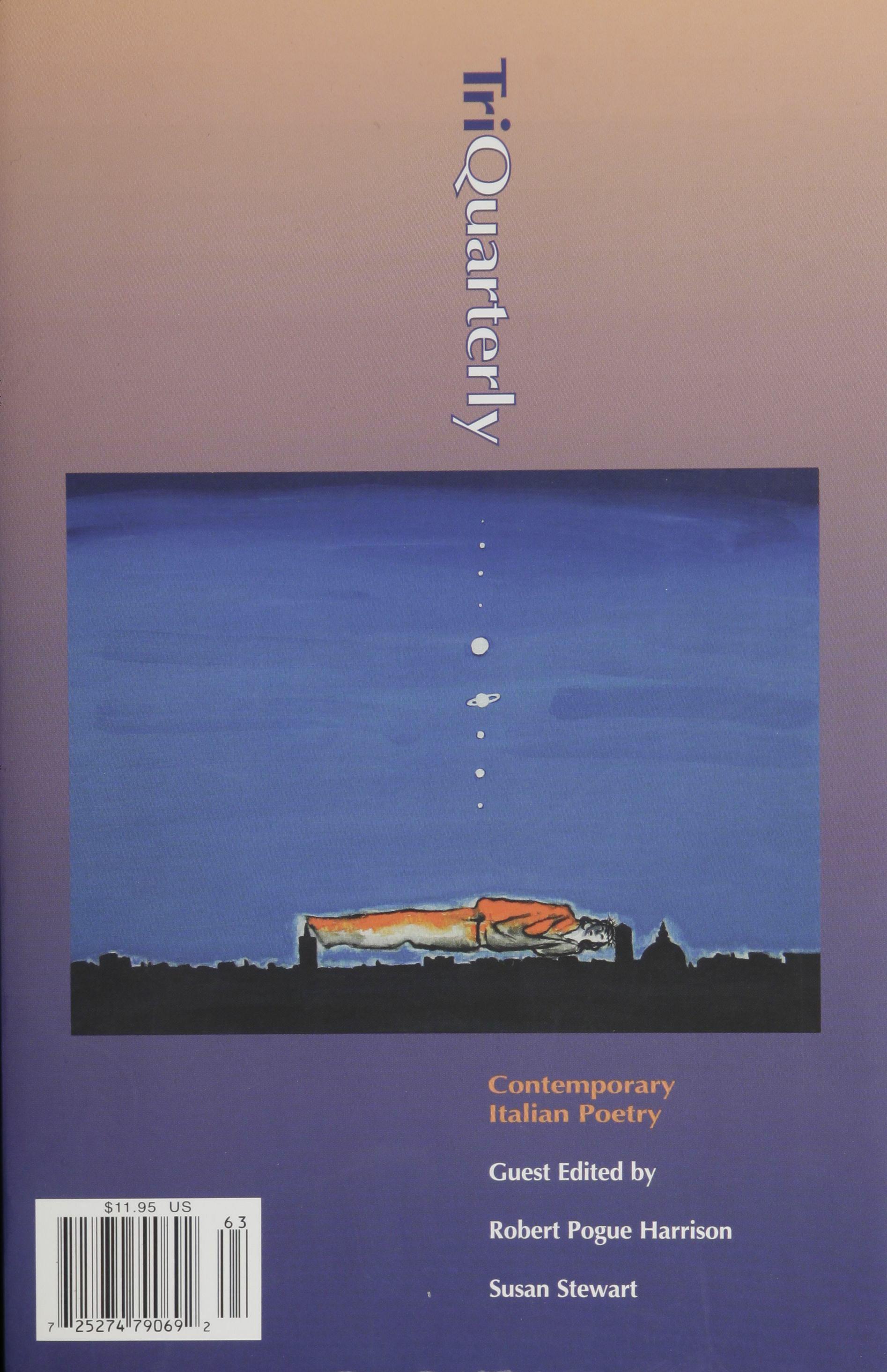


TriQuarterly TriQuarterly is an international journal of writing, art and cultural inquiry published at Northwestern University

TriQuarterly
Editor
Susan Firestone Hahn
Associate Editor
Ian Morris
Operations Coordinator
Kirstie Felland
Cover Design
Gini Kondziolka
Editorial Assistants
Samantha Levine
Mairead Case
Assistant Editor
Joanne Diaz
TriQuarterly Fellow
Brent Mix

Contributing Editors
John Barth
Lydia R. Diamond
Rita Dove
Stuart Dvbek
Richard Ford
Sandra M. Gilbert
Robert Hass
Edward Hirsch
Li-Young Lee
Lorrie Moore
Alicia Ostriker
Carl Phillips
Robert Pinsky
Susan Stewart
Mark Strand
Alan Williamson
127
Subscriptions
Three issues per year. Individuals: one year $24; two years $44; life $600. Institutions: one year $36; two years $68. Overseas: $5 per year additional. Price of back issues varies. Sample copies $5. Address correspondence and subscriptions to TriQuarcerly, Northwestern University, 629 Noyes Sr., Evanston, IL 60208-4210. Phone (847) 491-7614.
Submissions
The editors invite submissions of fiction, poetry and literary essays, which must be postmarked between October I and March 31; manuscripts postmarked between April I and September 30 will not be read. No manuscripts will be returned unless accompanied by a stamped, self-addressed envelope. All manuscripts accepted for publication become the properry of TriQuarterly, unless otherwise indicated.
Reprints
Reprints of issues 1- I7 of TriQuarrerly are available in full format from Kraus Reprint Company, Route 100, Millwood, NY 10546, and all issues in microfilm from University Microfilms International, 300 North Zeeb Road, Ann Arbor, MI 48106.
Indexing
TriQuarrerly is indexed in the Humanities Index (H. W. Wilson Co.), the American Humanities Index (Whitson Publishing Co.), Historical Abstracts, MLA, EBSCO Publishing (Peabody, MA) and Information Access Co. (Foster City, CAl.
Distributors
Our national distributors to retail trade are Ingram Periodicals (La Vergne, TN); B. DeBoer (Nutley, NJ); Ubiquity (Brooklyn, NY); Armadillo (Los Angeles, CAl.
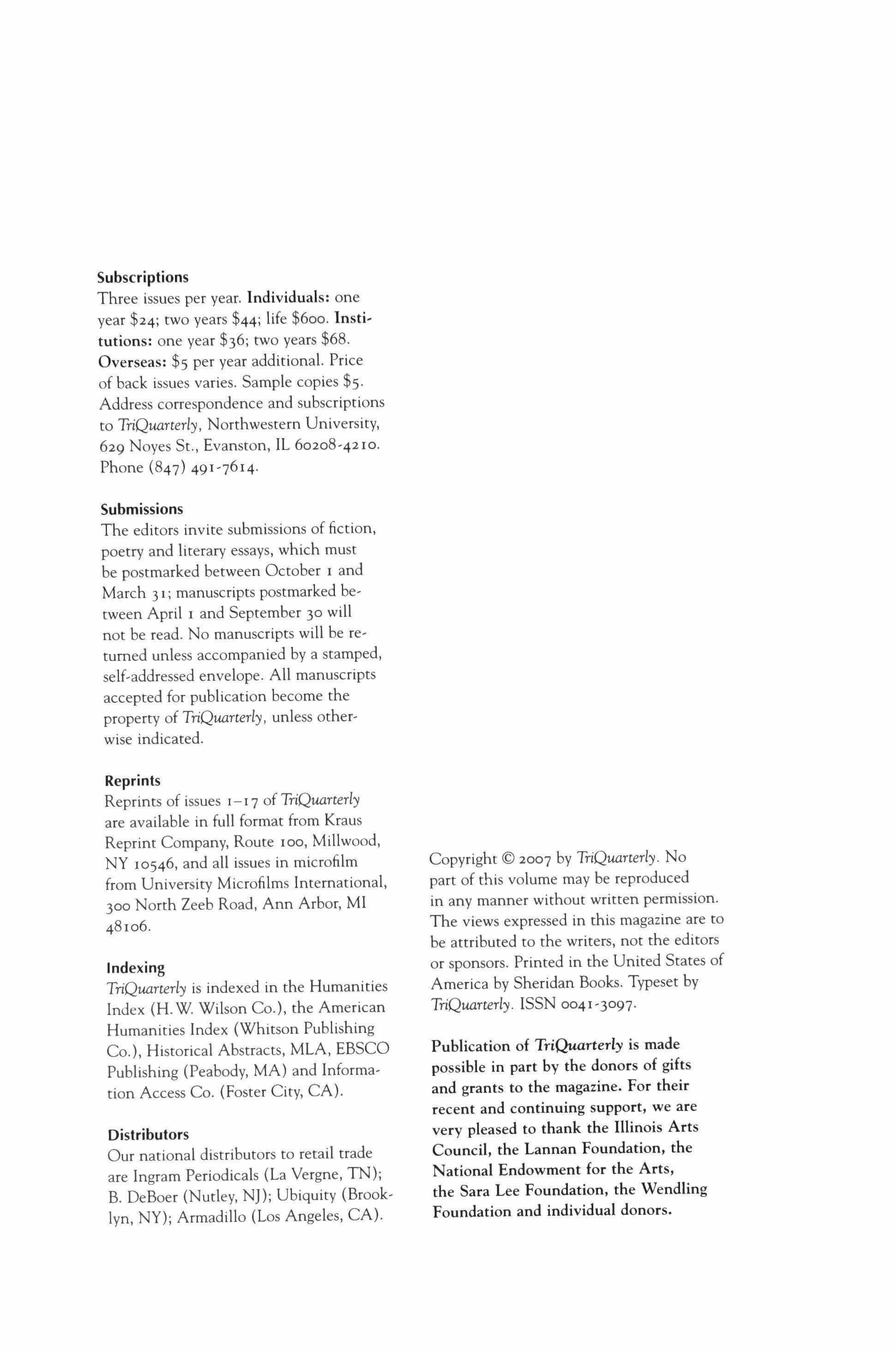
Copyright © 2007 by TriQuarterly. No part of this volume may be reproduced in any manner without written permission. The views expressed in this magazine are to be attributed to the writers, not the editors or sponsors. Printed in the United States of America by Sheridan Books. Typeset by TriQuarrerly. ISSN 0041-3097.
Publication of TriQuarterly is made possible in part by the donors of gifts and grants to the magazine. For their recent and continuing support, we are very pleased to thank the Illinois Arts Council, the Lannan Foundation, the National Endowment for the Arts, the Sara Lee Foundation, the Wendling Foundation and individual donors.
Editors of this issue:
Robert Pogue Harrison and Susan Stewart

I I Introduction
Robert Pogue Harrison and Susan Stewart
18 Nozione Fredda / Cold Notion
20 Ragazze-stelle / Star-girls
22 La Tracina / The Weeverfish
24 11.10.l997/ 10/11/1997
30 M come Merlino / M Like Merlin
Edoardo Albinati
Translated by Brunella Antomarini and Susan Stewart
32 Adorare (le immagini) / To Adore (images)
34 Addormentarsi: / To fall asleep:
36 Nell'autobus. Pensando all'affresco di Andrea Orcagna sulla peste di Firenze del 1300 / On the bus. Thinking of Andrea Orcagna's fresco of the plague in Florence in 1300
38 Coraggio. / Courage.
40 Corpo / Body
42 Figlia (a mia figlia) / Daughter (To My Daughter)
44 Abbandono / Abandonment
46 Due, tre / Two, Three
48 Quello che dell'amore resta / What Remains from Love
50 Arcipelago (un collasso) / Archipelago (A Collapse)
Antonella Anedda
Translated by Gian Maria Annovi and Susan Stewart
52 Coro / Chorus
54 "credo in un dio randagio" / "i believe in a stray god"
58 de contemptu mundi / De Contempu Mundi
Luigi Ballerini
Translated by David Lummus
Contents

60 Cado e ricado, inciampo e cado, mi alzo / I fall and fall again, I stumble and fall, I stand up
62 Andro all'infemo certo andre all'infemo / I'll go to hell, I'm certain I'll go to hell
64 Pigre divinita e pigra sorte / Lazy gods and lazy fortune
66 Questo tempo sabbatico / This sabbatical time
68 Guarda! / Look!
70 L'Eden / Eden
72 Eravamo tutti perdonati. / We were all forgiven. Patrizia Cavalli
Translated by Brunella Antomarini and Susan Stewart
74 From Tema dell'addio / From Theme of Farewell
Milo De Angelis
Translated by Patrizio Ceccagnoli and Susan Stewart
84 Dentro l'acqua s'agitava un cumulo d'erica / A bunch of heather was tossing about in the water
86 Ci incontrammo nella calma / We met in the calm
88 Tutte le volte che tomi / Each time you come back
90 Del rito sacrale m'incanta que1 tempo / I am enchanted by that moment of the holy rite
Alba Donati
Translated by Robert Pogue Harrison and David Lummus
92 Su quell'unico, perduto / Over that unique, lost
94 Come scende la sera qui / How does night fall here
96 Zavorra / Ballast
98 Relitto / Wreckage
100 Fuori dalla citra morta / Outside the dead city / Sono io che non ti cerco / I'm the one who doesn't look for you
Fabrizio Falconi
Translated by David Lummus
104 Poemetto facile degli alberghi / Easy Poem about Hotels
Roberto Gigliucci
Translated by Chris King and Leonard Barkan

118 Xenion di Ophelia / Ophelia's Xenion
120 Le Grazie / The Three Graces
122 Leda col cigno (Sopra una sculturina dell'Ammannati che si trouva al Bargello) / Leda and the Swan (On a little sculpture by Ammanti that standeth in the Bargello Museum)
Rosaria Lo Russo
Translated by Gian Maria Annovi and Susan Stewart
126 Che la materia provochi il contagio / That matter provokes contagion
128 L'abbraccio / The Embrace
130 Ero sulletto di un ambulatorio / I was on a hospital bed
132 Annunci immobiliari / Real Estate Announcements
134 Fotografia / Photograph
136 D'improvviso ho visto un colibrl, anzi / All of a sudden I saw a hummingbird, or rather
138 "Guarda questa bambina" / "Look at this girl"
140 Guardando le colonne di profughi da casa mia / Watching the Columns of Refugees from My House
142 La famiglia del poeta / The Poet's Family
Dormo accanto a mio figlio. / I sleep next to my son.
Valerio Magrelli
Translated by David Lummus
146 Deserto / Desert
148 Maschere / Masks
150 Meno che l'infinito / Less Than the Infinite
152 Precetto del profeta / The Prophet's Precept
Lucio Mariani
Translated by David Lummus
154 Ii pastrano / The Overcoat
156 Ii grembiule / The Apron
IS8 Guerra / War
160 Nella terra di Scozia / In the land of Scotland
Aida Merini
Translated by Susan Stewart and Brunella Antomarini

162 Di quello che ho nel cuore / Of what is in my heart
164 Stanze per la musica di Adriano Guarnieri / Stanzas for the Music of Adriano Guarnieri
166 Cost a volte succede che nel buio / So at times it happens that in the dark
168 L'autunno ha a volte luci cosi terse / At times autumn can have lights so terse
Giovanni Raboni
Translated by Robert Pogue Harrison and David Lummus
170 Notturno da San Pietroburgo (Avrebbe arnato chiunque) / Nocturne from Saint Petersburg (He wouldhave lovedanybody)
176 Settembre (Avrebbe amato chiunque) / September (He wouldhave lovedanybody)
178 In biblioteca (II bardel tempo) / In the Library (The bar oftime)
Davide Rondoni
Translated by Gregory Pell
182 From Cose / From Things
Edoardo Sanguineti
Translated by Patrizio Ceccagnoli and Susan Stewart
196 Ho veduto due mosche un certo giorno: / I saw two flies on a certain day
198 Cadeva il giorno e cadeva l'amato / The day was falling and my lover
200 Ti voglio far provare il bel piacere. / I want to give you that gorgeous feeling.
202 In nome di Dio, aiutami! Che tanto / For God's sake, help me! That so much
Patrizia Valduga
Translated by David Lummus, Susan Stewart, and Robert Pogue Harrison
204 Testavuota / Empty Head
206 Predica agli animali / Sermon to the Animals
208 Progresso regresso / Progress/Regress
210 Postnovecento / After the Twentieth Century
2 12 Il de-centro / The Decentered
Paolo Valesio
Translated by Patrizio Ceccagnoli and Susan Stewart
214 LIGONAs / LIGONAs
Andrea Zanzotlo
Translated by David Lummus
227 Sette Poeti per Rainer Maria Rilke / Seven Poets on Rainer Maria Rilke
Edited by Roberto Dossi
Translated by Robert Pogue Harrison and David Lummus
228 2 Novembre / November 2nd
Paolo Frigerio
230 Angelo / Angel
Giulio Marzaioli
232 Oracolo di fortezza / Oracle of Strength
Nicola Dal Falco
234 Una voce di ritomo per Rilke / A Voice of Return for Rilke
Massimo Scrigneli
236 Forte morte / Force of Death
Fabrizio Falconi
238 Principio di Vita / Principle of Life
Nina Maroccolo
240 Cristallo / Crystal
Maria Castronovo
242 Contributors

Cover and panel on page 227:
Untitled paintings by Enzo Cucchi, 2006

Introduction

If, like the editors of this volume, you are an American professor of literature with reading knowledge of Italian, and if you have any contact at all with Italy's intelligentsia, it is impossible to spend a few weeks in Italy without accumulating an assorted stack of poetry books, either donated to you directly by their authors, or through the intermediary of a friend. It seems as if every third person in this nation writes, and every fourth person publishes, poetry. Professors, housewives, politicians, journalists, shopkeepers, tavern keepers, schoolteachers, fishermen, accountants, clergymen, actresses, seamstresses, cooks, even prostitutes and gigolos-the vast flock of contemporary Italian poets is made up variously from these ranks, and from many others besides. Why this profusion? Why this widespread, irrepressible need to write poetry? From what national, cultural or socio-existential sources does that need derive? These are questions to which there are no obvious answers, and we are not about to attempt to provide one here. Let it merely be stated as a matter of record that, from the Dolomites to the Straits of Messina, the Italian peninsula today is abuzz with song.
Not that you can hear its resonance in the public squares or even major bookstores of Italy. The poetry scene in Italy these days is paradoxical, to say the least. This is a country that offers a record number of literary prizes sponsored by financial institutions, academies, cultural associations, provincial and regional municipalities, publishing houses-many of them awarded to poeti dilettanti-yet only a tiny minority of contemporary Italian poetry books ever finds its way into the big bookstores. The rest circulate for the most part privately. Their printing is often subsided either entirely or partially at the authors' ex� pense. The big distributors that now run Italy's main bookstores believe (rightly or wrongly, but no doubt rightly) that poetry does not sell, hence they refuse to stock their shelves with contemporary poets. When they do, it's usually one or two copies, which, if they go unsold, they return to the publisher after a few months. In the "Poetry" section of Italian bookstores one typically finds only the international classics, as well as a few canonized modem Italian poets-Montale, Ungaretti and Quasimodo-and perhaps a few other twentieth-century figures I I
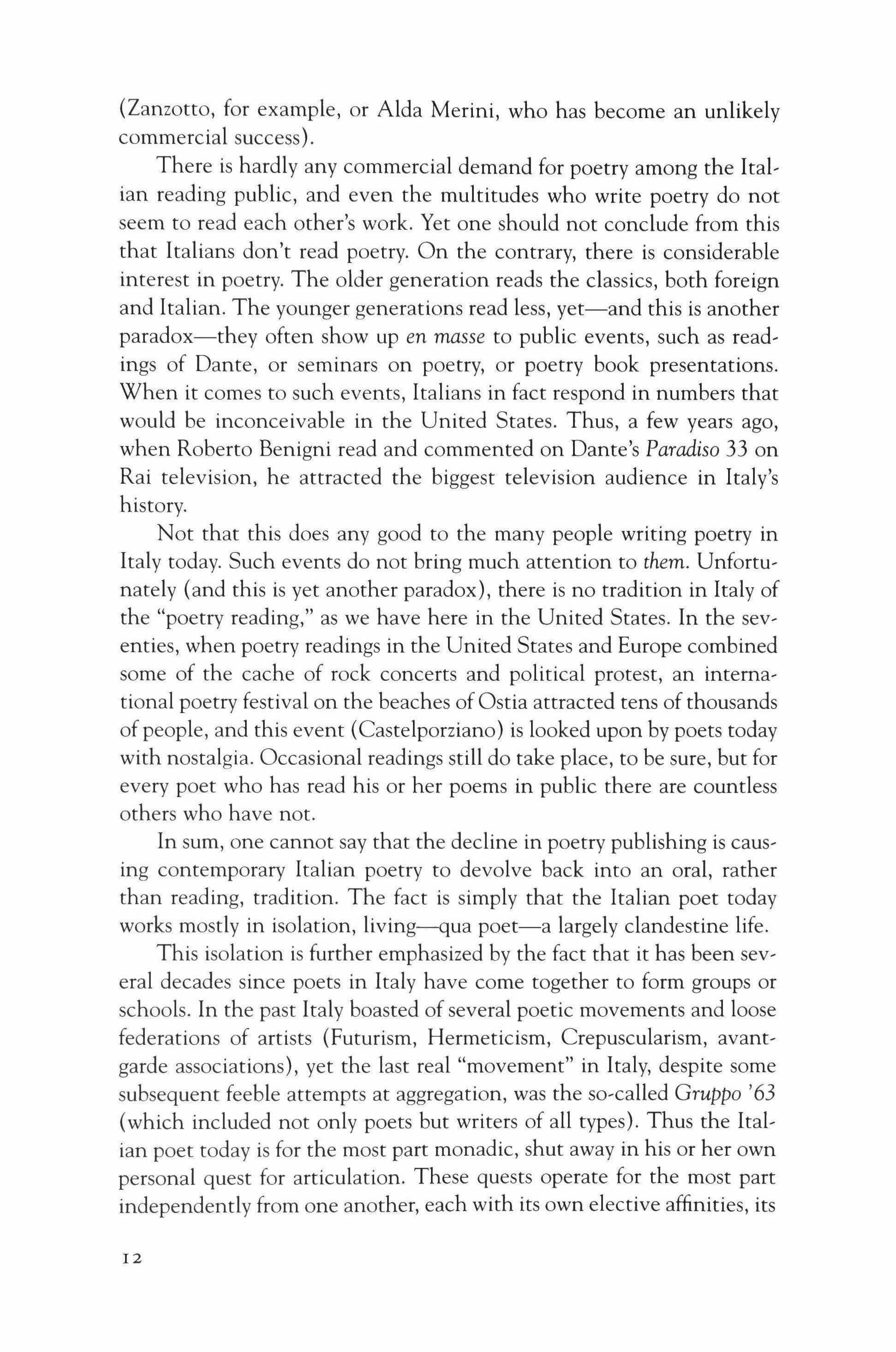
(Zanzotto, for example, or AIda Merini, who has become an unlikely commercial success).
There is hardly any commercial demand for poetry among the italian reading public, and even the multitudes who write poetry do not seem to read each other's work. Yet one should not conclude from this that Italians don't read poetry. On the contrary, there is considerable interest in poetry. The older generation reads the classics, both foreign and Italian. The younger generations read less, yet-and this is another paradox-they often show up en masse to public events, such as readings of Dante, or seminars on poetry, or poetry book presentations. When it comes to such events, Italians in fact respond in numbers that would be inconceivable in the United States. Thus, a few years ago, when Roberto Benigni read and commented on Dante's Paradiso 33 on Rai television, he attracted the biggest television audience in Italy's history.
Not that this does any good to the many people writing poetry in Italy today. Such events do not bring much attention to them. Unfortunately (and this is yet another paradox), there is no tradition in Italy of the "poetry reading," as we have here in the United States. In the seventies, when poetry readings in the United States and Europe combined some of the cache of rock concerts and political protest, an international poetry festival on the beaches of Ostia attracted tens of thousands of people, and this event (Castelporziano) is looked upon by poets today with nostalgia. Occasional readings still do take place, to be sure, but for every poet who has read his or her poems in public there are countless others who have not.
In sum, one cannot say that the decline in poetry publishing is causing contemporary Italian poetry to devolve back into an oral, rather than reading, tradition. The fact is simply that the Italian poet today works mostly in isolation, living-qua poet-a largely clandestine life.
This isolation is further emphasized by the fact that it has been several decades since poets in Italy have come together to form groups or schools. In the past Italy boasted of several poetic movements and loose federations of artists (Futurism, Hermeticism, Crepuscularism, avantgarde associations), yet the last real "movement" in Italy, despite some subsequent feeble attempts at aggregation, was the so-called Gruppo '63 (which included not only poets but writers of all types). Thus the italian poet today is for the most part monadic, shut away in his or her own personal quest for articulation. These quests operate for the most part independently from one another, each with its own elective affinities, its
12

own sensibility, and its own idiom. If there are lines of convergence, they are largely unintentional.
All this to say that the purpose of this anthology is not to provide a panorama of Italian poetry today, nor to offer a representative selection of various styles and trends-these would be impossible ambitions-but merely to gather together a finite number of voices and allow them to speak for themselves. The criteria for our selection are not exactly arbitrary, but neither are they completely rigorous or consistent. We have had a large body of work from which we might choose, but few native principles for choosing. To say that our selection represents among the most interesting voices in Italian poetry today would be at once true and misleading-true because the poets included here are indeed interesting and powerful voices; misleading because there are so many other worthy poets we could have also included, had we but world enough, and time.
As for our editorial procedure, each poem has been translated and edited by at least one native speaker and one poet, and often by the authors themselves. We've decided to let the poems stand alone, without notes or explanations for the most part, but we have tried to find ways of making poems in English that follow the spirit, mood, and agenda of each Italian original. Above all, we have tried to remain sensitive to what one might call the discrete quest for "high style" among most of these poets-a high style that seeks to avoid affectation while repudiating the colloquial.
Indeed, we suspect that, if there is a common bond among this great proliferation of poets in Italy, it is perhaps a deeply rooted commitment to poetry's "other language"-the "aulic," "cardinal," and "curial" volgare illu5tre, as Dante called it. There are some seventy million speakers of Italian in the world, and this "other language" within the Italian language is under fierce assault, even threatened with disappearance, by the public dominance of journalism and media. There seems to be a need among Italian writers of poetry, a need to speak otherwise than in the idiom of the day. Americans don't suffer from this syndrome; on the contrary, most American poets aspire to render their poems as colloquial and demotic and unillustrious as possible. Whereas American poetry has now evolved into a strange amalgam of stand-up comedy (mostly male) and sad public confession (mostly female), these Italian poets, men and women alike, express, in private voices, deeply spiritual and even erotic attachments to the most dignified, historically transmitted forms of their language. Poetry is a way of rescuing not only another relationship to
13

that language, but also a relationship to the world. In writing poetry, the various poets create small linguistic counter-worlds-for they do not want to inhabit only one world, especially one they feel has sunk into the depths of vulgarity, materialism, and a wide-spread desacralization. Writing poetry is a way of going underground, into the catacombs, so to speak, to practice a persecuted religion. Hence, though they may be starved for attention, they don't write for attention.
The evidence of these counter-worlds runs throughout the poems included here. We find the same places and objects of ordinary experience-the bus, the beach, the bar, the cathedral and piazza, the terracotta pot with its ubiquitous geranium, the terrace and garden, the asphalt-covered streets, and the names of streets themselves-be they in Milano, Firenze, Bologna or Rome. At the same time the rituals and liturgies of this common everyday life, whether in the north or south, conducted under the same Italian sun, are saturated with individual meaning. Themes of forgiveness, longing, desire, and reverie, the palpable reality of an intimate interlocutor, or the plaintive fact of elegy's absence are spoken in individual voices, directly to a listener. One striking love poem follows another. Yet overall there is little description, few uninhabited landscapes, practically no exoticism, and hardly any dialogue here. Refusing anti-intellectualism, these poets turn to allusion and archaism as casually as they can stop by an ancient fountain or tower on the way home from work, or take a detour to see a triptych on a cathedral wall as they head for the market. They wear their learning lightlyperhaps because there is so much from which to choose. Despite, or perhaps because of, the irony and playfulness that suffuses much of their writing, they take their vocation, or avocation, seriously; and each of them works beyond the single or occasional poem to a consideration of a life's work and the work of a life.
That contemporary Italian poetry is at once very much alive, yet at the same time extremely disaggregated, makes it nevertheless extremely difficult to generalize about its trends. Even its major living poets-Zanzotto and Sanguineti, for example {or Mario Luzi and Giovanni Raboni, each of whom died only a few years ago)-follow their own original and ultimately inimitable, often anachronistic, itineraries. Born in 1921, Zanzotto is the oldest poet here and is still experimenting with new forms; Sanguineti, born in 1930, includes a poem on the Internet; the seven poets who have written tributes to Rilke are the youngest. It is true that Ungaretti and Montale (and to a much lesser degree Quasimodo and Pasolini) remain pervasive influences on many of the poets

writing today. The prosodic legacy of Ungaretti's hermetic poetry-its splintered, grammatically reduced, yet intensely lyrical verse-is especially strong. Montale's influence is more subtle. It is above all his "echo" that one hears in those writing today. He remains more of a monument to be studied and reread rather than a model of imitation or legacy to be appropriated. Yet the general importance of these predecessors for Italian poets today makes generalizations about them no less vi, able, if for no other reason than that a host of other heterogeneous non,Italian influences are at work as well.
The younger poets, those in their twenties and thirties, are strongly drawn to the demotic lyricism of Neruda and Tagore, who remain among the highest selling poets in Italy these days. Meanwhile the older ones are drawn strongly to Central European figures like Rilke, Trakl and Gottfried Benn, as well as French giants like Baudelaire, Rimbaud, and Valery. Rilke especially is widely revered in Italy, hence our decision to close our collection with this recent tribute. Many Italians writing today see him as the quintessential modern poet of the twentieth century-the poet, that is, who most faced most squarely the spiritual crisis of that century, namely the falling away or disintegration of presence. They see in Rilke's poetics of impalpability a miraculous lyrical response to the fugitiveness of the near, the everyday, the ordinary in its old, world authenticity and dignity. Rilke's importance for them derives from the way his intense lyricism of the everyday preserves an opening onto the transcendent and invisible. Rilke's quest to rescue the sacred from its profanation in a world abandoned by God no doubt appeals to the in' tense Christian nostalgias that undeniably lurk at the heart of so much of modern and contemporary Italian poetry.
Yet however widespread the influence of the aforementioned ltalian and non, Italian poets may be, one cannot say that it brings con, temporary Italian poets into the fold of a single family. In truth the last thirty years have seen a staggering differentiation and multiplication of stylistic registers, linguistic codes, spheres of influence, thematic pro' jections, and formal experimentations. Until the seventies, Italian poetry was pretty well divided between the avant-gardists and the traditionalists. This is no longer the case. Nowadays there is a veritable emporium, a vast and dissonant assembly, of single, self,referential voices. Some of the best Italian critics of contemporary Italian poetry-Andrea Cortellessa, for example-see in this chaotic explosion not a degeneration but rather an extraordinary unleashing of poetic vitality, a vitality unlike anything known in Italy for the past several
15
decades. That this vitality is deprived of public resonance it deserves is no doubt tragic. In the final analysis Italian poets today, with a few notable exceptions, seem like a chorus of voices each one of which is speaking mostly to itself, at least for now. This anthology brings their voices to a new English-speaking audience, and perhaps-or so we hope-into a new relation with each other.
Robert Pogue Harrison and Susan Stewart
May 2007
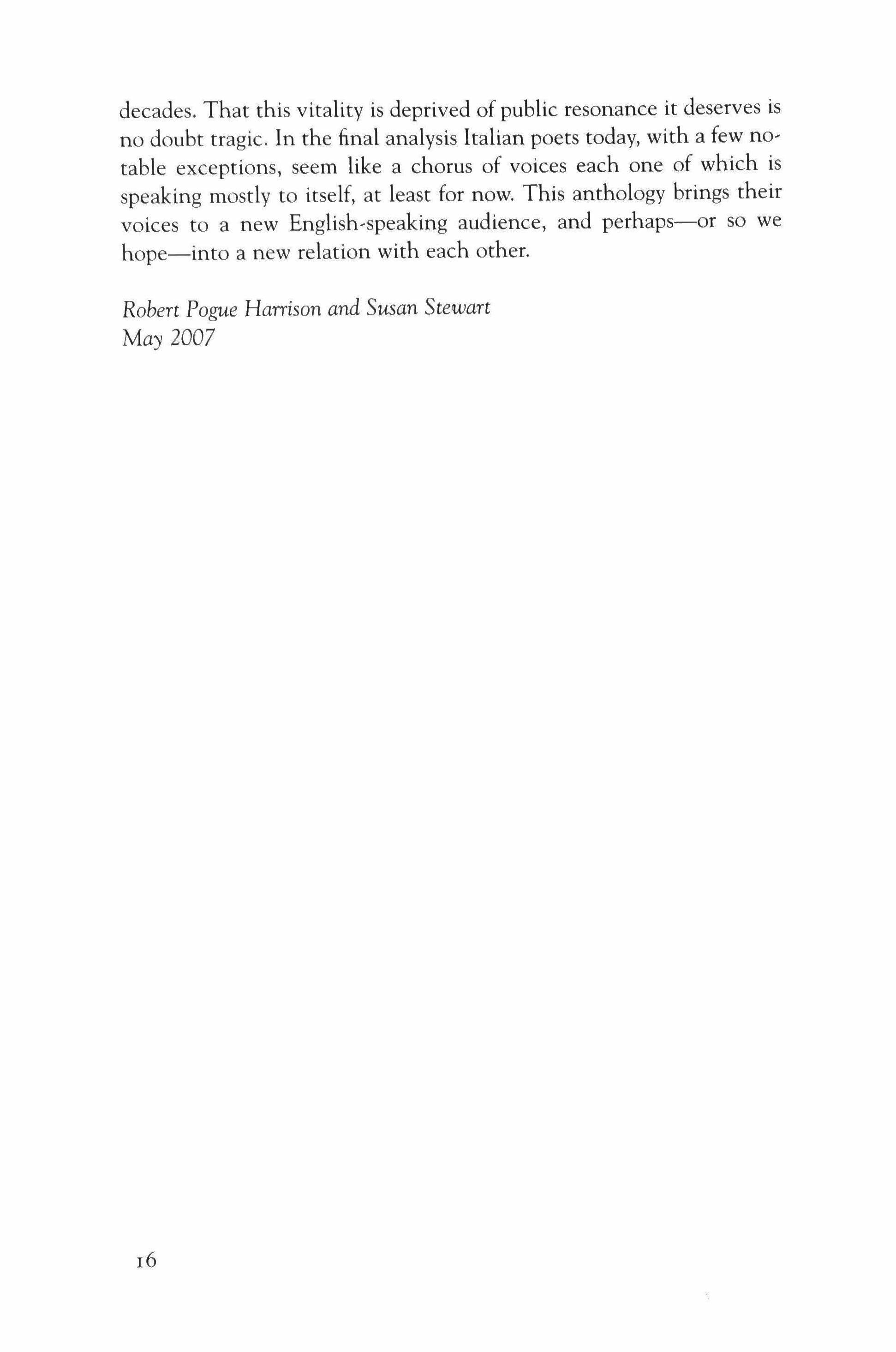
16

TriQuarterly
Edoardo Albinati
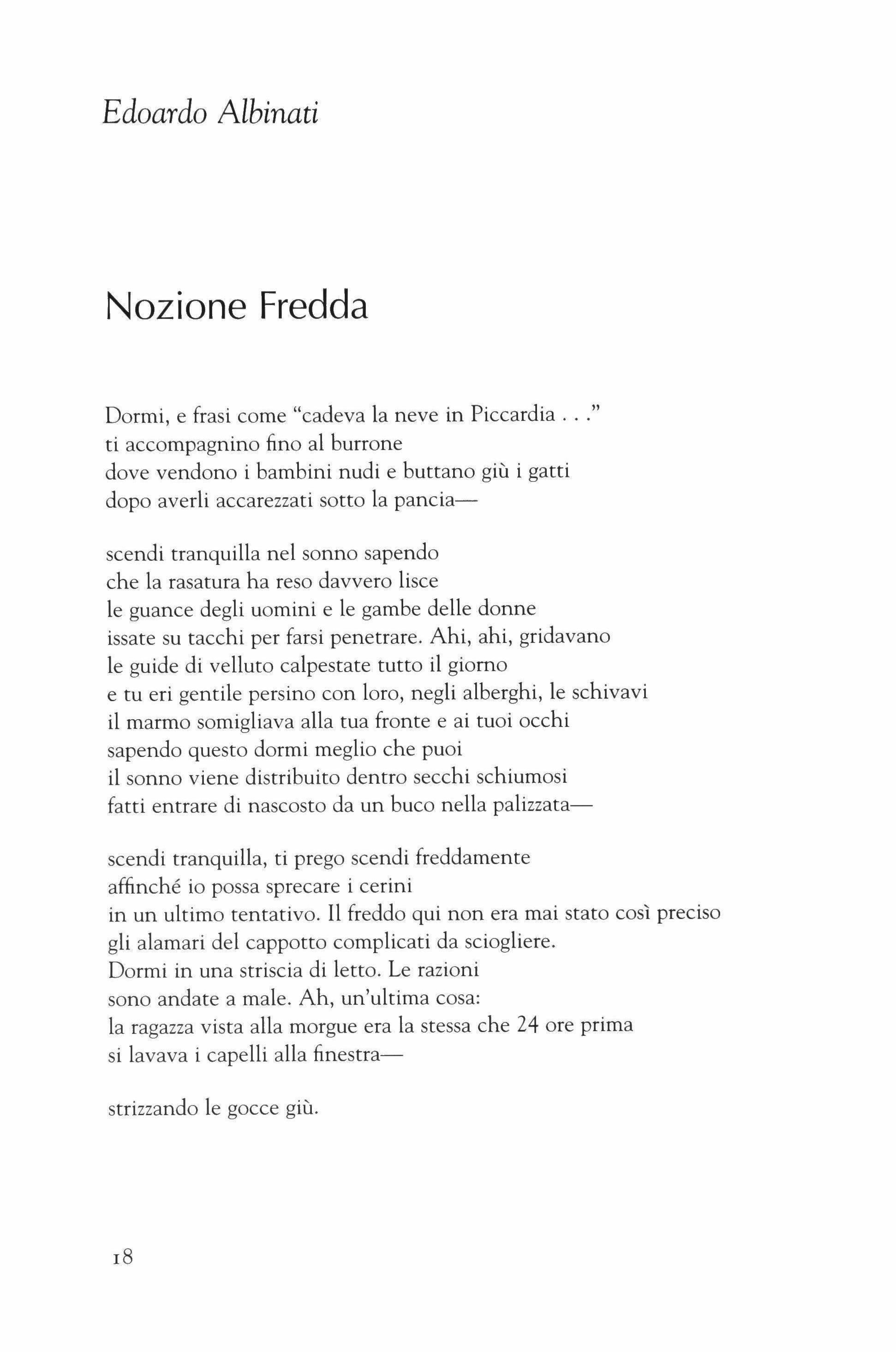
Nozione Fredda
Dormi, e frasi come "cadeva la neve in Piccardia ti accompagnino fino al burrone dove vendono i bambini nudi e buttano giu i gatti dopo averli accarezzati sotto la pancia-
scendi tranquilla nel sonno sapendo che la rasatura ha reso davvero lisce le guance degli uomini e le gambe delle donne issate su tacchi per Farsi penetrare. Ahi, ahi, gridavano le guide di velluto calpestate tutto il giomo e tu eri gentile persino con loro, negli alberghi, le schivavi il marmo somigliava alIa tua fronte e ai tuoi occhi
sapendo questa dormi meglio che puoi il sonno viene distribuito dentro secchi schiumosi fatti entrare di nascosto da un buco nella palizzata-
scendi tranquilla, ti prego scendi freddamente affinche io possa sprecare i cerini in un ultimo tentativo. II freddo qui non era mai stato COSl preciso gli alamari del cappotto complicati da sciogliere. Dormi in una striscia di letto. Le razioni sono andate a male. Ah, un'ultima cosa: la ragazza vista alIa morgue era la stessa che 24 ore prima si lavava i capelli alla finestra-
strizzando le gocce giu.
Translated by Brunella Antomarini and Susan Stewart

Cold Notion
Sleep on and let sentences like "the snow was falling in Picardie take you to the ravine where they sell naked children and throw out the cats once they've stroked their belliesgo gently down into sleep knowing that shaving truly has made men's cheeks soft and women's legs hoisted on their high heels ready for sex. Ouch, ouch cried out the velvet welcome mat crushed underfoot all day long but you were so gentle even with them skipping over them, in hotels that marble assumed your forehead and eyes keeping this in mind, sleep as well as you can sleep is distributed into foaming buckets secretly introduced from a hole in the fence-
go down gently, I beg you, go down coldly so that I can waste matches in my last attempt. The cold has never been more precise the looped button of your coat more difficult to undo. Sleep in a strip of bed. The rations have gone rotten. Ah, one last thing: the girl at the morgue was the same one who, 24 hours earlier, washed her hair at the windowwringing down the drops.
Ragazze-stelle

Ci sono ragazze splendenti come stelle che quando t'avvicini si staccano i raggi di dosso, uno a uno, li ripiegano e se Ii mettono in tasca. Tu sei una di quelle? Leggi in autobus il Quartetto d'Alessandria abbracciata alla sbarra verticale, provi a sottolinearlo con la matita, una ciocca di capelli ti sfugge da dietro l'orecchio e Ie righe non vengono dritte l'autobus arriva troppo presto a destinazione i concetti restano a meta, sono freddolose le frasi di lode alIa luna che tramonta ma tu non sei gelosa delle cose pallide le cose bianche che fanno sognare.
20
Star-girls

There are girls who sparkle like stars and when you go near them they remove the rays from their bodies, one by one, they fold them up and put them in their pockets. Are you one of them? You read The Alexandria Quartet in the bus hugging the pole, you try to underline your book with your pencil, a lock of your hair escapes from behind your ear and you draw crooked lines the bus comes into the stop too early concepts are left half-way, sentences devoted to the setting moon feel the cold but you are not jealous of pale things those white things that make you dream.
21
La Tracina

Amo i tuoi piedi, amo le tue ginocchia, amo contare i giorni che mancano prima che tu vada via rna l'esame sul Re Pescatore per fortuna e ancora lontano dalla linea bionda sopra il costume, l'elastico torna al suo posto e il primo dolore passa come un'olimpiade perduta. Non ci importava. Abbiamo acceso la TV solo la notte prima di lasciarci. Il libeccio scuoteva i cartelloni pubblicitari.
Chiesi che una pesca venisse tagliata in modo da farla sembrare l'ultima, che nell'abbracciarsi fosse mantenuta una distanza come dentro un quadro mentre viene dipinto il pittore si avvicina e si allontana a guardare.
Tu mi hai risposto quando eri gia perduta
a causa dell'accelerazione, allora ho messo la testa sotto il getto di una fontana, mi ha mozzato il fiato era 11 per quello, per dissetare nelle vene sottili come fogli una fredda contromisura da prendere. Il bambino a cui avevi tenuto e lasciato la mana distratto nelle onde non send in cosa sbagliava e gli strilli che seguirono la puntura fanno parte della sua storia. La poesia potrebbe anche dirsi finita quando avrai un secondo figlio 0 figlia e cambierai modello di costume, la poesia potrebbe essere questa scherzo che finisce tra i baci, mentre giocate a carte e le figure dei re laconici fanno la fila al patibolo le mie telefonate spezzeranno la sera andandosi a posare accanto ate, senza dire pili niente.
22
The Weeverfish

I love your feet, I love your knees, I love to count the days ahead before you go away but luckily the exam about the Fisher King is still far in the future far from this downy blond line that meets your swimsuit, the elastic band snaps back into place and the first pain passes like a lost Olympics. We didn't care. We turned the TV on only the night before we were through. The southwest wind shook the billboards. I asked that a peach be cut as if it were the last, that a distance be kept while we were parting as it is in a painting held close and then at arm's length. You answered when you were already gone because of the acceleration, I put my head beneath a fountain, it took my breath away this is what fountains are for, to quench the thirst inside veins as subtle as sheets to provide a cold countermeasure. The child whose hand you were holding and letting go was spellbound by the waves and didn't sense the danger and the shrieks that followed the doctor's shot are part of his story. Poetry could be said to be over when you have your second child, and change your style of clothes, poetry might be a joke ending in kisses, while you play cards and the figures of laconic kings stand in line at the gallows my phone calls will break up the evening and will perch beside you, without a word.
23
11.10.1997
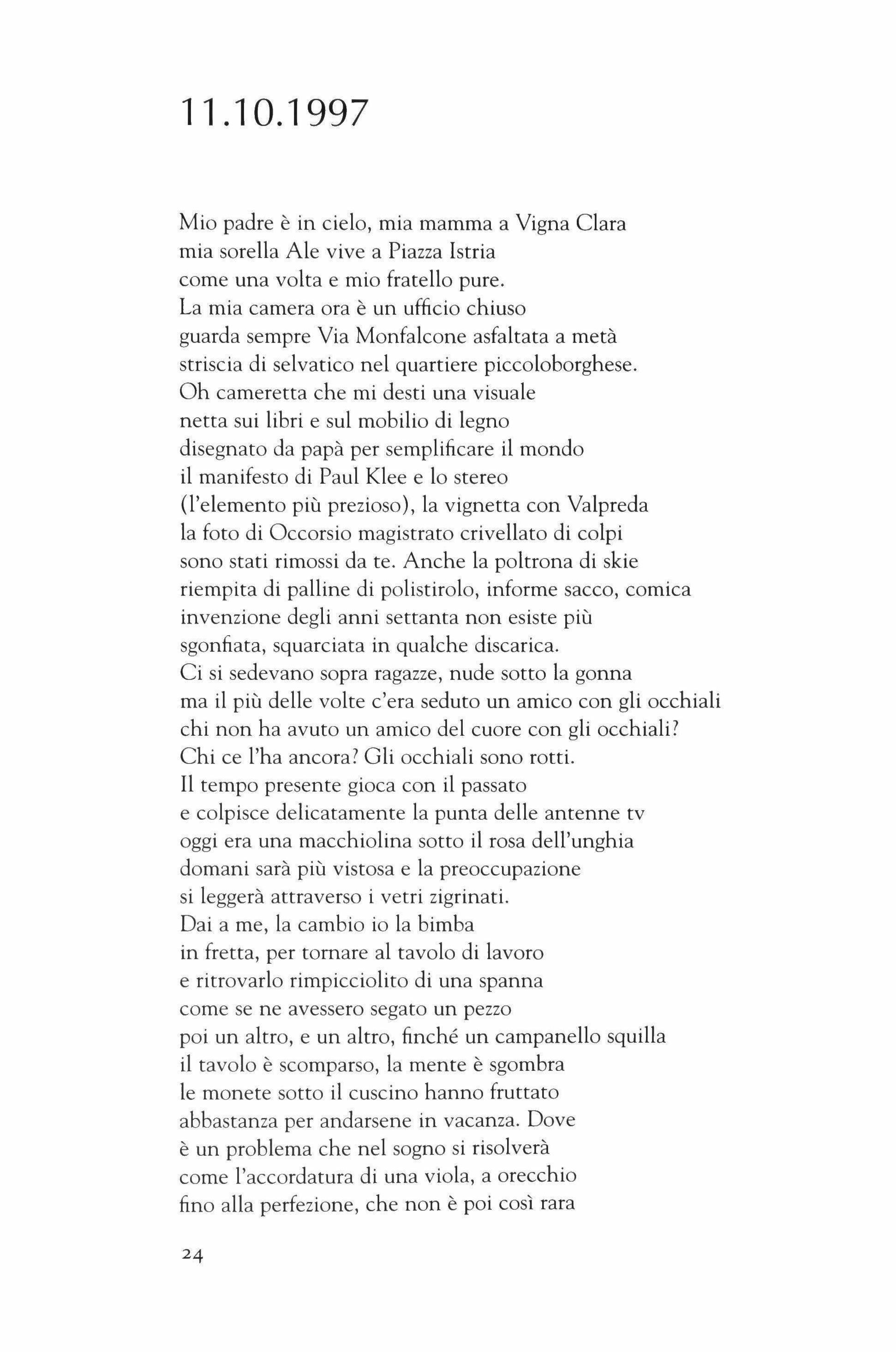
Mio padre e in cielo, mia mamma a Vigna Clara mia sorella Ale vive a Piazza Istria
come una volta e mio fratello pure. La mia camera ora e un ufficio chiuso guarda sempre Via Monfalcone asfaltata a meta striscia di selvatico nel quartiere piccoloborghese.
Oh cameretta che mi desti una visuale netta sui libri e sul mobilio di legno disegnato da papa per sernplificare il mondo il manifesto di Paul Klee e 10 stereo (l'elemento pili prezioso), la vignetta con Valpreda la foto di Occorsio magistrato crivellato di colpi sono stati rimossi da teo Anche la poltrona di skie riempita di palline di polistirolo, informe sacco, comica invenzione degli anni settanta non esiste pili sgonfiata, squarciata in qualche discarica.
Ci si sedevano sopra ragazze, nude sotto la gonna ma il pili delle volte c'era seduto un amico con gli occhiali chi non ha avuto un amico del cuore con gli occhiali?
Chi ce l'ha ancora? Gli occhiali sono rotti. Il tempo presente gioca con il passato e colpisce delicatamente la punta delle antenne tv oggi era una macchiolina sotto il rosa dell'unghia domani sara pili vistosa e la preoccupazione si leggera attraverso i vetri zigrinati. Dai a me, la cambio io la bimba in fretta, per tornare al tavolo di lavoro e ritrovarlo rimpicciolito di una spanna come se ne avessero segato un pezzo poi un altro, e un altro, finche un campanella squilla il tavolo e scomparso, la mente e sgombra le monete sotto il cuscino hanno fruttato abbastanza per andarsene in vacanza. Dove e un problema che nel sogno si risolvera come l'accordatura di una viola, a orecchio fino alla perfezione, che non e poi COSt rara
10/11/1997
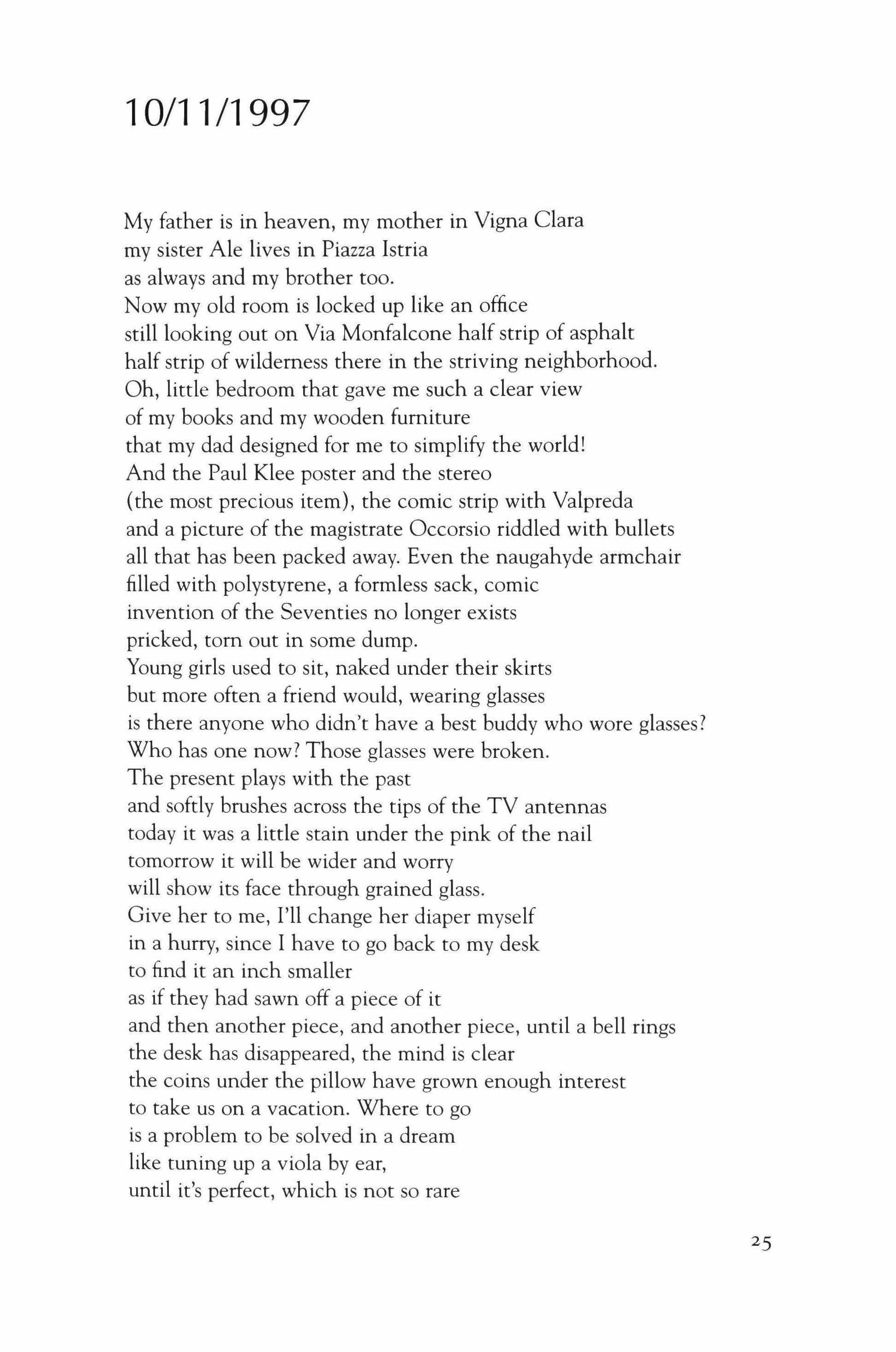
My father is in heaven, my mother in Vigna Clara my sister Ale lives in Piazza Istria as always and my brother too.
Now my old room is locked up like an office still looking out on Via Monfalcone half strip of asphalt half strip of wilderness there in the striving neighborhood. Oh, little bedroom that gave me such a clear view of my books and my wooden furniture that my dad designed for me to simplify the world! And the Paul Klee poster and the stereo (the most precious item), the comic strip with Valpreda and a picture of the magistrate Occorsio riddled with bullets all that has been packed away. Even the naugahyde armchair filled with polystyrene, a formless sack, comic invention of the Seventies no longer exists pricked, tom out in some dump.
Young girls used to sit, naked under their skirts but more often a friend would, wearing glasses is there anyone who didn't have a best buddy who wore glasses? Who has one now? Those glasses were broken. The present plays with the past and softly brushes across the tips of the TV antennas today it was a little stain under the pink of the nail tomorrow it will be wider and worry will show its face through grained glass. Give her to me, I'll change her diaper myself in a hurry, since I have to go back to my desk to find it an inch smaller as if they had sawn off a piece of it and then another piece, and another piece, until a bell rings the desk has disappeared, the mind is clear the coins under the pillow have grown enough interest to take us on a vacation. Where to go is a problem to be solved in a dream like tuning up a viola by ear, until it's perfect, which is not so rare
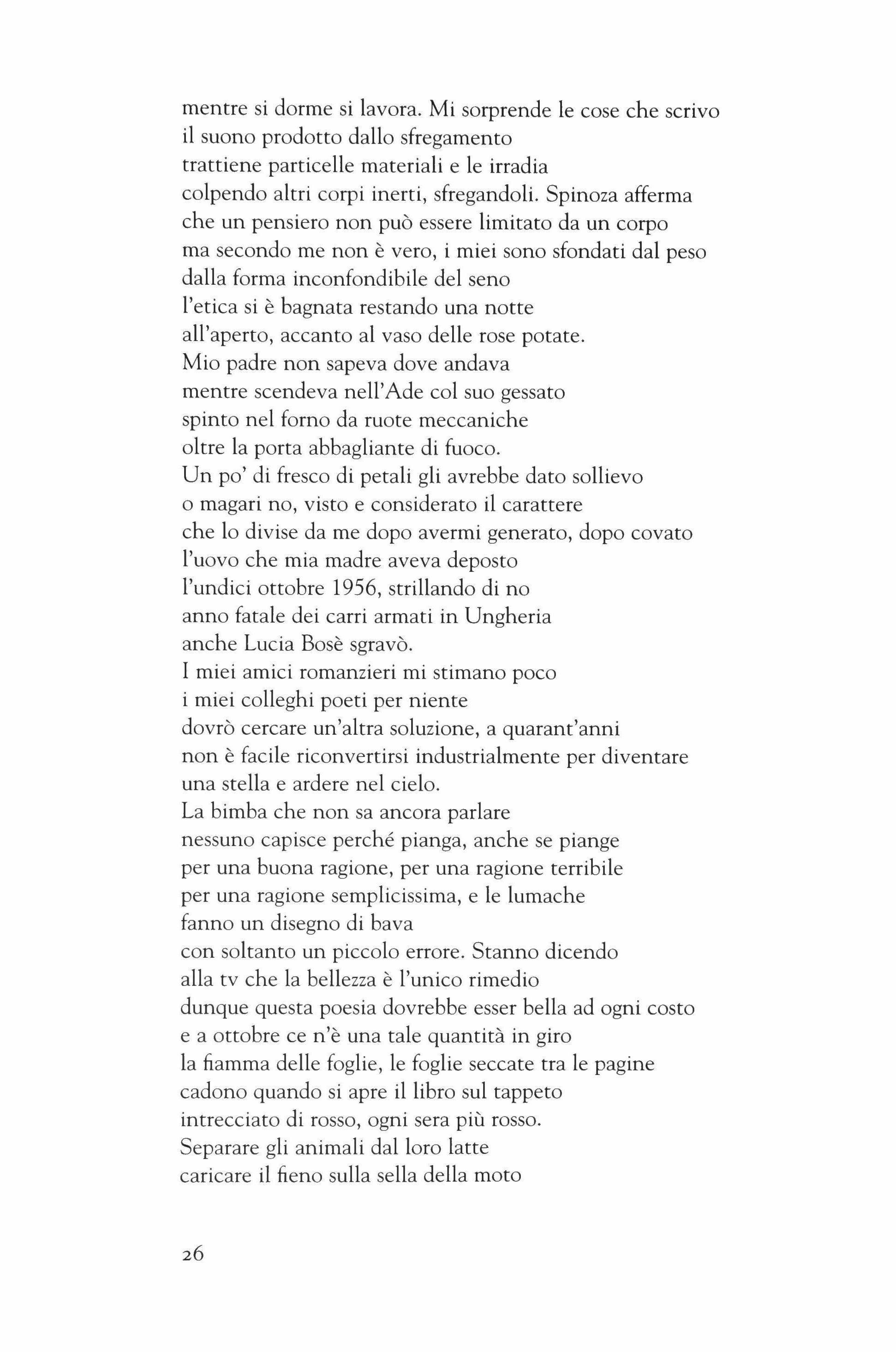
mentre si dorme si lavora. Mi sorprende le cose che scrivo il suono prodotto dallo sfregamento trattiene particelle materiali e le irradia colpendo altri corpi inerti, sfregandoli. Spinoza afferma che un pensiero non puo essere limitato da un corpo rna secondo me non e vero, i miei sono sfondati dal peso dalla forma inconfondibile del seno l'etica si e bagnata restando una notte all'aperto, accanto al vasa delle rose potate.
Mio padre non sapeva dove andava mentre scendeva nell'Ade col suo gessato spinto nel forno da ruote meccaniche oltre la porta abbagliante di fuoco.
Un po' di fresco di petali gli avrebbe dato sollievo o magari no, visto e considerato il carattere che 10 divise da me dopo avermi generato, dopo covato l'uovo che mia madre aveva deposto l'undici ottobre 1956, strillando di no anna fatale dei carri armati in Ungheria anche Lueia Bose sgravo.
I miei amici romanzieri mi stimano poco i miei colleghi poeti per niente dovro cercare un'altra soluzione, a quarant'anni non e facile riconvertirsi industrialmente per diventare una stella e ardere nel eielo.
La bimba che non sa ancora parlare nessuno capisce perche pianga, anche se piange per una buona ragione, per una ragione terribile per una ragione semplicissima, e le lumache fanno un disegno di bava con soltanto un piccolo errore. Stanno dicendo alla tv che la bellezza e l'unico rimedio dunque questa poesia dovrebbe esser bella ad ogni costa e a ottobre ce n'e una tale quantita in giro la fiamma delle foglie, le foglie seccate tra le pagine cadono quando si apre il libro sul tappeto intreceiato di rosso, ogni sera pili rosso.
Separare gli animali dalloro latte caricare il fieno sulla sella della mota
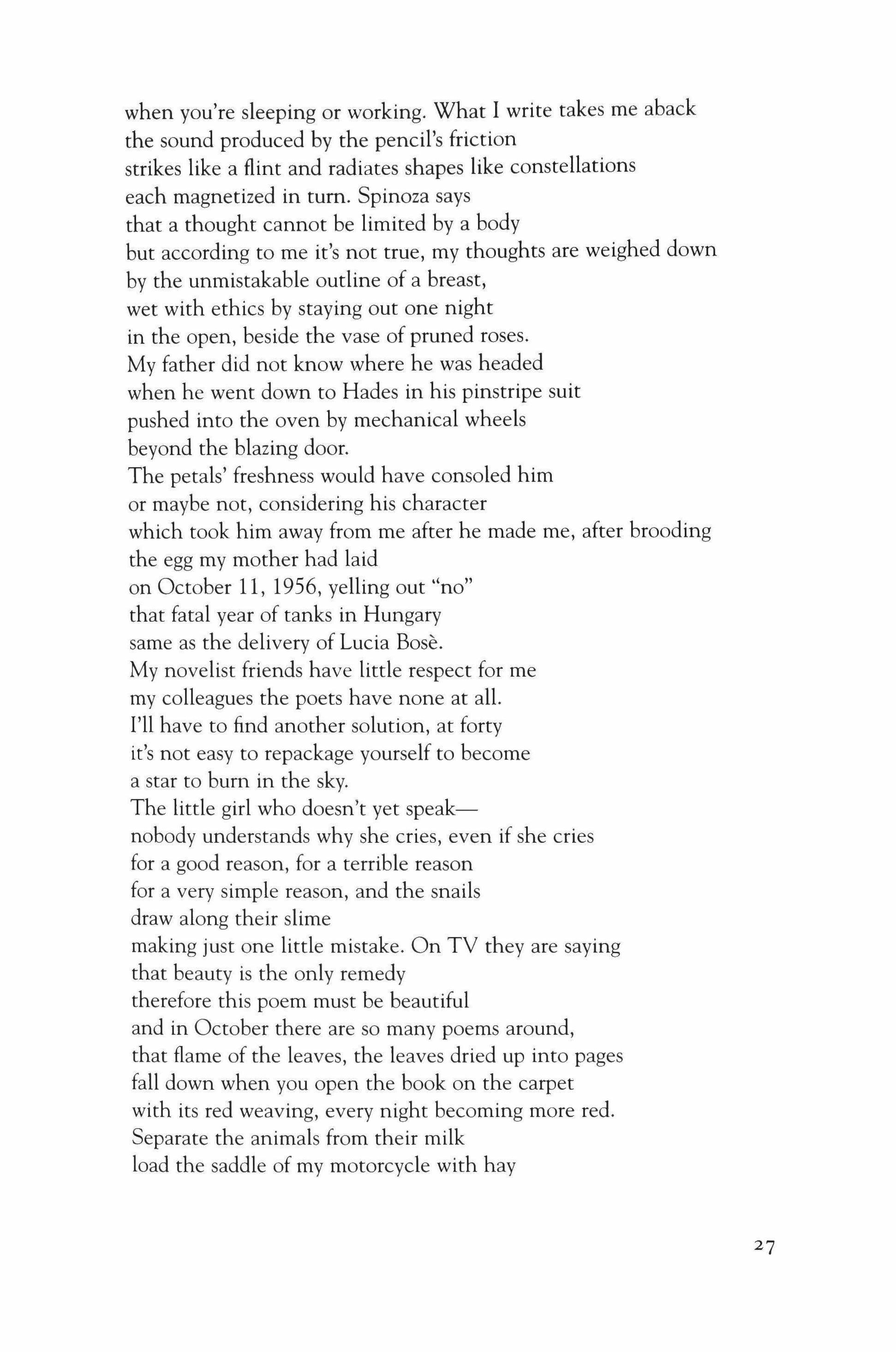
when you're sleeping or working. What I write takes me aback the sound produced by the pencil's friction strikes like a flint and radiates shapes like constellations each magnetized in tum. Spinoza says that a thought cannot be limited by a body but according to me it's not true, my thoughts are weighed down by the unmistakable outline of a breast, wet with ethics by staying out one night in the open, beside the vase of pruned roses. My father did not know where he was headed when he went down to Hades in his pinstripe suit pushed into the oven by mechanical wheels beyond the blazing door.
The petals' freshness would have consoled him or maybe not, considering his character which took him away from me after he made me, after brooding the egg my mother had laid on October 11,1956, yelling out "no" that fatal year of tanks in Hungary same as the delivery of Lucia Bose. My novelist friends have little respect for me my colleagues the poets have none at all. I'll have to find another solution, at forty it's not easy to repackage yourself to become a star to bum in the sky.
The little girl who doesn't yet speaknobody understands why she cries, even if she cries for a good reason, for a terrible reason for a very simple reason, and the snails draw along their slime making just one little mistake. On TV they are saying that beauty is the only remedy therefore this poem must be beautiful and in October there are so many poems around, that flame of the leaves, the leaves dried up into pages fall down when you open the book on the carpet with its red weaving, every night becoming more red. Separate the animals from their milk load the saddle of my motorcycle with hay

cucire di sonno gli occhi alle bambine rifiutare, rifiutare, rifiutare
aiutare, aiutare, ungere i cardini, cacciare cibo in gola ai neonati e ai tramortiti: questa il programma di oggi, piccola poesia.

sew the girls' eyes with sleep refusing, refusing, refusing helping, helping, oiling the hinges, force-feed the mouths of the newborn and the dying: this is the plan for today, little poem.
M come Merlino
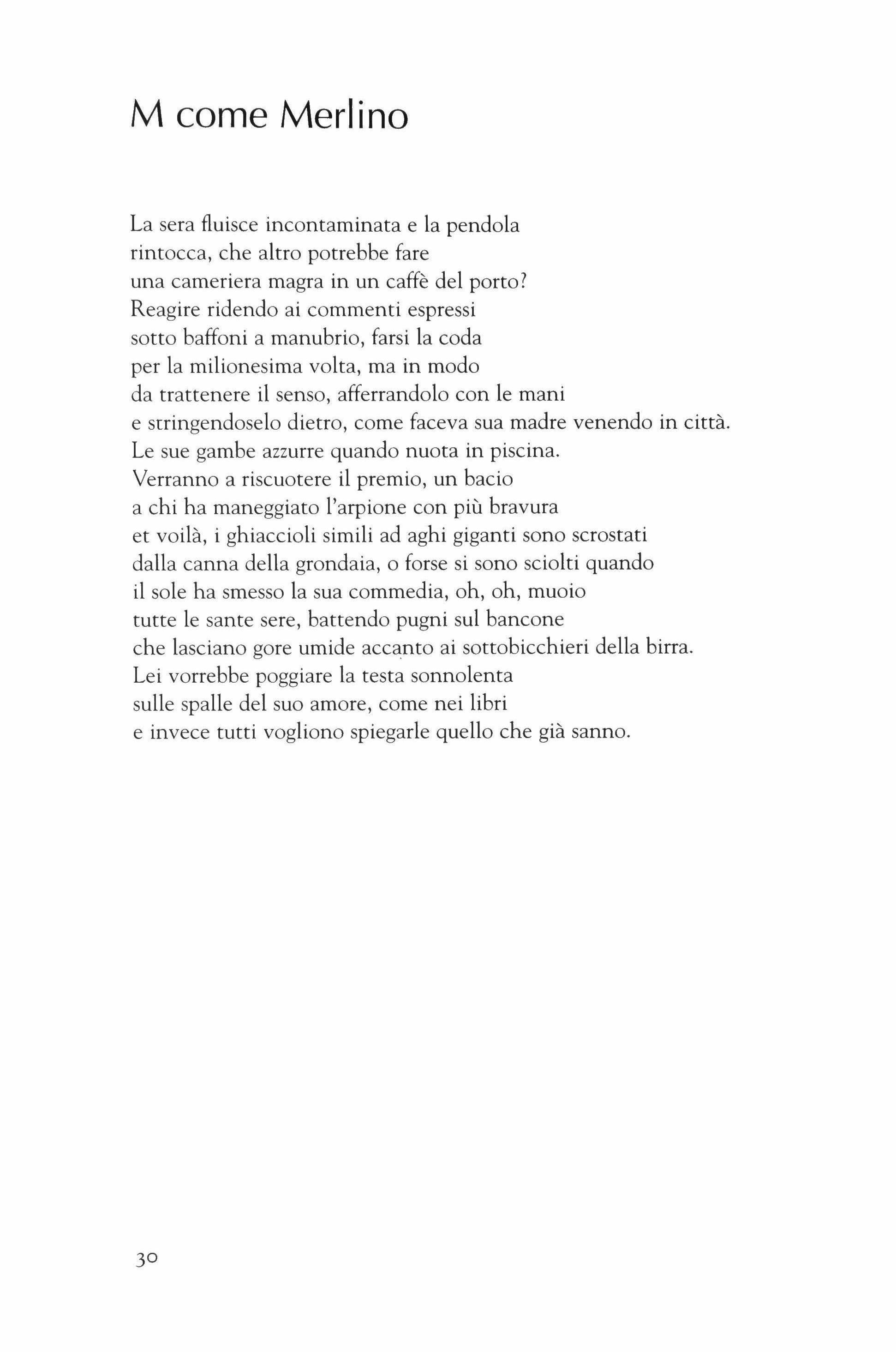
La sera fluisce incontaminata e la pendola rintocca, che altro potrebbe fare
una cameriera magra in un caffe del porto?
Reagire ridendo ai commenti espressi sotto baffoni a manubrio, farsi la coda per la milionesima volta, ma in modo da trattenere il senso, afferrandolo con le mani e stringendoselo dietro, come faceva sua madre venendo in citra.
Le sue gambe azzurre quando nuota in piscina. Verranno a riscuotere il premio, un bacio a chi ha maneggiato l'arpione con pili bravura et voila, i ghiaccioli simili ad aghi giganti sono scrostati dalla canna della grondaia, 0 forse si sono sciolti quando il sole ha smesso la sua commedia, oh, oh, muoio tutte le sante sere, battendo pugni sul bancone che lasciano gore umide accanto ai sottobicchieri della birra.
Lei vorrebbe poggiare la testa sonnolenta sulle spalle del suo amore, come nei libri e invece tutti vogliono spiegarle quello che gia sanno.
30
M Like Merlin

The evening flows uncontaminated and the pendulum clock tolls, what else can a skinny waitress do in a cafe at the harbor?
React with a laugh at the comments muttered behind handlebar moustaches, pull back her ponytail for the thousandth time, but in a way that makes sense, holding it between her hands and tightening it beneath her nape, just as her mother used to do, coming to town. Her blue legs, when she swims in the pool. They will come to collect the prize, a kiss to the one who was best at handling the harpoon et voila, the icicles have been scraped like giant needles from the gutter pipe, or maybe they melted when the sun ended its comedy, oh, oh, I die every blessed evening, beating my fists on the bench leaving humid stains beside the saucers of beer. She would like to lean her sleepy head on her beloved's shoulder, the way it is in books instead they all want to explain to her what they already know.
31
Antonella Anedda

Adorare (Ie immagini)
la beUezza dei giardini minuscoli e dei boschi una sedia appoggiata aUa parete e il vapore dei faggi.
Gettando 10 sguardo sui balconi dove una tovaglia ondeggia e per un attimo sembra ci si metta sul cuore colmandolo di azzurro, placandolo col suo tonfo nel vento.
E adorare i quadri che gli esseri umani hanno dipinto i mondi senza vento che respirano quieti nei musei queUe tempeste senza schiuma, quel sangue senza grido e le bestie mille volte benedette ferme vicino ai tronchi.
Asini e conigli, pozzanghere dentro cui scintilla il cielo pastori vicini al loro gregge striati di pioggia e luce verde
siamo esistiti davvero davanti a quei colori in un tempo perfetto, la grande tela di aUora, dipinta con amore piena di azzurro e porpora, di boschi, di preghiere
(*)
tela che ancora dura, soltanto non dipinta, tessuta cardata con cautela e ora di nuovo forse, pronta per il colore.
(* con un tono pili basso)
32
Translated by Gian Maria Annovi and Susan Stewart

To Adore (images) the beauty of tiny gardens and forests a seat set against the wall and the steam from the beeches. You cast a glance toward the balcony where a tablecloth is billowing and for a moment it seems to have spread itself over our heart brimming with blue, calmed by its thud in the wind.
And to adore the paintings that human beings have painted windless worlds quietly breathing in museums those tempests without foam, that blood without a cry and the beasts blessed a thousand times standing near the tree-trunks. Donkeys and rabbits, puddles holding the sparkling of the sky shepherds close to their flocks streaked with rain and green light
In front of those colors, we truly existed in perfected time, the great canvas of then, painted with love full of blue and purple, of forests, of prayers
(*) canvas that endures, even when not painted, fabric woven and carefully carded and now once more perhaps, ready for colors.
(* with a lower tone of voice)
33

Addormentarsi: iniziando da lontano. Dall'acqua che bevo e restituisco dal corpo-dal corpo lavato e svuotato e finalmente disteso poi arcuato come un gatto la gatta che anche adesso come me e viva e addormentata con la testa tra le braccia, con il muso tra le zampe con gli occhi che si allungano e si chiudono a fessura con le orecchie attente solo alla difesa della bambina del gatto cucciolo, con il sonno che arriva e mi fa sola e dunque finalmente sposa.
34

To fall asleep: starting out from far away. I drink from the water and return from the body-from the washed and emptied body and at long last relaxed and then arched like a cat the cat that just now like me is living and sleeping with my head tucked in my arms, with her head tucked in her legs with eyes that lengthen and half close with only her ears perked up protecting the baby the kitten, with the sleep that comes and leaves me lonely and so in the end a spouse.
35

Nell'autobus. Pensando all'affresco di Andrea Orcagna sulla peste di Firenze del 1300
vediamo la strada con le mani delle donne sui volanti
Ie fronti leggermente chine, le labbra chiuse: gridi di vento secco nelle bocche
-e da ogni gola una richiesta muta
-un immaginario cartiglio che invoca Ia fine del flagello.
Come gli assetati scolpiti da Nicola Pisano a Perugia siamo le statue
con bronzo fuso al posto del cuore il gesto degli assetati, la pietra delle mani traversata da ferro.

On the bus. Thinking of Andrea Orcagna's fresco of the plague in Florence in 1300
we see the street with the women's hands on the steering-wheels their delicately lowered heads, their parted lips: screams of dry wind in their mouths -and from each throat a mute request -an imaginary drawing that evokes the end of the scourge.
Like the thirsty men carved by Nicola Pisano in Perugia we are statues cast in bronze instead of the heart the gesture of those who are thirsty, the stone hands braced with iron.
37

Coraggio.
La cucina e un promontorio. Le pentole sono scogli divorati da un vento-lupo che soffia e corre in cerchio nell'isola. La ringhiera della finestra e una raffica grigia, sua compagna nostra sorella aguzza. Appena svegli noi siamo gli uccelli chini sul lavabo stanchi della migrazione notturna, confusi dai razzi che percuotono i sogni.
In tutto il quadro e inverno. Nella musica della radio rintocca la grandine. II suo bianco vibra sulle antenne e il balcone. Con il suo muso di nuvola pietosa l'alba ci spinge alla vita.

Courage.
The kitchen is a headland. The pots are rocks wolfed down by a wolf-wind that pants as it runs around the island. The balcony railing beyond the window is a gray blast, her companion is our sharp sister. Just awakened, we are the birds who bend over the basin exhausted from their night flights, confused by the flares that beat like drums through dreams.
The painting is full of winter. The hail strikes like clockwork in the radio's music. Its whiteness vibrates on the antennas and the balcony. With her muzzle, a pitiful cloud, the dawn pushes us out toward life.
39

Corpo (friabile) terracotta soffiata dall'interno da uno spirito inuit: la bambina legata al mio dorso a doppia fascia.
Selvatica come avesse alle spalle una radura.
Stringo il suo corpo gia grande che mi sfugge ogni giorno lasciandomi tra le dita la polvere rossa della sua materia, il calore del forno da cui e uscita. 11 suo spirito soffia, la spinge via sulle acque tra i cacciatori che l'aspettano nei kajak coperti con pelli di foca.

Body (friable) terracotta blown out from within by an Inuit spirit: the little girl cross-tied on my back.
Wild as though she had a clearing behind her.
I hug her body that is already big that is fleeing me every day leaving on my fingers her red dust, the heat of the oven from which she emerged. Her spirit is blowing, it is pushing her over the water where the hunters await her on kayaks covered by sealskins.
Figlia (a mia figlia)

Mi piace la sua fierezza quando combatte contro di me e grida «non e giusto». E i suoi occhi a fessura come le persiane nelle citra di mare.
La sua vita piena di falo-s-visibili e invisibilifuochi che ardono a ogni anna che avanza per farla vivere ancora e ancora in un miracolo di fumo.
E questa stare al caldo, credo, a dade il senso del perdono quel suo baciarmi la spalla all'improvviso, se la sgrido.
Forse ricorda i ferri da cui e nata e il cui segno mi attraversa la pelle senza orrore.
E usc ita dalla pancia mentre io dormivo. Ci unisce la pace l'assenza di urla, il mio pudore.
Siamo una tela di Giovanni Bellini: una vergine e un coniglio gentile.
Daughter (To My Daughter)
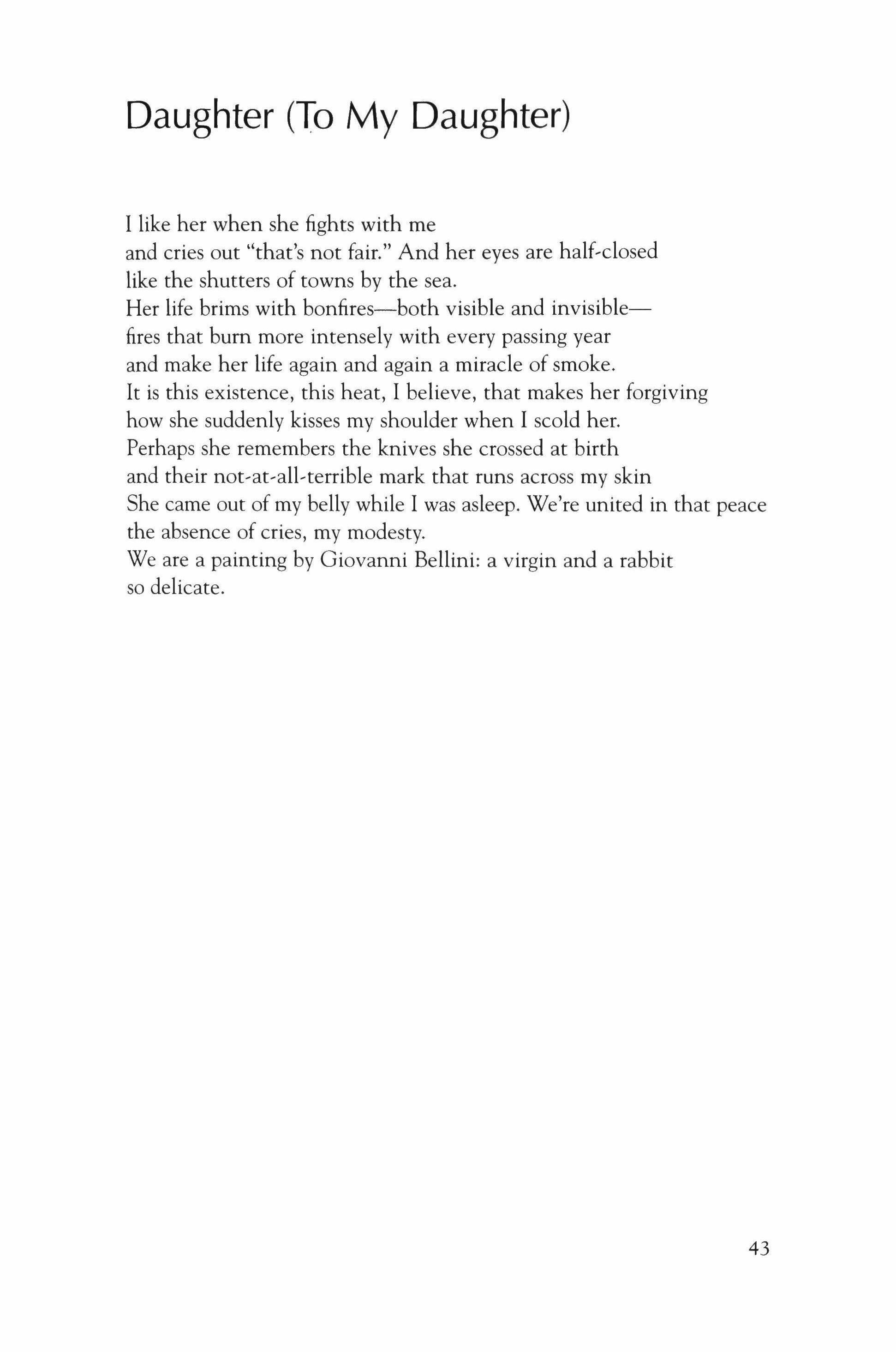
I like her when she fights with me and cries out "that's not fair." And her eyes are half-closed like the shutters of towns by the sea.
Her life brims with bonfires-both visible and invisiblefires that bum more intensely with every passing year and make her life again and again a miracle of smoke.
It is this existence, this heat, I believe, that makes her forgiving how she suddenly kisses my shoulder when I scold her.
Perhaps she remembers the knives she crossed at birth and their not-at-all-terrible mark that runs across my skin
She came out of my belly while I was asleep. We're united in that peace the absence of cries, my modesty.
We are a painting by Giovanni Bellini: a virgin and a rabbit so delicate.
43
Abbandono
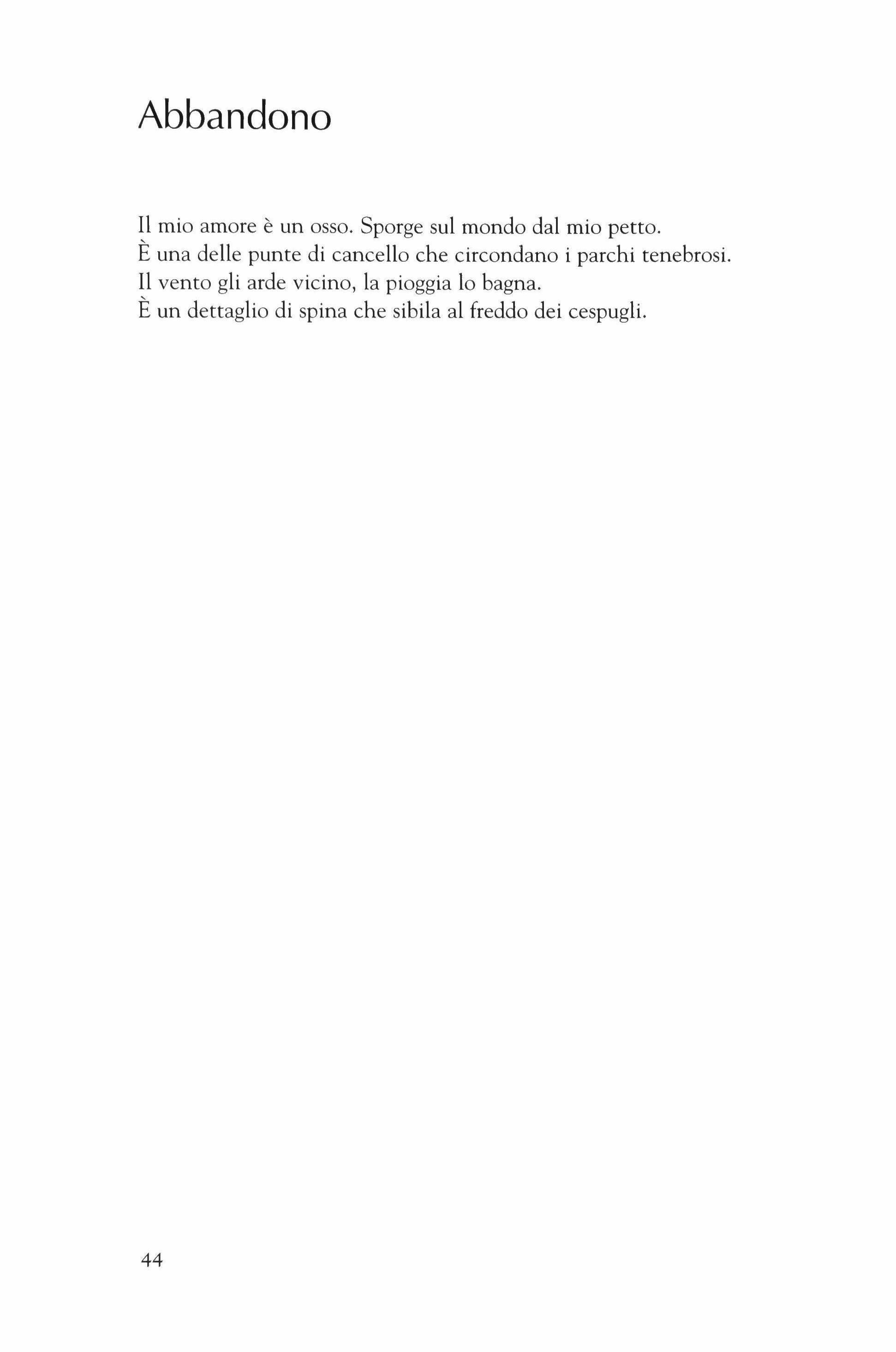
Il mio amore e un osso. Sporge sul mondo dal mio petto.
E una delle punte di cancello che circondano i parchi tenebrosi.
Il vento gli arde vicino, la pioggia 10 bagna.
E un dettaglio di spina che sibila al freddo dei cespugli.
44
Abandonment

My love is a bone. It leans out of my chest into the world. It's one of the gate-posts that fences the dusky parks. The wind is burning next to it, the rain is giving it a bath. It is a detail from a thorn that whistles to the cold of the brambles.
45
Due,

tre
Oggi vorrei vedervi miei amori nelle vostre cucine sedervi uno vicino all'altro, mangiare nudi senza imbarazzo come se foste meno che bambini indietro indietro fino all'utero, al seme, a quel niente che vi ha fatto luce, luci per me che ancora tanto vi amo.
Two, Three

My loves I would like to see you today to sit close to each other in your kitchens, eating in the nude without any embarrassment as though you were less than some babies going back going back at last to the womb, to the seed, to that nothingness that brought you into the light, you my lights whom I still love so much.
47
Quello che dell'amore resta
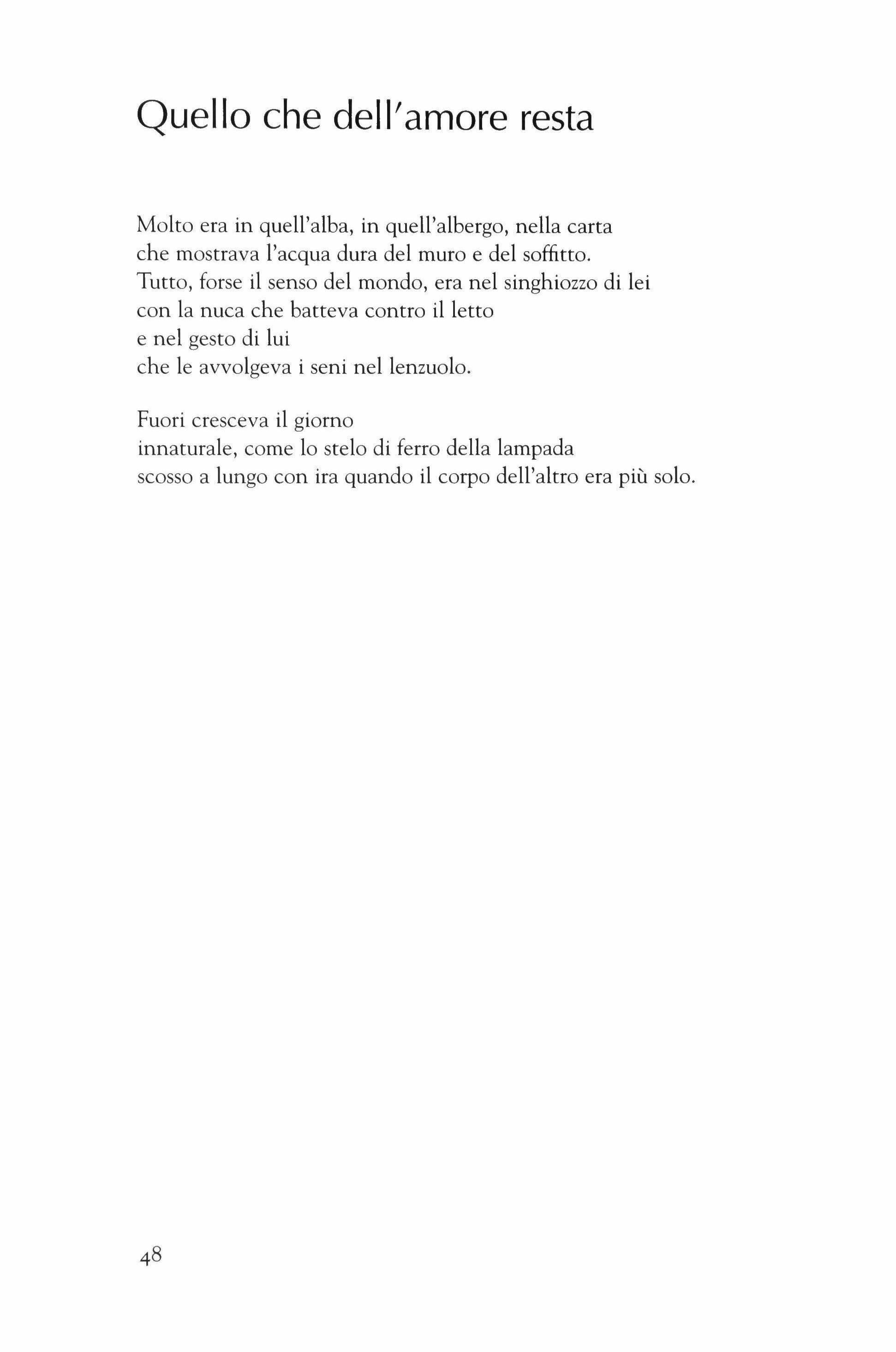
Molto era in quell'alba, in quell'albergo, nella carta che mostrava l'acqua dura del muro e del soffitto.
Tutto, forse il senso del mondo, era nel singhiozzo di lei con la nuca che batteva contro il letto e nel gesto di lui che le avvolgeva i seni nel lenzuolo.
Fuori cresceva il giorno innaturale, come lo stelo di ferro della lampada scosso a lungo con ira quando il corpo dell'altro era pill solo.
What Remains from Love

There was a lot in that dawn, in that hotel, in the wallpaper that showed the hard water from the wall and the ceiling. Everything, maybe the meaning of the world, was in her sobbing as her nape hit the bed and in his gesture as he folded her breasts beneath the sheet.
Outside the day sprung up unnaturally, like the steel stem of a lamp long suppressing its rage when the other's body felt so lonely.
49
Arcipelago (un collasso)

Rosso e grigio, una corona spezzata di granito e sale un soffio nel euore di ogni scoglio.
Sono caduta sotto poche nuvole un giomo di piena primavera con un cespuglio piegato sotto il corpo e l'intero promontorio sulla nuca. Avevo la sabbia nelle orecchie, la zampa del cane incerta sulle tempie.
Uno smottamento simile a quello che conosciamo in sogno l'istante in cui il moto sembra trovare l'enigma dello spazio.
Tutte le isole volavano
riproducendo con esattezza il vuoto delle pietre riempiendosi di vento a ogni sosta i sassi scattavano fischiando come fionde fino al gelo dei piedi e il fiato era un tronco con foglie da inghiottire a occhi stretti, fino alle radici.
Prima ci fu la casa, grigia, perfetta dentro il sole assi sconnesse, vecchi chiodi, una sedia, poi quel fischio misto a voci due bambini e la lingua del cane come un tocco di infinito sulla gola.
Forse fu questa che mostro al destino come ancora rni ardesse la linea della vita
Quando la mana scorticata si mosse a scacciare una mosca che punto decisa verso il cielo.
50
Archipelago (A Collapse)
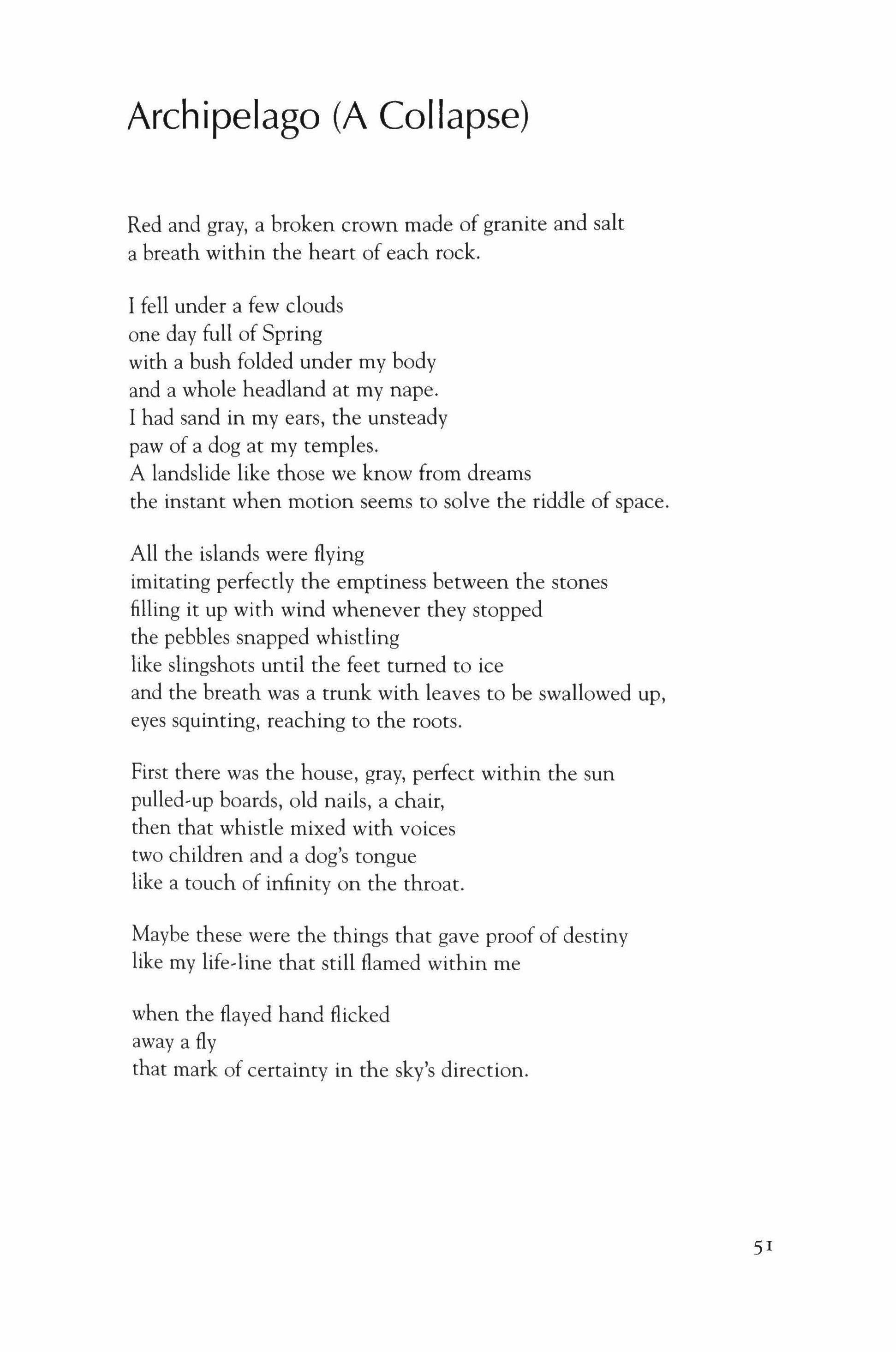
Red and gray, a broken crown made of granite and salt a breath within the heart of each rock.
I fell under a few clouds one day full of Spring with a bush folded under my body and a whole headland at my nape. I had sand in my ears, the unsteady paw of a dog at my temples. A landslide like those we know from dreams the instant when motion seems to solve the riddle of space.
All the islands were flying imitating perfectly the emptiness between the stones filling it up with wind whenever they stopped the pebbles snapped whistling like slingshots until the feet turned to ice and the breath was a trunk with leaves to be swallowed up, eyes squinting, reaching to the roots.
First there was the house, gray, perfect within the sun pulled-up boards, old nails, a chair, then that whistle mixed with voices two children and a dog's tongue like a touch of infinity on the throat.
Maybe these were the things that gave proof of destiny like my life-line that still flamed within me when the flayed hand flicked away a fly that mark of certainty in the sky's direction.
51
Luigi Ballerini

Cora
chi organizza la propria vita ed e un ritomo la vita che organizza, a lui tocca entrare in ogni fuga, restare con un pugno di mosche
chi trasferisce (negando) l'attesa di padre in figlio e si sgomenta nel figlio, puo fingersi maschio abbattuto in un campo di stoppie
chi per tutta la vita ritoma, ed e godimento in lui 10 struggimento del non tomare, la sua vita e 10 stesso che passare da esasperato
senso a suono che suscita un riso: se basti, per ridere, occultare il varco per cui si accede al gioco delle parti, alla ridda del tenere
a bada (fatto di gomma come sono, se gioco, gioco in porta, dove anche i paranoici hanno diritto di sentirsi minacciati). Nel cretto
impassibile del segno (per cui si vince) che pili si sdipana e pili minaccioso dimora, il Duce ha sempre ragione, sempre, i tedeschi,
torto. Larine loquitur? Ufun pofocofo insomma me la cavo, rna e chiaro che non c'e rimedio a cio che si acquista fuggendo
Translated by David Lummus
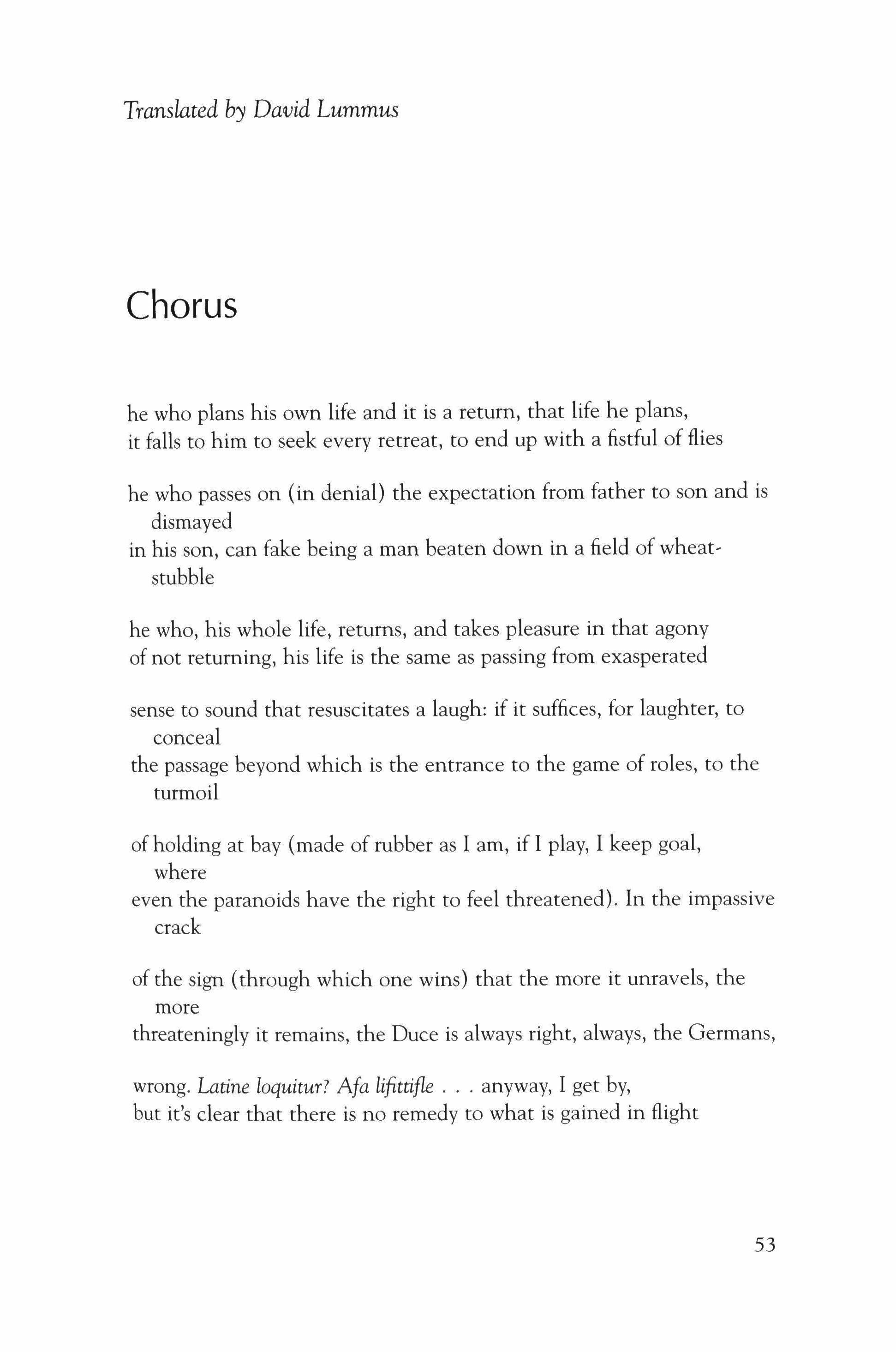
Chorus
he who plans his own life and it is a return, that life he plans, it falls to him to seek every retreat, to end up with a fistful of flies
he who passes on (in denial) the expectation from father to son and is dismayed in his son, can fake being a man beaten down in a field of wheatstubble
he who, his whole life, returns, and takes pleasure in that agony of not returning, his life is the same as passing from exasperated
sense to sound that resuscitates a laugh: if it suffices, for laughter, to conceal the passage beyond which is the entrance to the game of roles, to the turmoil
of holding at bay (made of rubber as I am, if I play, I keep goal, where even the paranoids have the right to feel threatened). In the impassive crack of the sign (through which one wins) that the more it unravels, the more threateningly it remains, the Duce is always right, always, the Germans, wrong. Larine loquitur? Afa lifitrifIe anyway, I get by, but it's clear that there is no remedy to what is gained in flight
53

"credo in un dio randagio"
credo in un dio randagio, nauseato dalle cause che scompare a intervalli regolari, un dio assai muscoloso, di statura media, che pesca e ripesca e a furia di pescare pesca un figlio che da grande fara il pescatore di figli. Credo in un dio scavante, silenzioso, che non da il cane 0 altro sapido animale da passeggio, 0 da grembo, un dio incerto, incerato, sovraimposto, che apre alcune danze bicostali, bilingui, bisessuali. Credo in un dio scaraventante che cammina sulle uova, un dio a ritroso che sta davanti, che beve, che e sul punto di affogare
credo del pari nella posta in gioco, nella meta e nei tre quarti del tutto, nel quasi subito e nel quasi tutto, credo in chi non vede il trucco e, nulla sapendo della morte, sostiene che sia come fare la fronda o segnalare la propria presenza nei dintorni e, anzi, dentro u testo, fino in fondo, perche muoia, quel testo, di stenti, e sia dunque la morte un uccidere l'altro che ha scritto, che puo tradurci in soggetto. Credo nella comunione dei malefici, delle ipotesi stanziali e nelle realta di passo, credo nelle nudita incrociate secondo l'aria che tira nella gestione dell'azzardo
e credo nella voce che fa parte dell'intrigo e dello scatenarsi delle passioni piu ignobili, e nel ritmo dell'intarsio, nel musolungo degli eroi di stato accecati da un'idea di ragione, credo nel sottovento, rna con le onde contro, sotto e sopra, e di fianco, col male in amese che canta, che attacca i tacchi a quelli che attaccano i tacchi, e alle tacchine, ai muli frenetici, ai montoni di un mezzodi che cuoce cervello e cuore. Credo nel jalous che ritoma e nel jongleur che se la svigna, nella fatina (che frigna) e tiene pelo largo e turchino, credo nel bambino che si nasconde nella marionetta, e nella marionetta che si sgola coram populo, 0 che recalcitra di buon mattino
54

"i believe in a stray
god"
i believe in a stray god, nauseous with causes, who disappears at regular intervals, a god full of muscles, average in height, who fishes and fishes again and in a craze of fishing he fishes out a son who, once grown, will be a fisherman of sons. I believe in an excavating god, silent, who doesn't dog out on you or act like any other clever animal for walking or holding in your lap, an uncertain god, made of wax-cloth, double exposed, who opens a few bicoastal, bilingual, bisexual dances. I believe in a hurling god, a god who walks on eggs, a god a rebours who is running ahead, who drinks, who's on the brink of drowning
i believe equally in the stakes, in the half and in the three fourths of the whole, in the almost immediate and in the almost whole, i believe in him who doesn't see the trick and, knowing nothing of death, maintains that it is like staging a rebellion or marking one's own presence in the whereabouts of the text and, actually, within the text, to the end, so that it may die-that textof privation, and death be a killing of the other who wrote it, who can translate us into subject. I believe in the communion of the curses, of the standing hypotheses and in migratory realities, i believe in the crisscrossed nudities that vary according to how one handles the bet.
and i believe in the voice that is a part of the intrigue and of the unleashing of the most ignoble passions, and in the rhythm of the inlay, in the long face of the official heroes blinded by a right idea, i believe in the downwind, but with opposing waves, down and up, and sideways, worsening and singing, heeling the shoes on the heelers of shoes, and on the heeling dogs, on the frenetic mules, on the rams during a midday that heats head and heart. I believe in the returningjalous and in the jongleur who sneaks off, in the fairy (who frets) and has long and blue hair, i believe in the child who hides in the marionette, and in the marionette who shouts coram populo, or who's reluctant from early morning
55
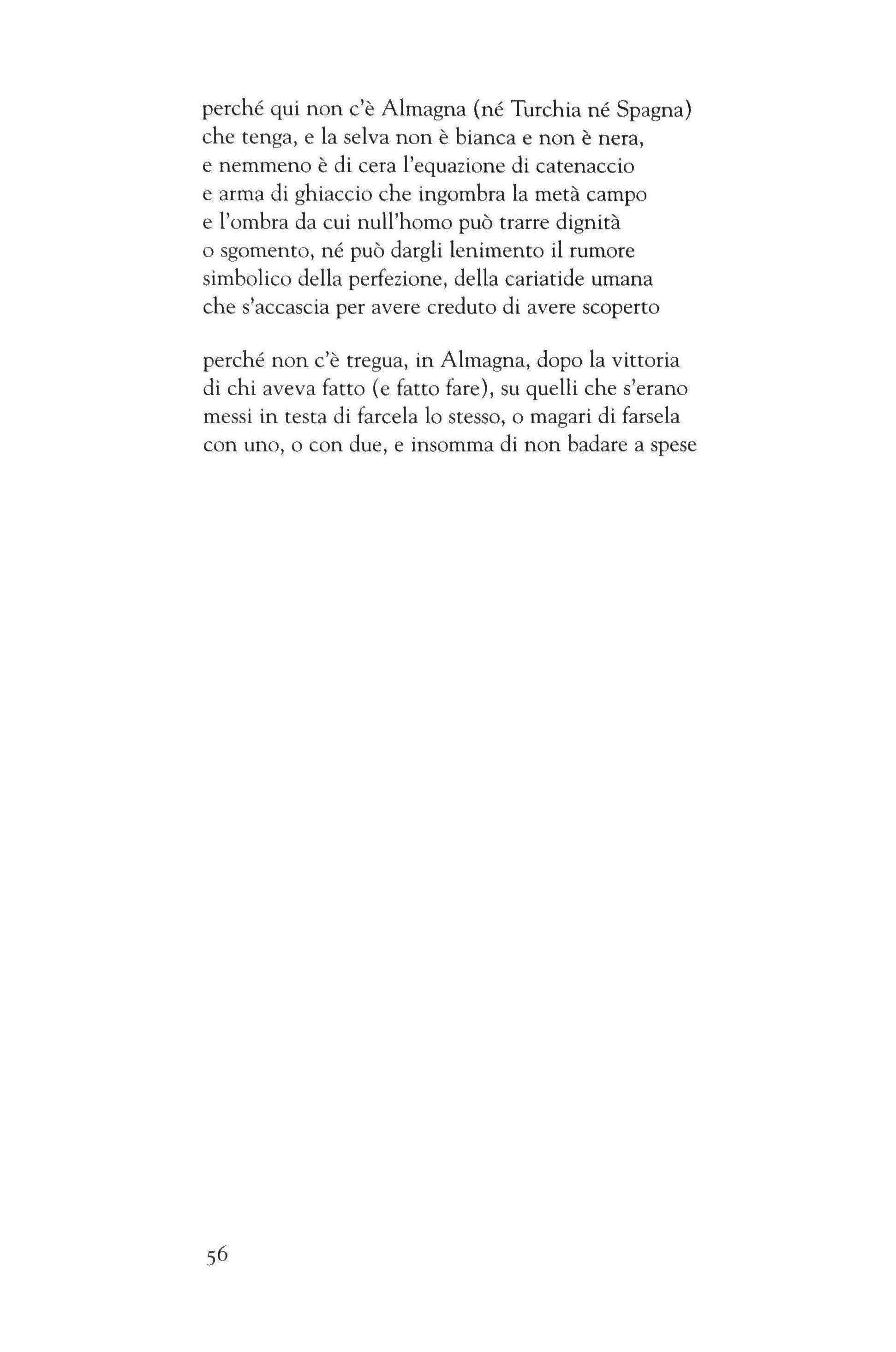
perche qui non c'e Almagna (ne Turchia ne Spagna) che tenga, e la selva non e bianca e non e nera, e nemmeno e di cera l'equazione di catenaccio e arma di ghiaccio che ingombra la meta campo e l'ombra da cui null'homo puo trarre dignita o sgomento, ne puo dargli lenimento il rumore simbolico della perfezione, della cariatide umana che s'accascia per avere creduto di avere scoperto
perche non c'e tregua, in Almagna, dopo la vittoria di chi aveva fatto (e fatto fare), su quelli che s'erano messi in testa di farcela 10 stesso, 0 magari di farsela con uno, 0 con due, e insomma di non badare a spese
56
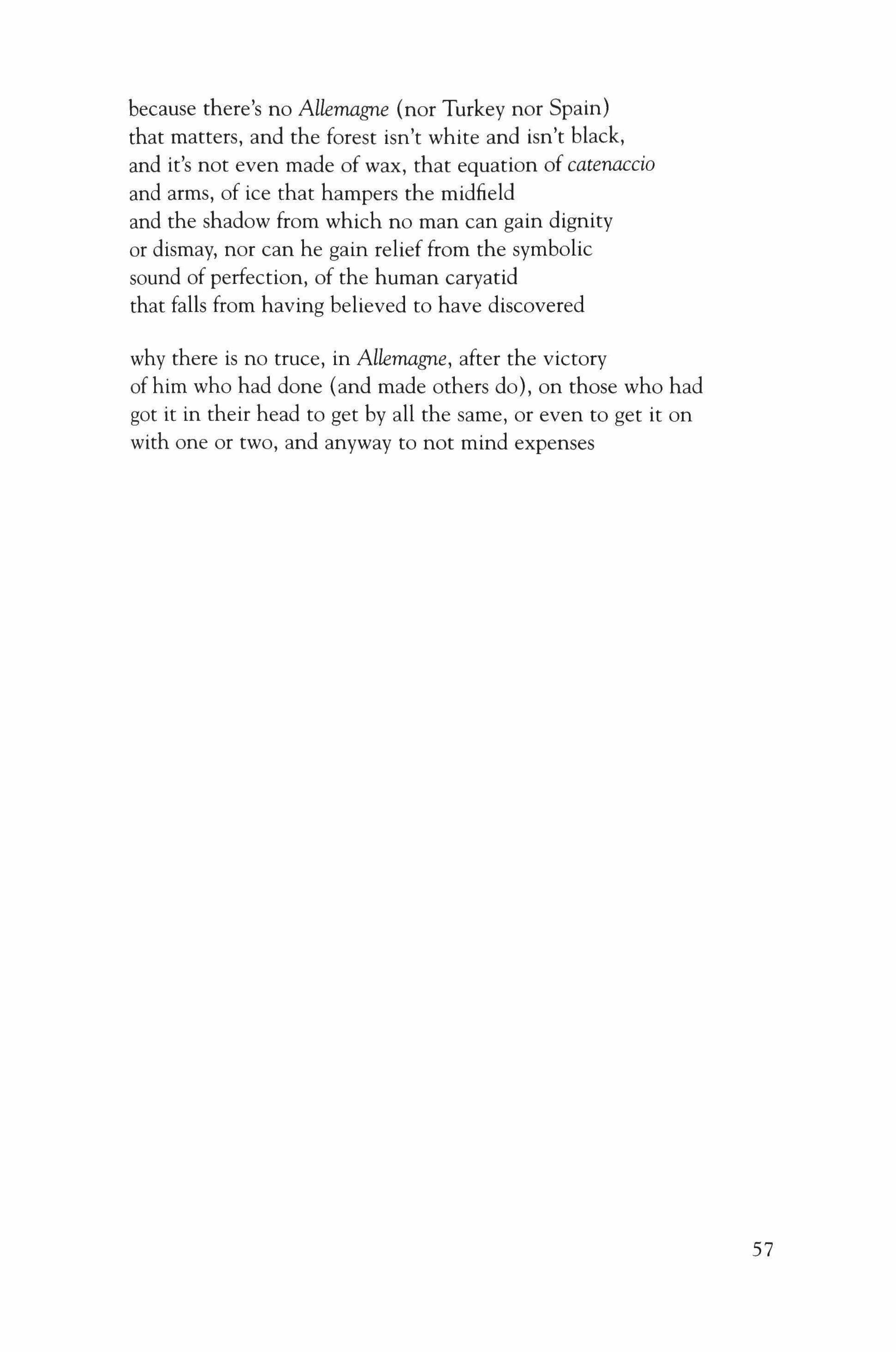
because there's no Allemagne (nor Turkey nor Spain) that matters, and the forest isn't white and isn't black, and it's not even made of wax, that equation of catenaccio and arms, of ice that hampers the midfield and the shadow from which no man can gain dignity or dismay, nor can he gain relief from the symbolic sound of perfection, of the human caryatid that falls from having believed to have discovered
why there is no truce, in Allemagne, after the victory of him who had done (and made others do), on those who had got it in their head to get by all the same, or even to get it on with one or two, and anyway to not mind expenses
57
de contemptu mundi

tutto a meta (tra la meta e tre quarti) e nel senso di una lontananza frivola, rna che disgela: tutto per un'ora, 0 due, finche l'idea bislacca di una devastazione non ceda all'astrazione, al tremore di un traguardo volante 0 al collasso della parte che insiste, rna non scommette. Segue, a due primi e otto, il plotone color vaniglia di quelli che guardano smarriti, 0 ritirano adesioni: a due minuti e nove il plotone color pulce di quelli che si strangolano con le proprie mani, proiettando il sana principio dell'equivalenza dall'asse della selezione a quello malsano della combinazione: a due minuti e dieci il plotone color alchechengi di quelli che giurano di avere fiutato e capito. Tutto a meta (tra la meta e tre quarti) e con l'idea di farcela contro uomini di dubbio lignaggio, "che anche tra di loro ce n'e dei buoni, con l'oro del mattino in bocca, affrescati sontuosamente e rampicanti come un'edera di zinco, nella stagione obliqua delle stragi: ce n'e, anche se non pare, e nessuno ne puo approfittare, nemmeno i rassegnati al furto, i senza rincorsa che hanno i piedi all'incontrario e non hanno bocca, e hanno pero due buchi nella faccia da cui per nutrimento assorbono di tanto in tanto il profumo delle mele."
58
De Contemptu Mundi
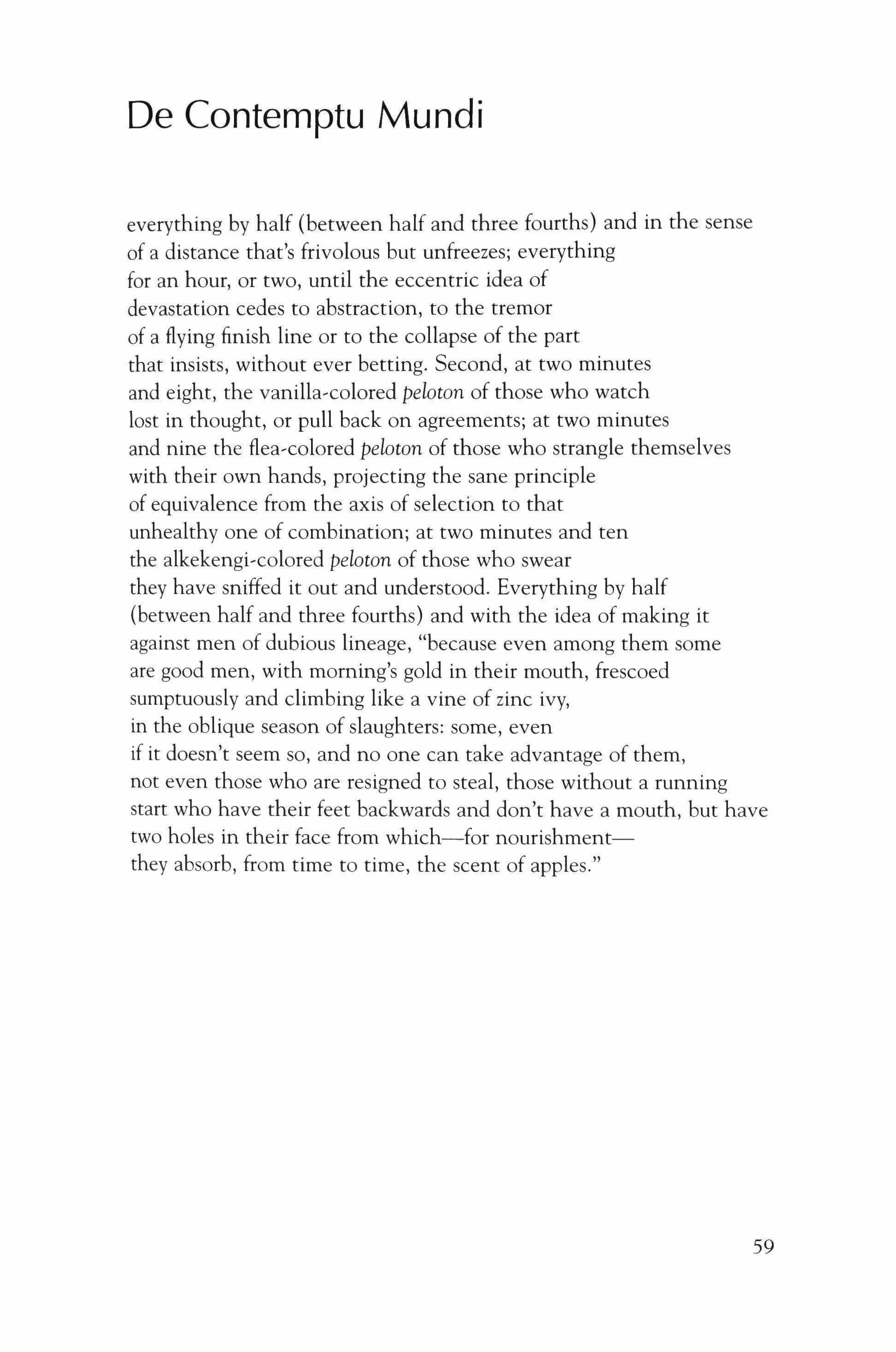
everything by half (between half and three fourths) and in the sense of a distance that's frivolous but unfreezes; everything for an hour, or two, until the eccentric idea of devastation cedes to abstraction, to the tremor of a flying finish line or to the collapse of the part that insists, without ever betting. Second, at two minutes and eight, the vanilla-colored peloton of those who watch lost in thought, or pull back on agreements; at two minutes and nine the flea-colored peloton of those who strangle themselves with their own hands, projecting the sane principle of equivalence from the axis of selection to that unhealthy one of combination; at two minutes and ten the alkekengi-colored peloton of those who swear they have sniffed it out and understood. Everything by half (between half and three fourths) and with the idea of making it against men of dubious lineage, "because even among them some are good men, with morning's gold in their mouth, frescoed sumptuously and climbing like a vine of zinc ivy, in the oblique season of slaughters: some, even if it doesn't seem so, and no one can take advantage of them, not even those who are resigned to steal, those without a running start who have their feet backwards and don't have a mouth, but have two holes in their face from which-for nourishmentthey absorb, from time to time, the scent of apples."
59
Patrizia Cavalli

Cado e ricado, inciampo e cado, mi alzo e poi ricado, le ricadute sono la mia specialita. Cos'altro ho fatto che fingere di usc ire e ricadere dentro?
Nessuno mai che io trascini insieme a me cadendo. Grandi equilibri mi circondano ma non mi reggono, anzi proprio perche io cado si sorreggono. Corn'era bella la coppia di vecchi innamorati che sottobraccio
volendo misurarsi per duplice entusiasmo con la catena che chiude Ponte Sisto, sicuri che quel restare insieme li avrebbe sostenuti, caddero invece insieme ancora sottobraccio, non umiliati ma certo stupefatti di come quello stare perfettamente in due li avesse sbilanciati, e pen'> grati comunque l'uno all'altro di essere in due, che nessuno dei due vedesse, l'uno salvo, cadere l'altro.
60
Translated by Brunella Antomarini and Susan Stewart

I fall and fall again, I stumble and fall, I stand up and fall again, falling back is my specialty. What have I ever done but pretend to go out and fall back in? Never once could I drag anyone down with me. Great balance surrounds me but does not hold me. How beautiful that old couple was, in love, arm in arm, stepping over the chain at the Ponte Sisto in a double fit of enthusiasm, both confident that their being together would have held them up, they fell together instead, arm in arm. Not humbled but certainly astonished at how their being a perfect pair had unbalanced them, though grateful to each other to be a pair, so that neither one, if safe, would see the other fall.
6r

Andre all'inferno certo andro all'inferno, per empia volonta, dar vita ai morti.
Ai morti ancora in vita eppure morti, cost contenti di essere gia morti.
Taumaturga infelice e prepotente che vuoi fermare il tempo rna non vedi che il tempo era gia fermo e ti aspettava.

I'll go to hell, I'm certain I'll go to hell, because of an impious will, to give the dead new life. the living dead, yet dead, so glad to be already dead. You unhappy and overbearing thaumaturge who wants to stop time but cannot see that time is already standing still and waits for you.

Pigre divinita e pigra sorte
cosa non faccio per incoraggiarvi, quante occasioni con fatica vi offro solo perche possiate rivelarvi!
A voi mi espongo e faccio vuoto il campo e non per me, non e nel mio interesse, solo per farvi esistere mi rendo facile visibile bersaglio. Vi do anche un vantaggio, a voi l'ultima mossa, io non rispondo, a voi quell'imprevisto ultimo tocco, rivelazione di potenza e grazia: ci fosse un merito sarebbe solo vostro. Perche io non voglio essere fabbrica della fortuna mia, vile virtu operaia che mi annoia. Avevo altre ambizioni, sognavo altre giustizie, altre armonie: ripulse superiori, predilezioni oscure, d'immeritati amori regalie.

Lazy gods and lazy fortune, what I wouldn't do to encourage you, how many chances do I tirelessly give you so that you may reveal yourselves! I expose myself to you and clear the field but not for me, it's not for my sake, it's just in order to make you exist that I turn into a visible easy target. And I give you an advantage: the last move is yours, I don't take my turn; yours is that unexpected final move, a revelation of power and grace: whatever credit is due will be yours. Because I don't want to be the maker of my fortune, that laborer's low virtue bores me. I had other ambitions, I dreamed of other justices, other harmonies: high rejections, obscure predilections, gifts of loves I don't deserve.
65

Questo tempo sabbatico
prima di una partenza, questa tempo rubato al tempo, questa tempo non mio ne di altri, il tempo della valigia e del ritardo, questa lusso sospeso, questa margine ricco, quando audace e irresponsabile posso quello che neanche gli anni mi concedono, dove accorrono i pensieri piu negletti
e sono accolti, e tra un pigiama e una camicia s'insedia maestoso ma arrendevole il possibile, dove potrei persino telefonarti e dichiararmi
folIe d'amore, questa unico tempo vera involontario che ci e dato per grazia di partenze, questa non e nient'altro che preghiera.
66

This sabbatical time, before a departure, this time stolen from time, this time not mine nor anyone else's, time of baggage and delay, this suspended luxury, this wealthy border, when bold and irresponsible I conceive what not even years allow me, when the most neglected thoughts flock together and are taken in, and possibility foists itself stately but yielding between a pajama and a shirt, when I could even give you a call and declare myself madly in love, this sole time, true and unintentional, given to us by virtue of departures, this is nothing but a prayer.
Guarda!

Tutti vogliono essere guardati.
Anche chi si sottrae a ogni vista vuole idealmente essere guardato.
Ma chi ha paura non vede e non e visto, e la paura che arma gli assassini.
Guarda, sono gia morta.
Guardamil Risorgimi!
68
Look!

Everyone wants to be looked at.
Even the one who withdraws from every gaze dreams of being looked at.
But whoever is afraid does not see and is not seen, it is fear that arms assassins.
Look, 1 am dead already.
Look at me! Revive me!
L'Eden

Mi hanno mandato via?
E io me 10 rifaccio.
E visto che ci sono 10 miglioro.

Did they throw me out?
Then I'll do it over, And even better.
Eden

Eravamo tutti perdonati.
Perche l'aria ci assorbiva
nella sua temperatura. La testa piegata di lato, la guancia che tocca la spalla e quasi l'accarezza. Liscio il respiro, sollevato volante. 11 cuore pattinava controvento. Oh varietal Oh insieme!
Ogni strada e felice
se una pioggetta tiepida intimidisce la luce e la costringe a spargersi senza predilezioni.
Pili che perdono. Eravamo accolti.

We were all forgiven. Because the air absorbed us in its climate. The head cocked to the side, a cheek touching a shoulder and almost caressing it. The breath was smooth, lifted up in flight. The heart skating against the wind. o variety! 0 togetherness! Each street is happy if a mild drizzle overwhelms the light and makes it scatter any which way. More than forgiven. We were welcome.
73
Milo De Angelis
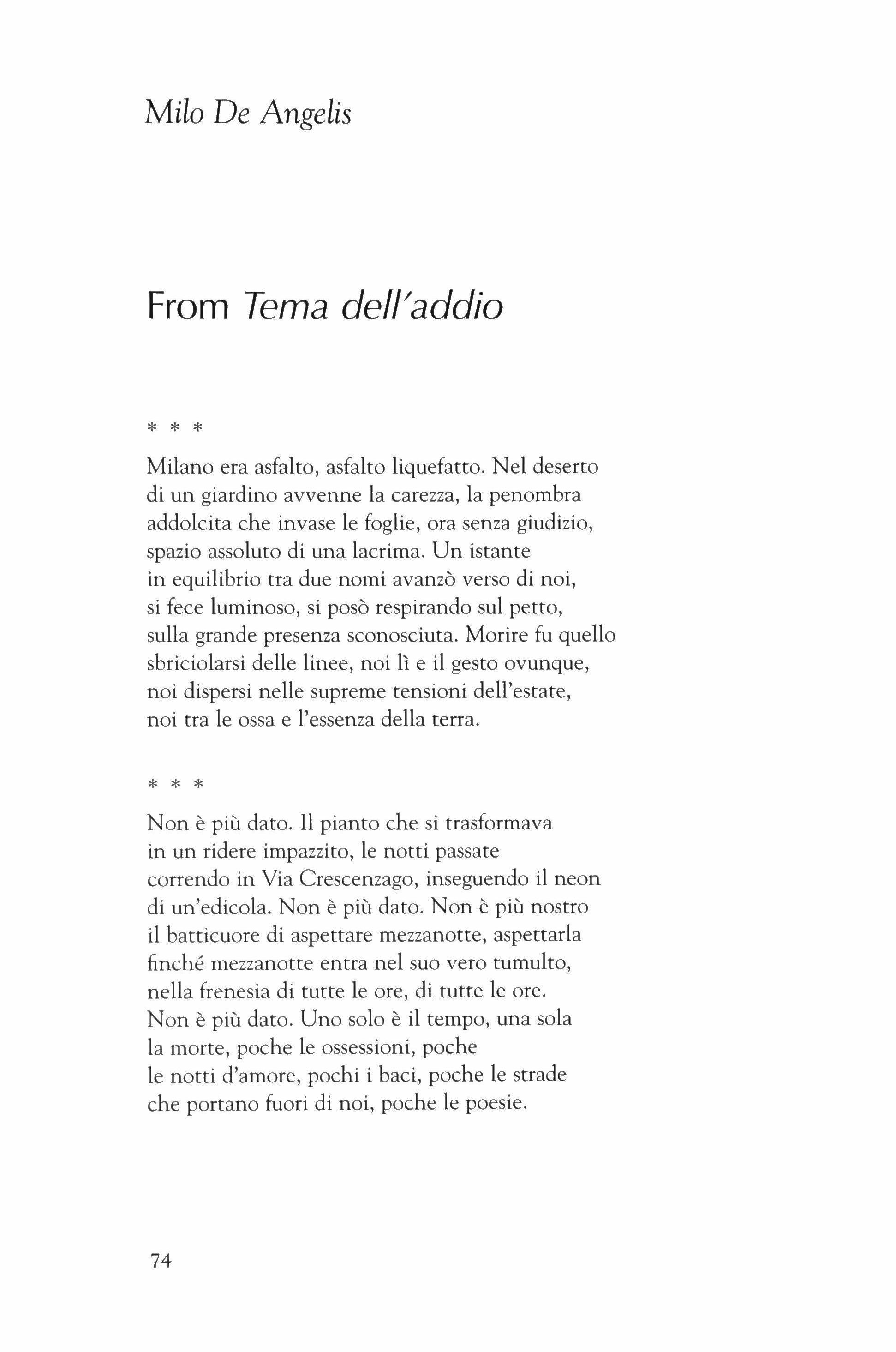
From Tema del/'addio
* * *
Milano era asfalto, asfalto liquefatto. Nel deserto di un giardino avvenne la carezza, la penombra addolcita che invase le foglie, ora senza giudizio, spazio assoluto di una lacrima. Un istante in equilibrio tra due nomi avanzo verso di noi, si fece luminoso, si poso respirando sul petto, sulla grande presenza sconosciuta. Morire fu quello sbriciolarsi delle linee, noi 11 e il gesto ovunque, noi dispersi nelle supreme tensioni dell'estate, noi tra le ossa e l'essenza della terra.
* * *
Non e pill dato. Il pianto che si trasformava in un ridere impazzito, le notti passate correndo in Via Crescenzago, inseguendo il neon di un'edicola. Non e pill dato. Non e pill nostro il batticuore di aspettare mezzanotte, aspettarla finche mezzanotte entra nel suo vero tumulto, nella frenesia di tutte le ore, di tutte le ore. Non e pill dato. Uno solo e il tempo, una sola la morte, poche le ossessioni, poche le notti d'amore, pochi i baci, poche le strade che portano fuori di noi, poche le poesie.
74
Translated by Patrizio Ceccagnoli and Susan Stewart

From Theme of Farewell
* * *
Milan was asphalt, liquid asphalt. In the desert of a garden, there was a caress, the melting penumbra invading the leaves, the hour without censure, a tear's absolute space. An instant, balanced between two names, came toward us, luminous, settling, breathing, on the chest of the great unknown presence. To die was that crumbling of lines, we were there and the gesture was everywhere, we were scattered in the high tensions of summer we were caught between the bones and the essence of the earth.
* * *
It's no longer possible. The crying that turned into crazy laughing, the nights spent running down Via Crecenzago, chasing the neon banner of a newsstand. It's no longer possible. It's no longer ours, the heartbeat of waiting for midnight, waiting until midnight comes with its true tumult, with the frenzy of all the hours, all the hours. It's no longer possible. There's only one time, only one death, a few obsessions, a few nights of love, a few kisses, a few streets that lead outside ourselves, a few poems.
75
Tutto era gia in cammino. Da allora a qui. Tutto il tempo, luminoso, sfiorava Ie labbra. Tutti i respiri si riunivano nella collana. Le ombre di Lambrate chiusero la porta. Tutta la stanza, assorta, divento il primo battito. II nero dei tuoi capelli contro il giallo dell'ultimo raggio. Da allora a qui. Era il primo giomo dell'estate. II silenzio ci riempiva la fronte. Tutto era gia in cammino, da allora, tutto era qui, unico e perduto, nostro e remoto, ardente. Tutto chiedeva di essere atteso, di tomare nel suo vero nome.

Affogano le nazioni, crollano le torri, un caos di lingue e colori, traumi e nuovi amori, entra alla Bovisasca, spazza via il novecento della solitudine maestra, del nostro verso sospeso nel vuoto. Altre donne si aggirano tra gli scarti del mercato, nella nuova miseria di questa istante. 10 siedo al caffe sottocasa, guardo il paesaggio che fu di Sironi, in un solitario dodici agosto, inizio a convocare le ombre.
Rivedo mio padre in una citra di mare, una brezza di Belle Epoque e un sorriso sperduto di ragazzo. E poi Paoletta che sul tatami trove la vittoria a tre secondi dalla fine. E Roberta che ha dedicato la sua vita. E Giovanna, in un silenzio di ospedali, quando il tempo rivela i suoi grandi paradigmi.
"Torneranno vivi gli amori tenebrosi che in mezzo agli anni lasciarono una spina, tomeranno, tomeranno luminosi."
* * *
* * *
Everything was already on its way. From then to here. All of time, luminous, skimmed across the lips. All the breathing strung on the necklace. Lambrate's shadows shut the door. The whole room taken in, became the first heartbeat. The black of your hair against the yellow of the last sunbeams. From then to here. It was the first day of summer. The silence filled our thoughts. Everything was already on its way, from then on, everything was here, unique and lost, ours and far from us, burning. Everything asked us to wait for it, to return to its true name.

The nations drown, the towers collapse, a chaos of languages and colors, traumas and new loves, enters Bovisasca, wipes out the masterful loneliness of the twentieth century, of our lines suspended over the void. Other women wander amid the scraps left from the market, in the new misery of this moment. I sit at the downstairs cafe, I look at the landscape Sironi made, on a lonely August twelfth, I start to convene the shadows.
I see my father again in a seaside town, a breeze of the Belle Epoque and a boy's lost smile. And then Paoletta who triumphed on the judo mat three seconds before the end. And Roberta who devoted her life. And Giovanna, in a hospital silence, when time reveals its great paradigms.
"The shadowy loves will return to life again loves that left a thorn among the years will return, will return, luminous."
* * *
* * *
77
Dove ondeggiava il sangue, dove il perfetto insieme era piu nostro, c'e l'ombra del geranio, le sostanze crocifisse, un metro d'asfalto e di nulla e il respiro e d'asfalto, le labbra d'asfalto, il silenzio e l'andarsene sono d'asfalto. L'ultimatum, anche quello, ce l'ha data l'asfalto, l'asfalto.
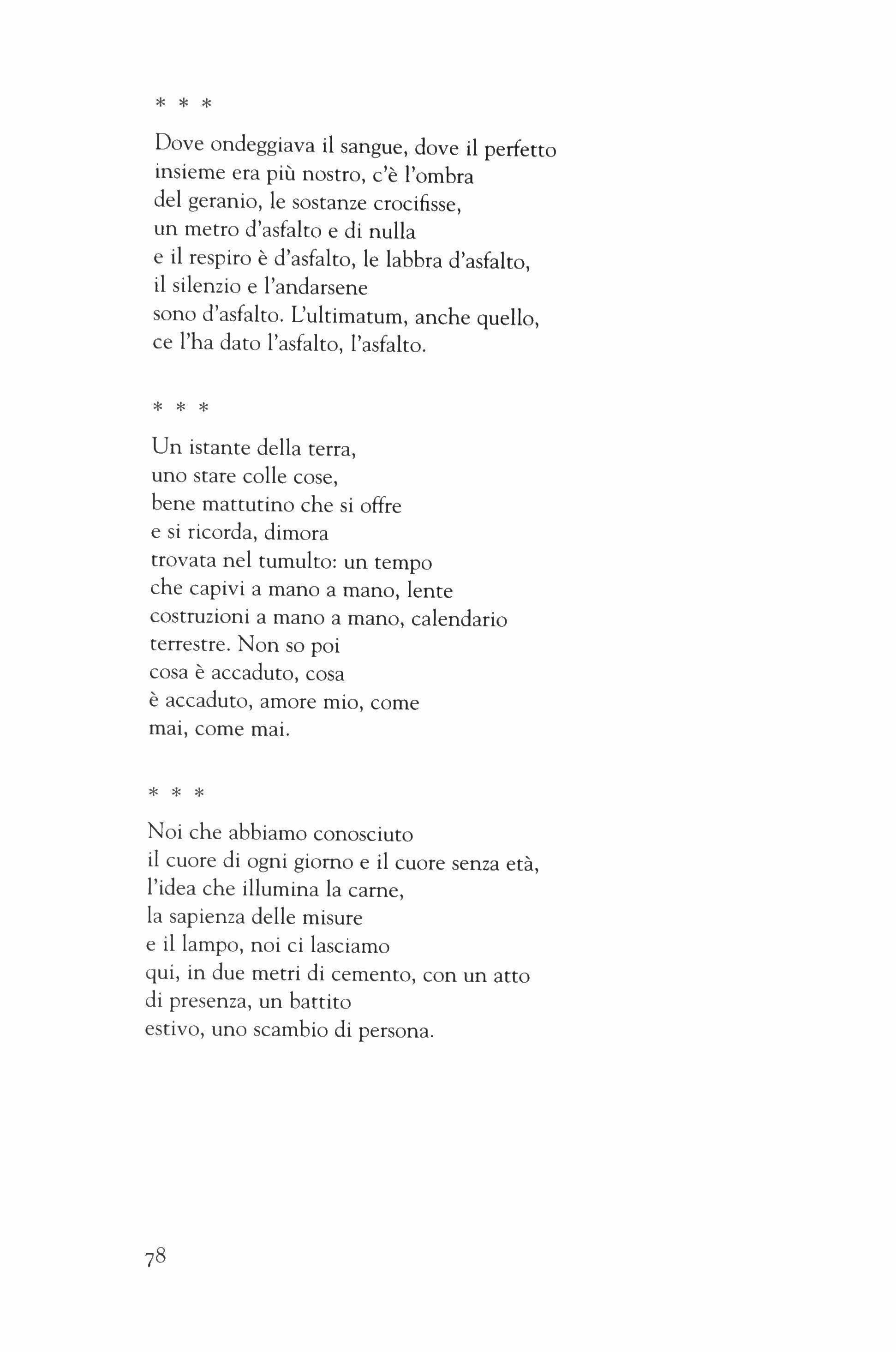
Un istante della terra, uno stare colle cose, bene mattutino che si offre e si ricorda, dimora trovata nel tumulto: un tempo che capivi a mana a mano, lente costruzioni a mana a mano, calendario terrestre. Non so poi cosa e accaduto, cosa e accaduto, amore mio, come mai, come mai. * * *
Noi che abbiamo conosciuto il cuore di ogni giorno e il cuore senza eta, l'idea che illumina la carne, la sapienza delle misure e illampo, noi ci lasciamo qui, in due metri di cemento, con un atto di presenza, un battito estivo, uno scambio di persona.
*
* *
* * *

Where the blood rippled, where our perfect wholeness was most our own, there's the shadow cast by the geranium, things crucified, a meter of asphalt and nothingness and the breath comes from asphalt, the lips come from asphalt, the silence and the parting come from asphalt. The ultimatum, even that, comes from the asphalt, the asphalt.
* * *
An instant of the earth, an ease with things, a morning blessing we offer and remember, a home found in the turmoil: a time that you understood a little at a time, slow constructions a little at a time, an earthly calendar. I don't know what happened then, what happened, my love, and why, and why?
* * *
We who have known the heart of each day and the heart that never ages, the idea that lights up the flesh, the wisdom of measures and the lightning, we leave each other here, in two meters of cement, by showing up, a summer heart-throb, a case of mistaken identity.
* * *
79
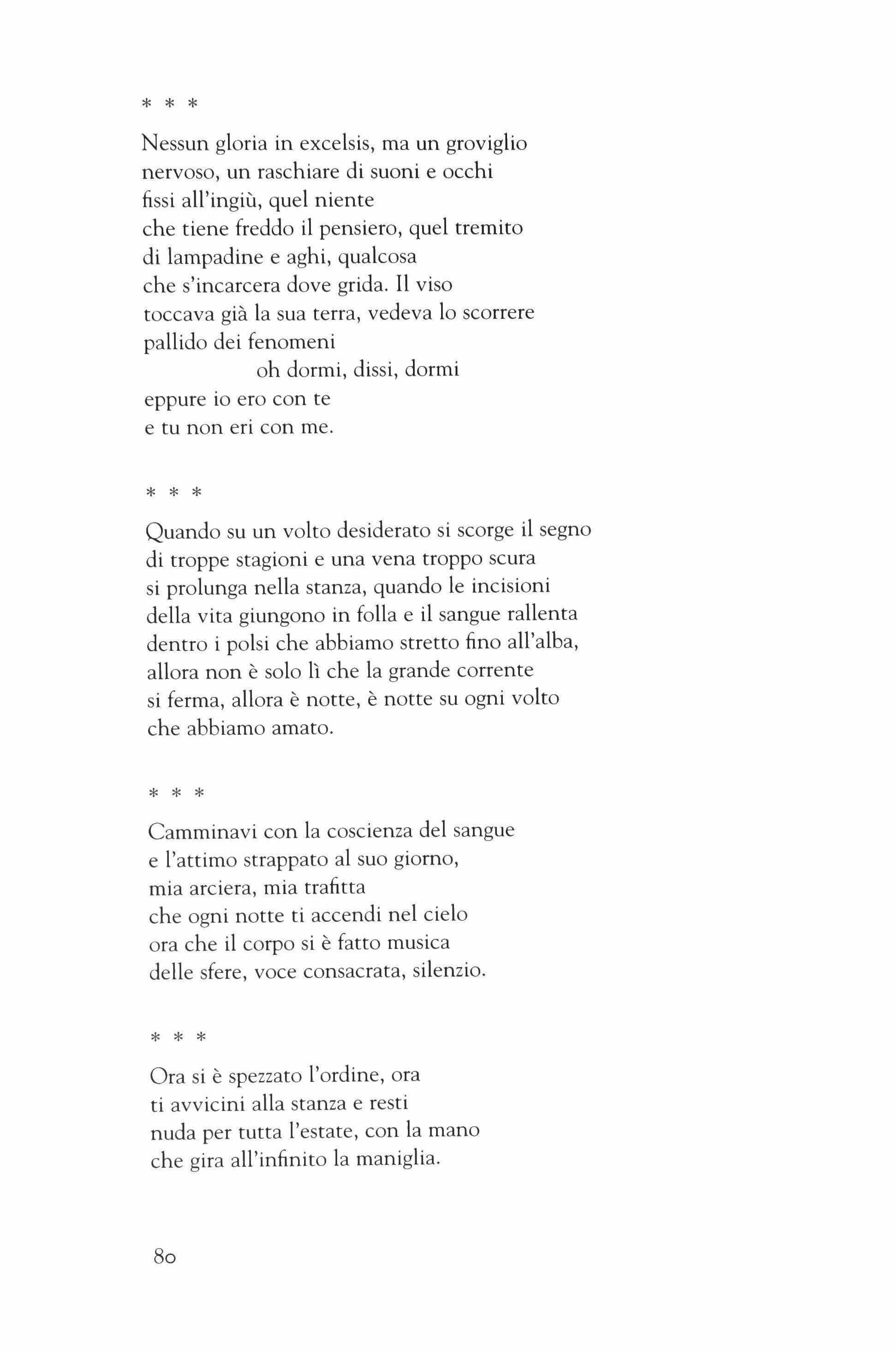
Nessun gloria in excelsis, rna un groviglio nervoso, un raschiare di suoni e occhi fissi all'ingiu, quel niente che tiene freddo il pensiero, quel tremito di lampadine e aghi, qualcosa che s'incarcera dove grida. 11 visa toecava gia la sua terra, vedeva 10 scorrere pallido dei fenomeni oh dormi, dissi, dormi
eppure io ero con te e tu non eri con me.
* * *
Quando su un volto desiderato si scorge il segno di troppe stagioni e una vena troppo scura si prolunga nella stanza, quando le incisioni della vita giungono in folla e il sangue rallenta dentro i polsi che abbiamo stretto fino all'alba, allora non e solo 11 che la grande corrente si ferma, allora e notte, e notte su ogni volto che abbiamo arnato.
* * *
Camminavi con la coscienza del sangue e l'attimo strappato al suo giomo, mia arciera, mia trafitta che ogni notte ti accendi nel cielo ora che il corpo si e fatto musica delle sfere, voce consacrata, silenzio. * * *
Ora si e spezzato l'ordine, ora ti avvicini alla stanza e resti
nuda per tutta l'estate, con la mana che gira all'infinito la maniglia.
* * *
80
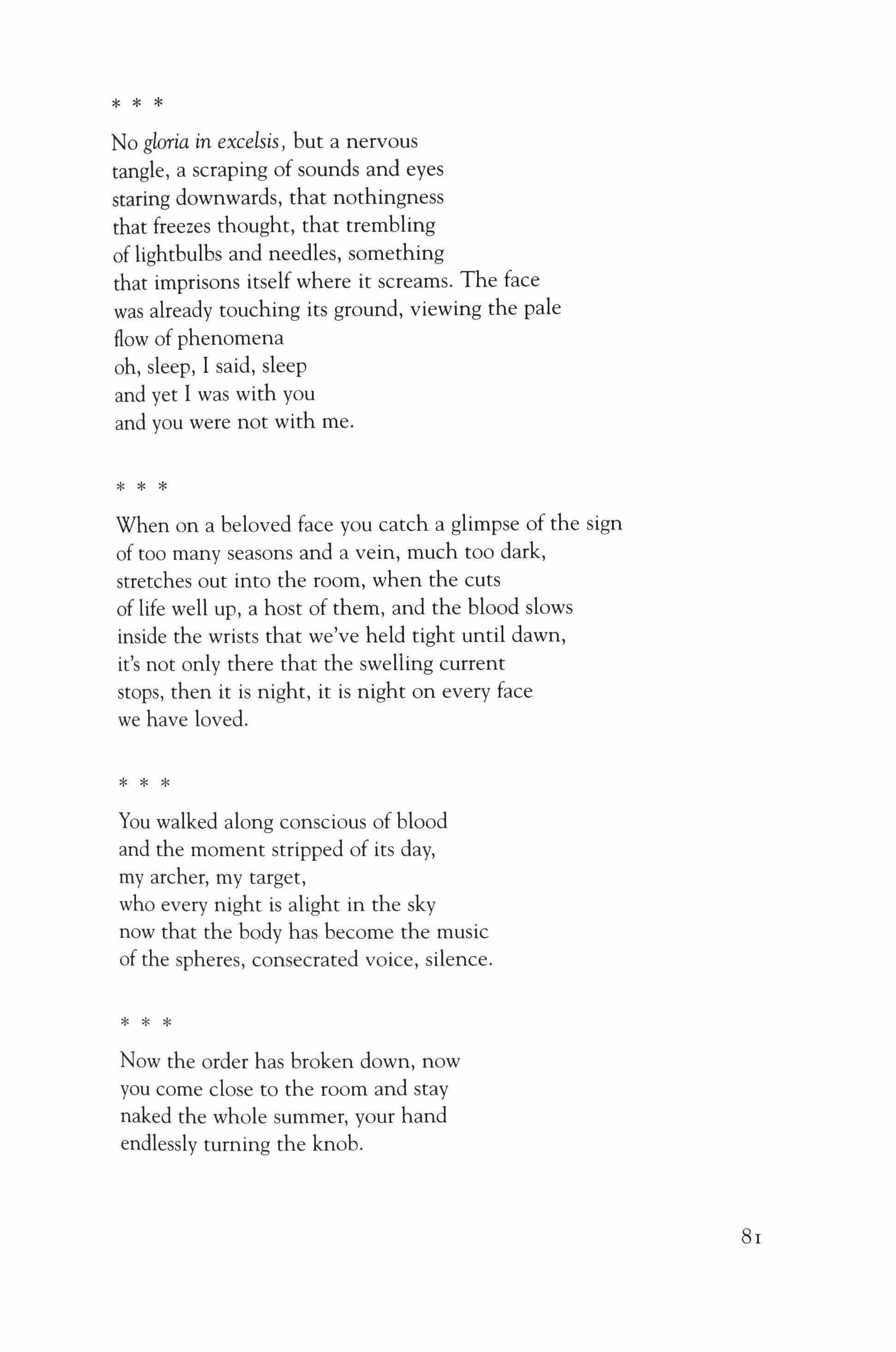
No gloria in excelsis, but a nervous tangle, a scraping of sounds and eyes staring downwards, that nothingness that freezes thought, that trembling of lightbulbs and needles, something that imprisons itself where it screams. The face was already touching its ground, viewing the pale flow of phenomena oh, sleep, I said, sleep and yet I was with you and you were not with me.
* * *
When on a beloved face you catch a glimpse of the sign of too many seasons and a vein, much too dark, stretches out into the room, when the cuts of life well up, a host of them, and the blood slows inside the wrists that we've held tight until dawn, it's not only there that the swelling current stops, then it is night, it is night on every face we have loved.
* * *
You walked along conscious of blood and the moment stripped of its day, my archer, my target, who every night is alight in the sky now that the body has become the music of the spheres, consecrated voice, silence.
* * *
Now the order has broken down, now you come close to the room and stay naked the whole summer, your hand endlessly turning the knob.
*
* *
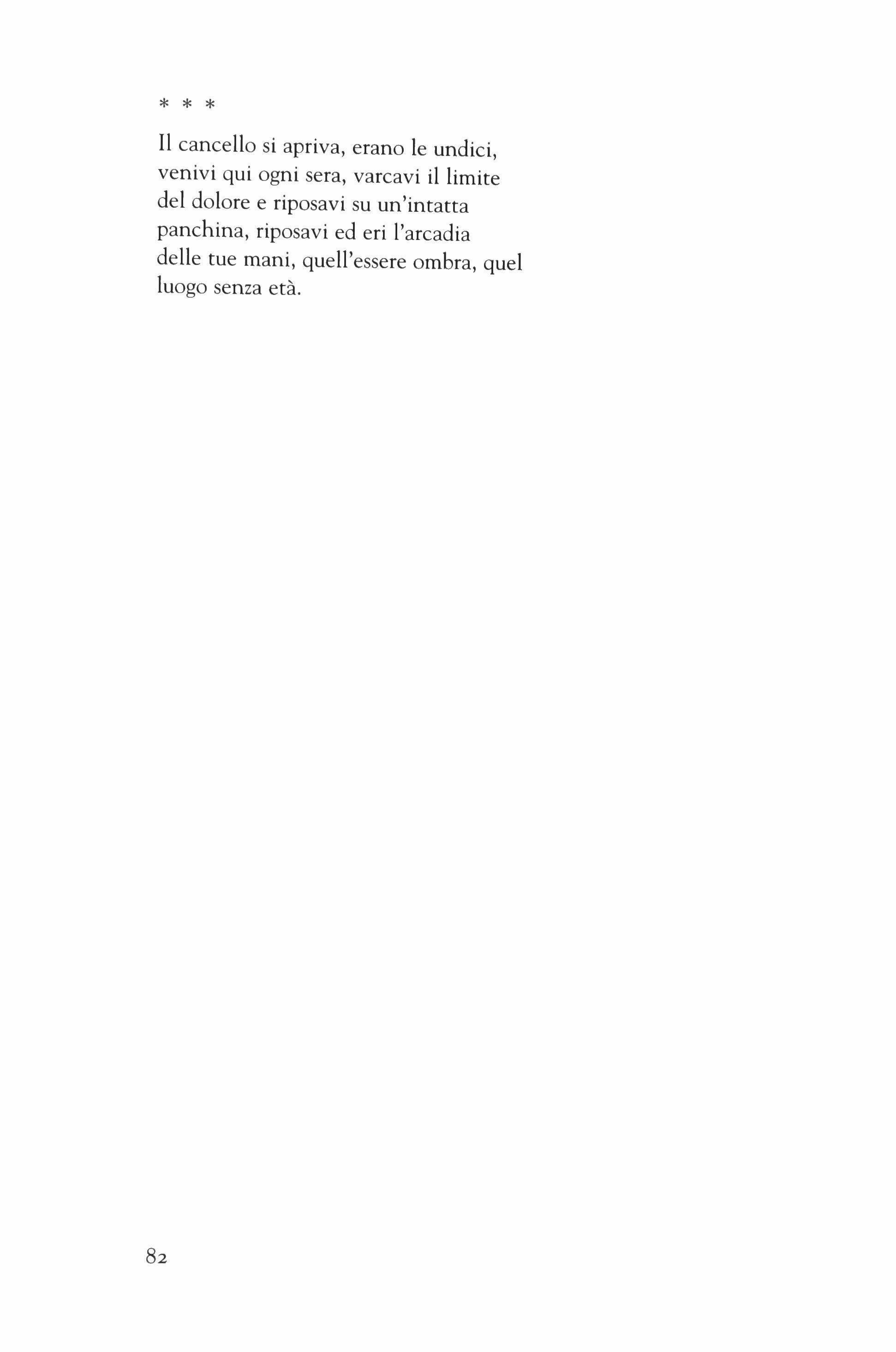
Il cancello si apriva, erano le undid, venivi qui ogni sera, varcavi illimite del dolore e riposavi su un'intatta panchina, riposavi ed eri l'arcadia delle tue mani, quell'essere ombra, quel luogo senza eta.
* * *
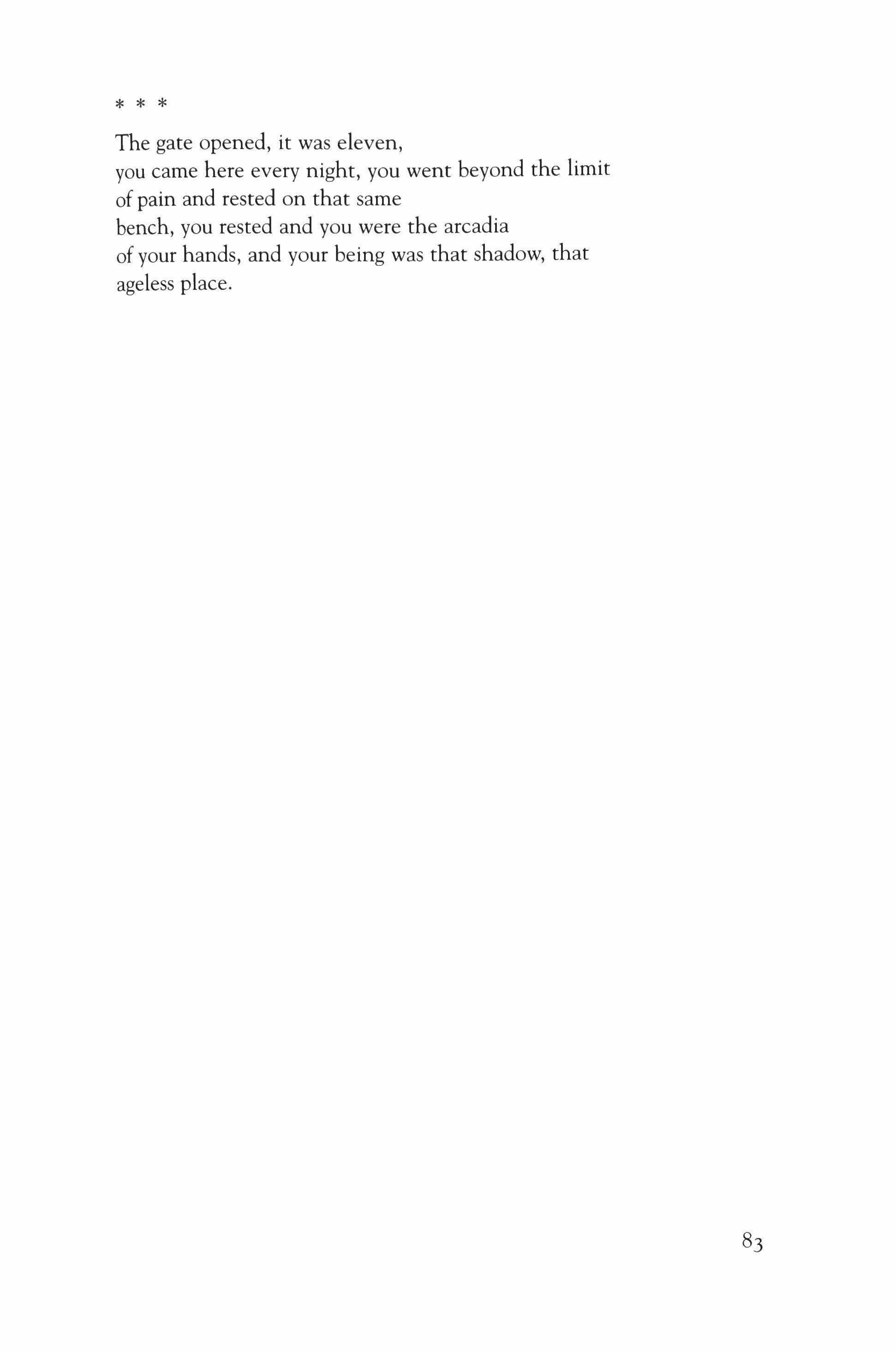
The gate opened, it was eleven, you came here every night, you went beyond the limit of pain and rested on that same bench, you rested and you were the arcadia of your hands, and your being was that shadow, that ageless place.
* * *
Alba Donati
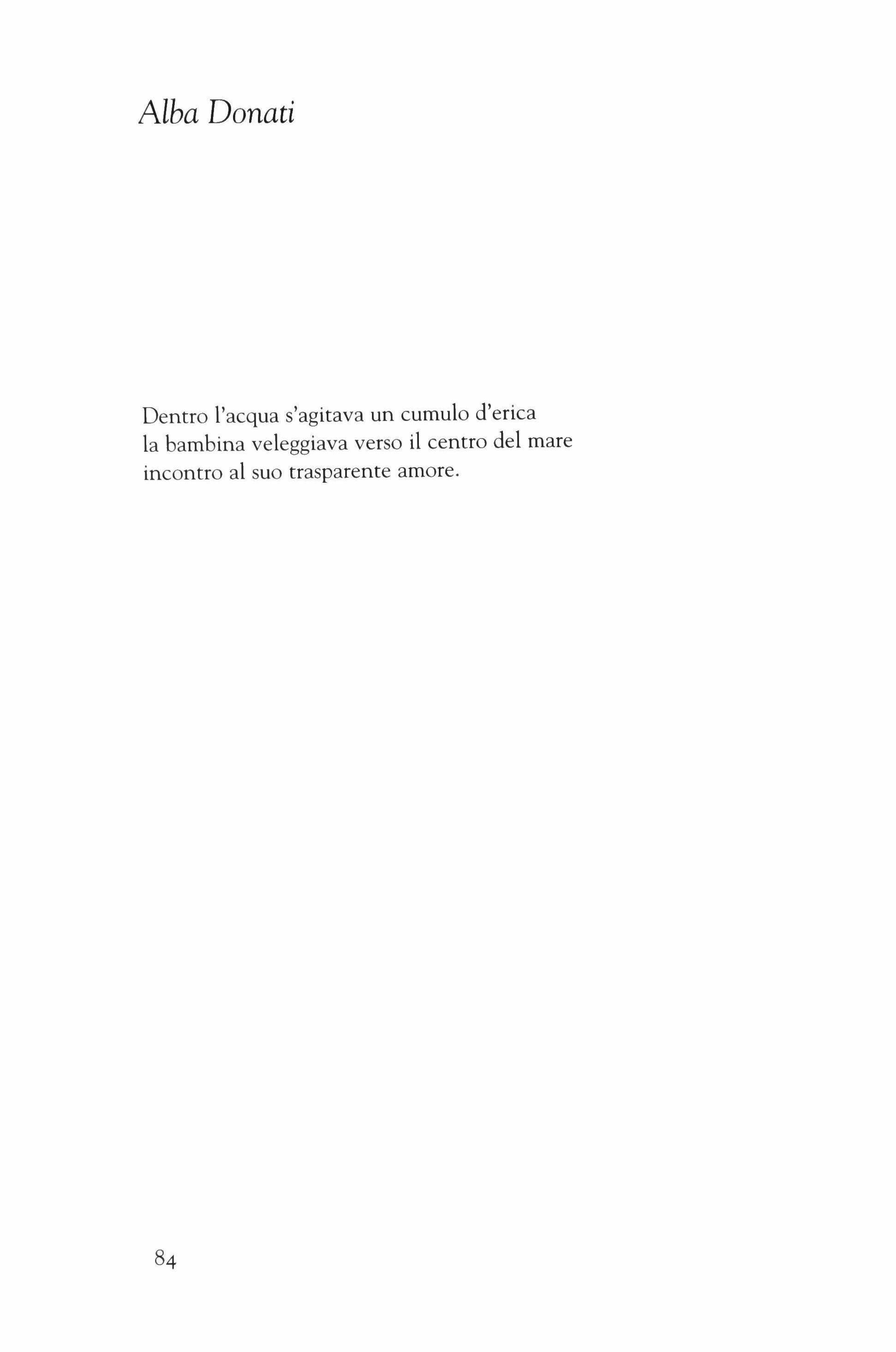
Dentro l'acqua s'agitava un cumulo d'erica la bambina veleggiava verso il centro del mare incontro al suo trasparente amore.
Translated by Robert Pogue Harrison and David Lummus

A bunch of heather was tossing about in the water the girl was sailing toward the center of the sea on course for her transparent love.
85
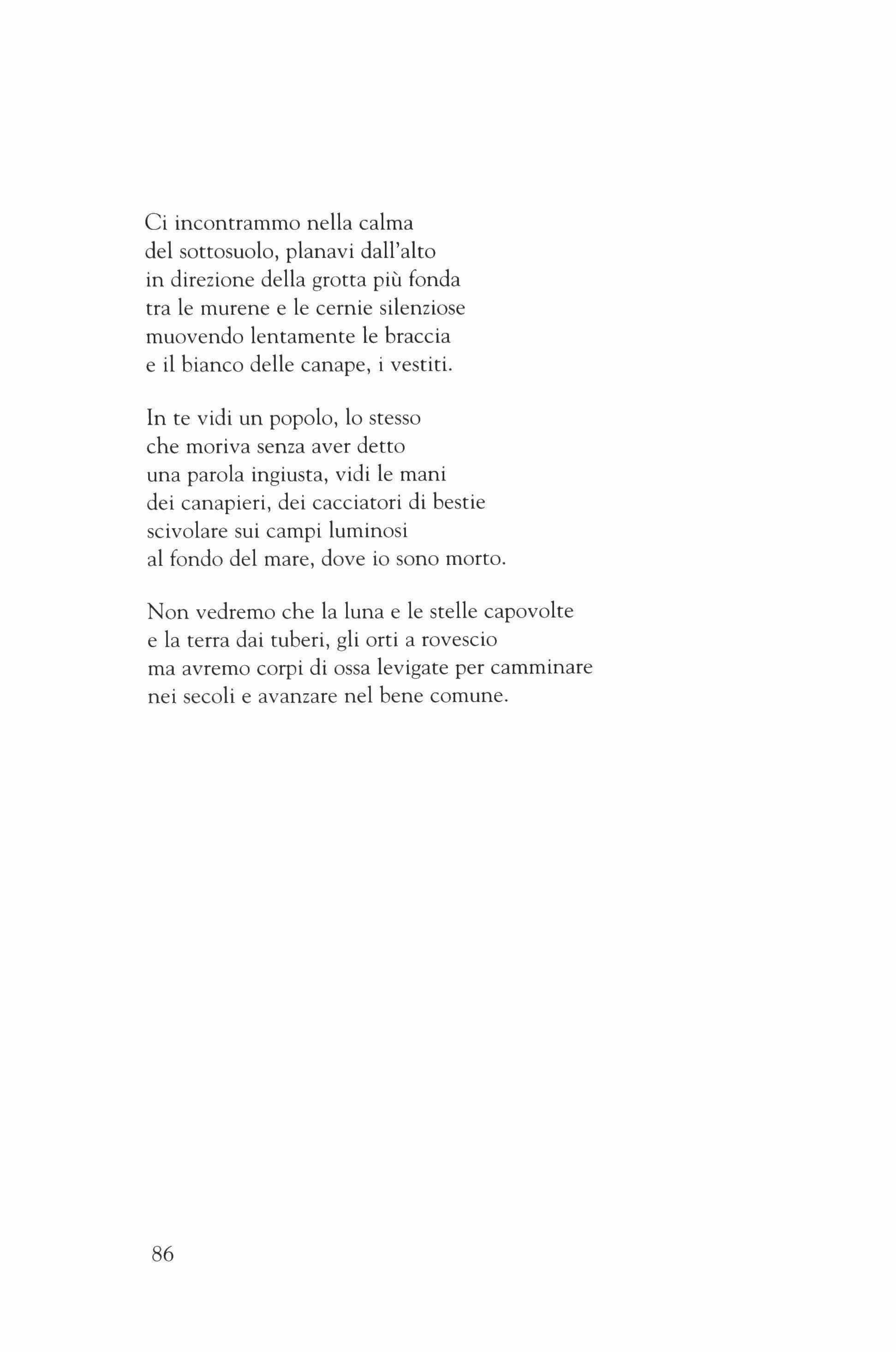
Ci incontrammo nella calma del sottosuolo, planavi dall'alto in direzione della grotta pili fonda tra le murene e le cernie silenziose muovendo lentamente le braccia e i] bianco delle canape, i vestiti.
In te vidi un popolo, 10 stesso che moriva senza aver detto una parola ingiusta, vidi le mani dei canapieri, dei cacciatori di bestie scivolare sui campi luminosi al fondo del mare, dove io sono morto.
Non vedremo che la luna e le stelle capovolte e la terra dai tuberi, gli orti a rovescio ma avremo corpi di ossa levigate per camminare nei secoli e avanzare nel bene comune.
86
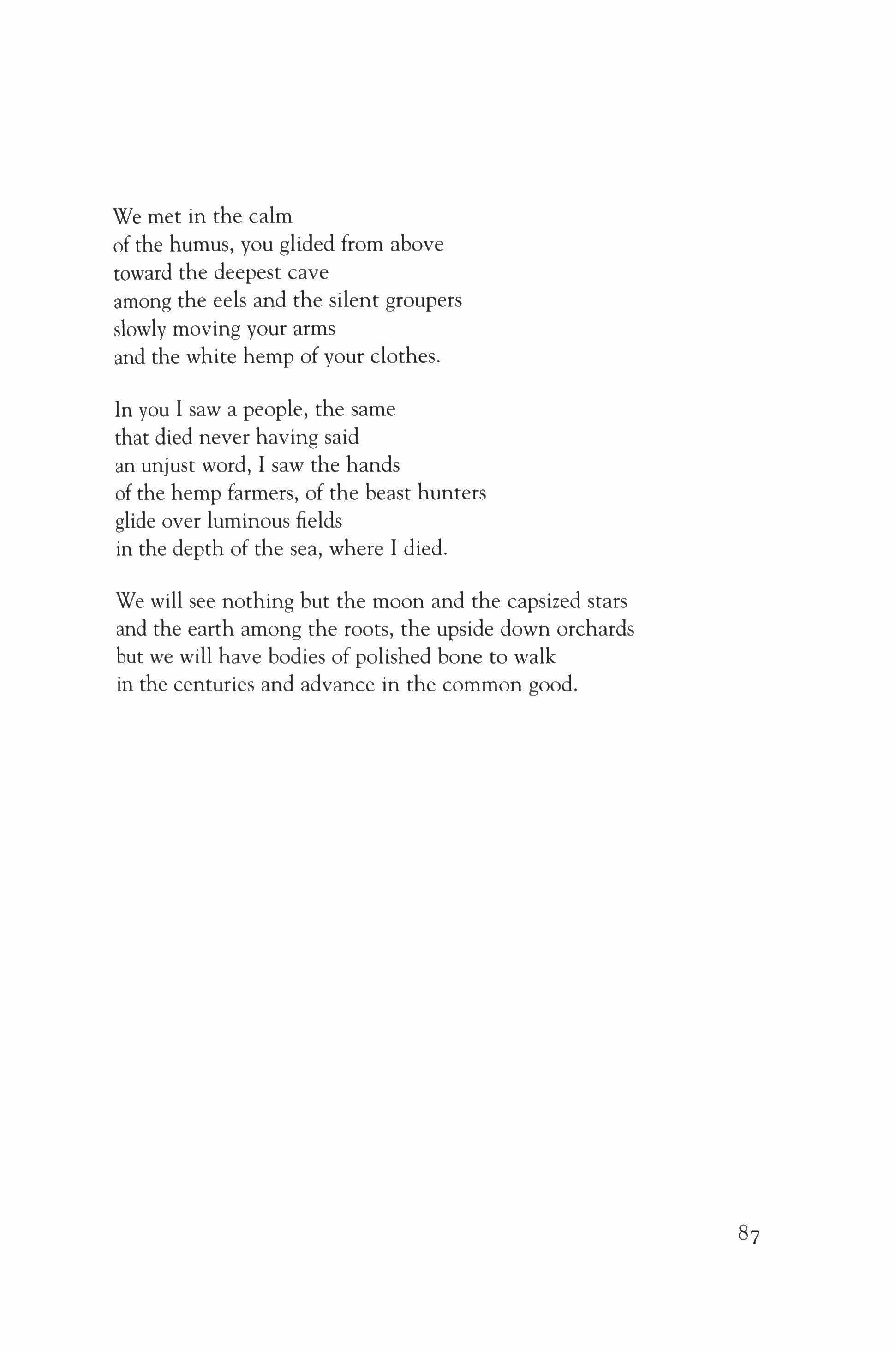
We met in the calm of the humus, you glided from above toward the deepest cave among the eels and the silent groupers slowly moving your arms and the white hemp of your clothes.
In you I saw a people, the same that died never having said an unjust word, I saw the hands of the hemp farmers, of the beast hunters glide over luminous fields in the depth of the sea, where I died.
We will see nothing but the moon and the capsized stars and the earth among the roots, the upside down orchards but we will have bodies of polished bone to walk in the centuries and advance in the common good.

Tutte le volte che torni si inaugura la possibilita meravigliosa dell'amore.
Non chiederrni se amo il tuo corpo qui e ora, se formiamo un paesaggio in questa stare uniti,
Siamo per il momenta giusti per tutti gli altri, che ci useranno per il lora bene.
88

Each time you come back the marvelous possibility of love is born again.
Don't ask me if I love your body here and now, if we make a landscape in this remaining united.
For the moment we are right for all the others who will use us for their own good.

Del rito sacrale m'incanta quel tempo che dopo 1a comunione si fa domestico i1 silenzio fuori delle mattine dornenicali, 10 sbattere del piattino contro il calice, i1 gesto di asciugare, di riporre, di passare gli oggetti, le mani che si toccano per caso, il panno di lino.
E cosl dopo ogni amore, prima dei saluti dovrebbe esserci questo minuto etemo nel quale tu e io ci passiamo i vestiti, ci rimettiamo le scarpe, tiriamo su Ie lenzuola e ci predisponiamo a un saluto sereno.
Ogni messa, 10 sai, finisce in allegria, in scoppi di risate sui gradini e corse a chi fa prima ad arrivare a casa e con quel piacere dentro, lento incontenibile di saperci ancora tutti insieme la prossima domenica.

I am enchanted by that moment of the holy rite when the silence outside, on Sunday mornings, becomes domestic after communion, the clinking of the plate against the cup, the gesture of drying, of putting away, of passing on objects, the hands that chanced touch, the linen towel.
And so after each love, before the goodbyes there should be this eternal minute in which you and I hand each other our clothes, put on our shoes, straighten the sheets and make ourselves ready for a quiet goodbye.
Every mass, you know, ends in happiness, in bursts of laughter on the steps and in races of who can get home first and with that pleasure inside, slow and unrestrainable, of knowing that we'll all be back together next Sunday.
91
Fabrizio Falconi
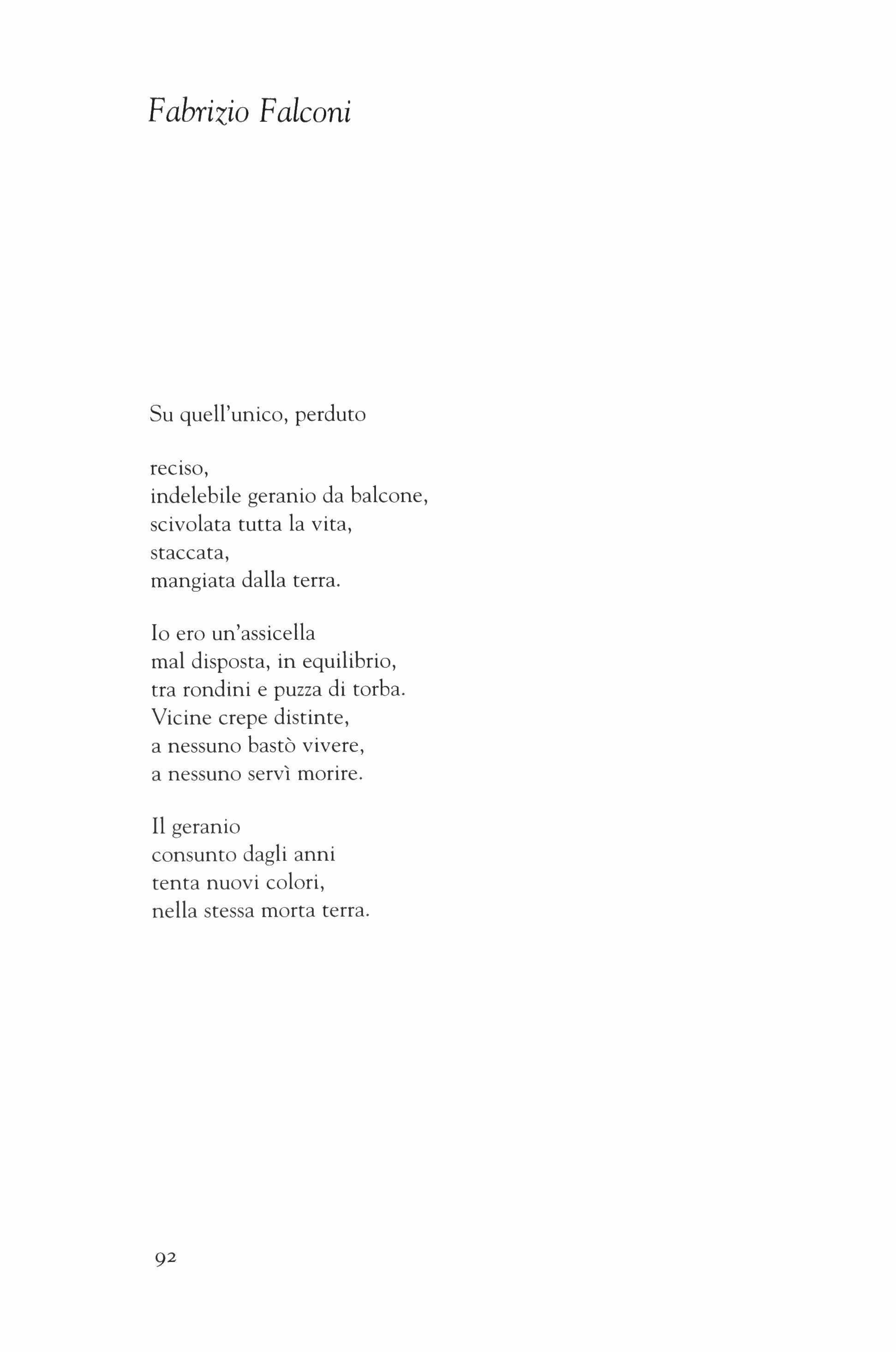
Su quell'unico, perduto
reciso, indelebile geranio da balcone, scivolata tutta la vita, staccata, mangiata dalla terra.
10 ero un'assicella mal disposta, in equilibrio, tra rondini e puzza di torba. Vicine crepe distinte, a nessuno basta vivere, a nessuno servt morire.
Il geranio consunto dagli anni tenta nuovi colori, nella stessa morta terra.
92
Translated by David Lummus

Over that unique, lost trimmed, indelible balcony geranium, slipped all of life, detached, eaten by the earth.
I was a shingle out of place, balanced between swallows and the reek of compost. Nearby cracks come into focus, it was not enough to live, it was of no use to die.
The geranium consumed by the years attempts new colors in the same dead earth.
93

Come scende la sera qui, mi chiedi contando le mosche bloccate dal temporale: scende come fune, come acrobata dai piedi d'oro, scende.
94
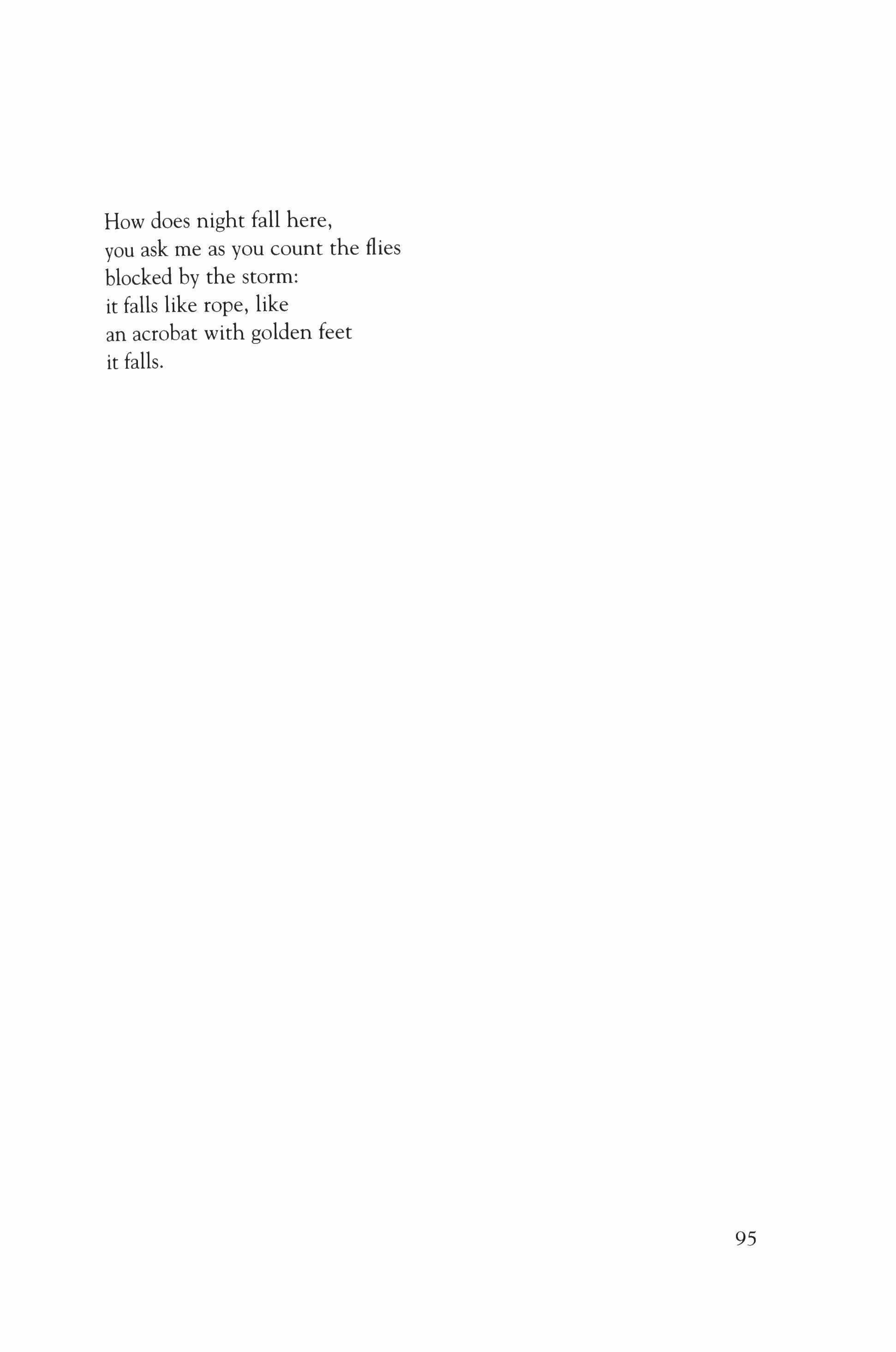
How does night fall here, you ask me as you count the flies blocked by the storm: it falls like rope, like an acrobat with golden feet it falls.
95
Zavorra
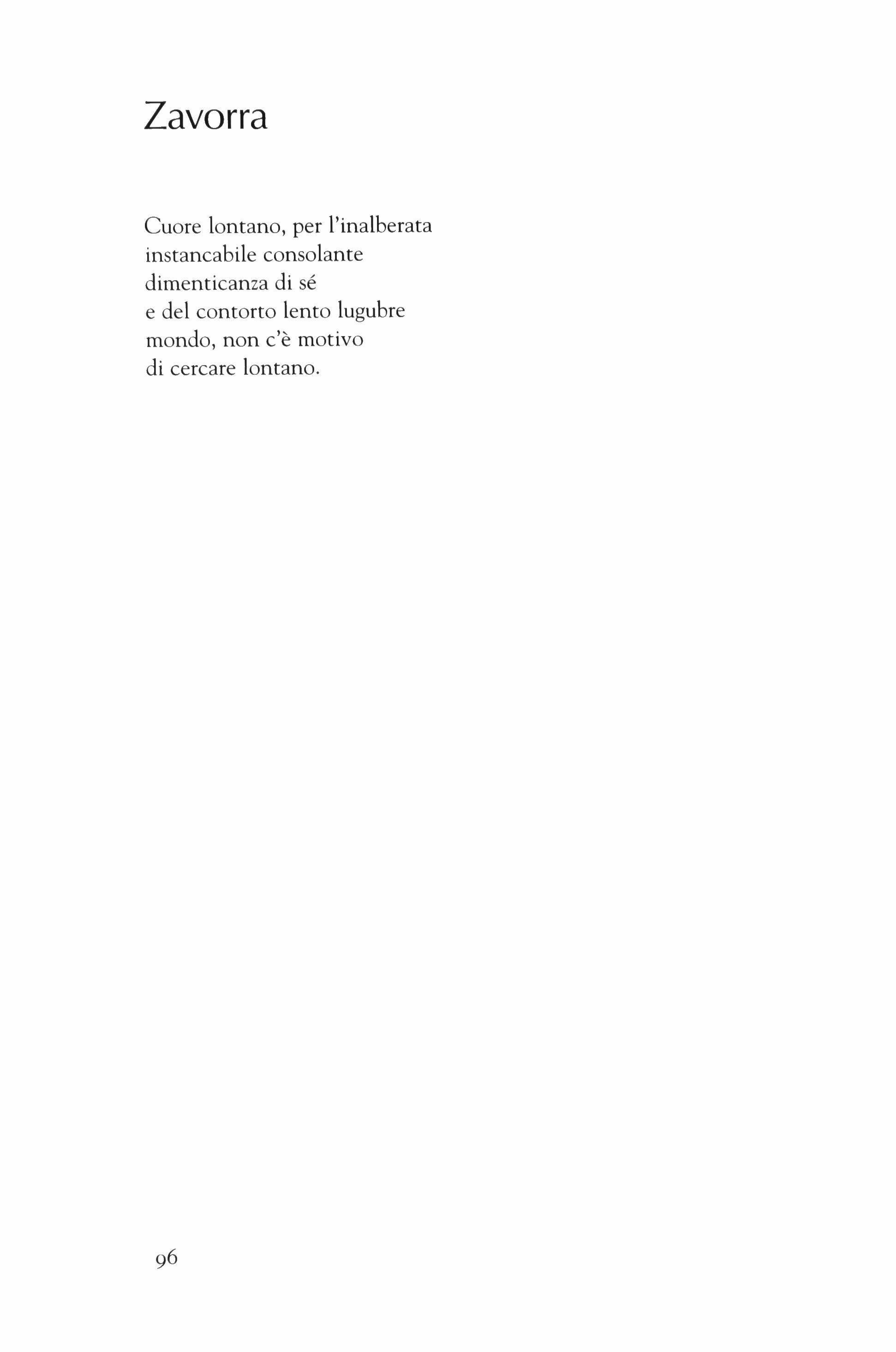
Cuore lontano, per l'inalberata instancabile consolante dimenticanza di se e del contorto lento lugubre mondo, non c'e motivo di cercare lontano.
Ballast

Far away heart, through the hoisted untiring consoling forgetfulness of self and of the contorted slow lugubrious world, there is no reason to search far and wide.
97
Relitto

Naufraghi affamati esausti
camminano, giacciono adesso al termine di scorrerie, smarrite le perle, le vele bruciano nel trepido
vespro di tropici le carte contese, gli accordi.
Wreckage

Famished exhausted shipwrecked survivors walk, now lie at the end of their raids, the pearls are lost, the sails burning in the trepid tropics of evening the contested maps, the agreements.
99

Fuori dalla citra morta
il mare calmo innaturale sembra un campo verde di settembre, lucente, lontano faticano le onde controvento, tutto cambia, e tempo nemmeno un volto uguale a ieri, tutto finisce e ricomincia il mare stesso desiste, toma indietro.
100

Outside the dead city the calm unnatural sea seems a green field in September, far off and bright the waves toll against the wind, everything changes, it is time no face is the same as yesterday, everything ends and starts up again the sea desists, returns on itself.
101

Sono io che non ti cerco
o tu a non mostrarti
sono io che scavo nel punto sbagliato
o tu a nasconderti nell'umida terra sconfinata.
Sono io a non chiederti
o tu a non rispondere
sono io a perdermi
o tu a fuggire.
Sono semplicemente io al punto di sempre
o tu a muoverti senza scopo come una bestia in gabbia.
102

I'm the one who doesn't look for you or you're the one who doesn't show yourself I'm the one who digs in the wrong place or you're the one who hides in the damp boundless earth.
I'm the one who doesn't ask you or you're the one who doesn't respond I'm the one who gets lost or you're the one who runs away. It's simply me in the same place as always or it's you moving aimlessly like a beast in a cage.
103
Roberto Gigliucci

Poemetto
facile degli alberghi
C'e un albergo col cortile che puzza, un albergo che si apre su una strada stretta, quasi un vicolo, e ha un ingresso tutto correnti d'aria, dove e sempre freddo, anche d'estate, scale buie verdi, stanze modeste, non troppo pulite, con armadi ingombranti e vasche da bagno altrettanto maestose e inutili. Al numero trentaquattro s'e ammazzato un giovanotto, uno scrittore, un poeta, non so bene, potete chiedere all'albergatore che pen) non gradisce assai parlame
La camera del suicida e piccola, anche perche - come gia detto - i mobili sono eccessivi, invadenti, e la finestra da sul cortile suddetto che puzza, un ristagno di poca luce e molti odori che vengon su dal basso lentamente, mischiandosi, aromi di pessima cucina e lezzo d'animali morti, di stracci putri, di muffa, di ipogei, di legno molle, di bestie vive in calore, gatti, sorci, di spettri marciti, di anime sudate.
La camera del suicida, il poeta, voglio chiamarlo cost, il poeta, perche il giovanotto, un bel giovanotto in vero, scriveva poesie e su una rivista strana ne aveva anche pubblicate, piuttosto ben scritte, aveva stoffa, cioe,
104
Translated by Chris King and Leonard Barkan

Easy Poem about Hotels
There's a hotel with a courtyard that stinks, a hotel that opens out to a narrow street, almost an alley, and its lobby a tunnel of wind, never gets warm not even in summer, staircases green, the rooms modest, not too clean with big tall wardrobes and a bathtub equally majestic and useless. In Room 34 a young man killed himself, a writer, a poet, I'm not sure, you could ask the hotelkeeper but he doesn't like talking about it too much The suicide's room is small also because-as I have said-the furniture is overblown and invasive, and the window faces the courtyard that stinks, a stagnant pool of scrawny light and odors which come up from below slowly miscegenating, ugly odors of cooking and animal corpses, smelly rags, underfoot rot, soft wood, live animals in heat, cats, mice, rotted ghosts, sweaty souls.
The suicide's room-the poetthat's what I want to call him, the poet, because the young man, the handsome young man, did, in fact, write poetry, in some little magazine he'd even published a bit, rather well written, they had substance, even
105

sebbene oltremodo tristi, quando non macabre addirittura; la camera del poeta, dicevo, era, ed e, angusta, rna non disperatamente malinconica, come amereste pensare, S1 dolcemente ombrosa e romantica, con un dipinto raffigurante frutta e, sopra illetto, una madonna bizantina rna tenera. Un cocomero spaccato parrebbe quasi allegro, co� l'uva e molte api, e la saletta da bagno minuscola con la spropositata barcaccia della vasca potrebbe anche commuovere, se non Fosse che ci s'e ammazzato dentro il poeta, il bel poeta giovanotto che evidentemente non sapeva che farsene della sua giovinezza, ne delle sue belle mani ne della barba di ventenne ne, insomma, di tutto intero il suo corpo spietatamente giovane, un dono caduco rna prezioso e spavaldo che egli non ha voluto offrire a nessuno. Si e tolto la vita coi sonniferi, in un bagno caldo dove e pure affogato, poveretto, una volta persi i sensi; non era nudo, aveva indosso mutande e camicia e una catena d'oro al collo e l'orologio subacqueo (non fate ironia ). Oggi e una bella giomata d'invemo e voglio condurvi in una pensione economica rna graziosa, gia quasi in periferia, difronte a un semplice parco con pini e persino una palma, dove il sole tramonta dietro un colle che pare emblema di una gioia infelice, di una piccola ascesi un po' sofferta, un yolo per vecchi signori serali e per cani sfortunati e bambini muti. La pensione ha nome Aurora, nonostante la sua posizione difronte al tramonto. Ne e proprietaria una giovane donna
106

if they were exceedingly sad, when not positively gruesome. The poet's room, as 1 was saying, was, and is, narrow, but not savagely melancholic as you might like to think, so sweetly shadowy and romantic, with a painting depicting fruit, and, above the bed, a madonna in the Byzantine style, but tender. A watermelon split in two might seem almost jolly, with grapes and bees, and the tiny bathroom with that improbable barge of a tub could even seem touching, if only the poet hadn't killed himself in it, the handsome young guy, this poet who obviously didn't know what to do with all his youth, his beautiful hands, his beard of a man at twenty, his whole body mercilessly young, a passing gift, precious and defiant, that he refused to give to anyone. He took his life with sleeping pills, in a hot bath where he also drowned, poor guy, once he had lost his senses; he wasn't naked, he'd put on underpants and a shirt and a gold chain around his neck and a waterproof watch (never mind the irony ).
It's a beautiful winter's day and I want to take you to a pensione, economical but gracious, somewhat away from the city, facing a simple park with pines and maybe a palm tree, where the sun sets behind a hill that seems like an emblem of unlucky joy, some small suffering mystic penitence, a flight for old nighttime gentlemen, for hard luck dogs and mute infants. The pension is called Aurora despite its position facing the sunset. The proprietor is a young woman
107

dall'accento straniero, mezzo inglese, mezzo tedesco, chissa, con due perenni occhiaie violette, molto cortese, felicissima di raccontarvi a lungo dell'uorno che si e ucciso in vestaglia su] terrazzo della stanza diciotto, un terrazzo sospeso davanti al parco che suburbano verdeggia, come detto. Un terrazzo neppure tanto angusto, quindici metri quadri, senza piante di sorta, nudo ma bello e arioso, con un tavolo e una poltrona di vimini
e un cuscino con dipinte rose a mano. L'uomo in vestaglia avra avuto cinquanta anni e una borsa in pelle da lavoro, piena di stampati, moduli, quaderni, penne, scatoline di alluminio con sigari e sigarette e poi calze nuove, alcune bianche, alcune scure, eccetera, insomma. Si e sparato sul terrazzo, a mezzogiorno circa, stanco della sua capigliatura ancora folta tutta argentea e magnifica, stanco della vestaglia e della borsa. Aveva ai piedi non pantofole ma scarpe nere, quasi eleganti, senza calzini (eppure ne aveva acquistati di recente) e le ginocchia nude ferite, quasi fosse caduto in ginocchio sui rovi 0 sui sassi o sulle spine dei propri acuti pensieri nel lago spinoso delle arnaritudini. Ha esploso il suo colpo a mezzogiorno e qualche vecchia avra rimesso l'orologio. Andiamo via, allontaniamoci rnolto, perche voglio mostrarvi un hotel elegante, proprio sulla piazza di un paese illustre con una bella cattedrale e un bel caffe e una bella fontana. Si tratta del migliore albergo del paese, a quattro stelle, di recente costruzione, con un salone
108

with a strange accent, half English half German (who knows), with two permanent rings under her eyes always violet, very polite, delighted to tell you at length the story of the man who killed himself in his dressing gown on the terrace of Room 18, a terrace suspended in front of the park with the green glow of the suburban, as the poet said. Not a narrow terrace, fifteen meters square, without plants, naked but nice and airy with a table and an easy wicker chair and pillows with hand-painted roses. The man in his dressing gown must have been fifty, had a leather attache case full of papers, forms, reports, pens, little aluminum tins with cigarettes and cigars and some new socks, some white, some black, that sort of thing. He shot himself on the terrace around noontime, tired of his great shock of hair so silver and magnificent, sick of the dressing gown and the attache case. He had on his feet not slippers but shoes, black, almost elegant, with no socks (even though he had just acquired some) and his naked knees were wounded, as though he had fallen to his knees on brambles or stones or the thorns of his own thoughts wading in the thorny lake of bitterness. He blew himself away at noon. Some old lady probably reset her clock. Let's get out of here, let's get very far away, because I want you to see this elegant hotel, right on the main square of a celebrated town with a beautiful cathedral and a cute little cafe and a really pretty fountain. We're talking about the best hotel in town, man, four stars, recently built, enviable
I09

invidiabile, tutto verde di piante e un bar di marmi, mogano e specchi e camerieri eleganti e pure un lift rosso fiammante, un bel ragazzo anche se di bassa statura e con occhi bovini. E bello parlare con lui, fra un piano e l'altro, e ascoltarlo narrare, giovane un po' crudele, della signora che s'e tagliata le vene nel cesso della camera quarantanove. Una signora per niente bella rna fine, coi soldi e uno sguardo pesante infelice, da grattarsi i coglioni, dice lui, rna esagera per sembrare insensibile e virile; una signora sola, in una estrema vacanza e in una bolla di vuoto definitivo, disperatamente ingioiellata, inutile nella sua eleganza da moribonda, da mummia nobile e solitaria (traduco le parole del lift in una lingua poetica).
La signora con una lametta ha segato le proprie vene, poi l'ha ingoiata, la lametta, dopo averla spezzata; l'ascensorista giovane muove le grosse mani, gesticola, mentre parla, non sta mai fermo, quando sorride e la vita stessa a sorridere, la vita calda piena di sangue e fibre che parla di morte e di sangue effuso marcio. 10 credo che la signora corteggiasse il giovanotto brutalmente allegro, egli almeno me 10 lascia intuire, una corte leggiadra e funebre, sguardi, sorrisi, ancora sguardi, vento intorno a una torre, mazzi di fiori petali sparsi ai piedi, pensieri di rose, che belli suI monte i piedi del messaggero! (porta, credo, il quarantatre).
La signora ha lasciato un foglio con alcune ultime parole: Ho vissuto poco, neppure settant'anni, muoio giovane e mi sento egoista
110

lobby, all green with plants and a marble bar with mahogany and mirrors elegant waiters and a liftboy with flame red hair, a handsome boy even if a bit short and cow-eyed. It's great talking to him, going from floor to floor, hearing him, young and a little cruel, tell the story of the lady who slashed her veins in the toilet of Room 49. A lady unlovely but refined, with money and a heavy unhappy face, face enough to make you scratch your balls, he said, but he exaggerates to seem callous and virile; a lady alone on a final vacation in a bubble of ultimate emptiness, desperately bejewelled, useless in the elegance of the moribund, like a solitary noble mummy (I translate the words of the liftboy into poetic language). With a razor blade the lady sliced her veins, then managed to swallow the blade after breaking it in half; the liftboy swings his big boy hands, frantic while speaking, he never stands still, when he smiles it is life itself that smiles hot life full of blood and fiber which speaks of death and rotted blood shed. I believe that the lady was flirting with this brutally cheerful boy, at least he suggested that, their courtship graceful and funereal, glances, smiles, glances, wind surrounding towers, bunches of flowers, petals strewn at the feet, imaginings of roses, how beautiful on the mountain are the feet of the messenger! (I believe he wears Size Eleven Double E). The lady left a note with a few last words: I have lived little, not even seventy years, I die young, and I feel selfish because 1've never given anything to anyone,
I I I
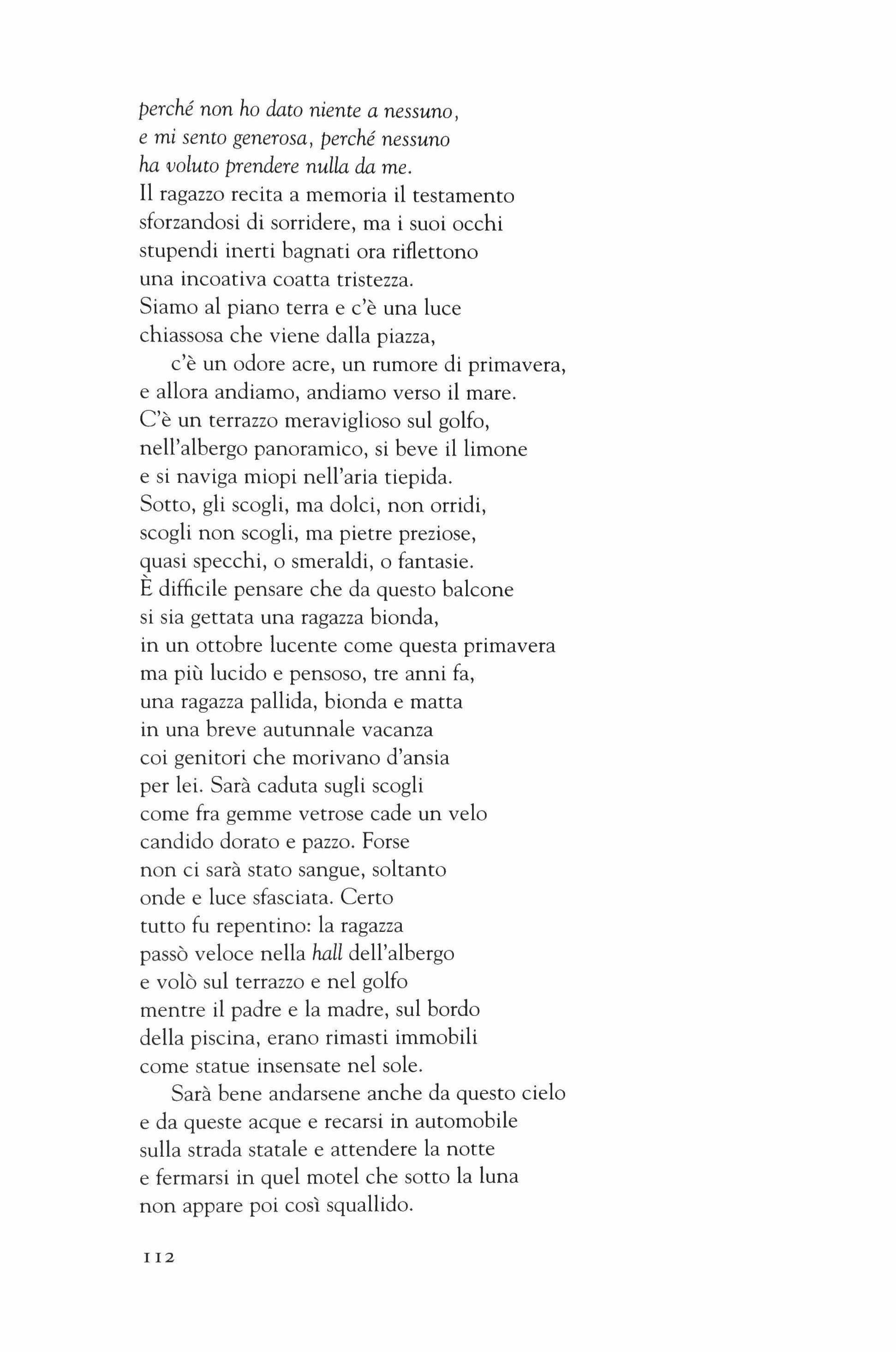
perche non ho dato niente a nessuno, e mi sento generosa, perche nessuno ha voluto prendere nulla da me.
n ragazzo recita a memoria il testamento sforzandosi di sorridere, ma i suoi occhi stupendi inerti bagnati ora riflettono una incoativa coatta tristezza.
Siamo al piano terra e c'e una luce chiassosa che viene dalla piazza, c'e un odore acre, un rumore di primavera, e allora andiamo, andiamo verso il mare.
C'e un terrazzo meraviglioso su] golfo, nell'albergo panoramico, si beve illimone e si naviga miopi nell'aria tiepida.
Sotto, gli scogli, ma dolci, non orridi, scogli non scogli, ma pietre preziose, quasi specchi, 0 smeraldi, 0 fantasie. E difficile pensare che da questa balcone si sia gettata una ragazza bionda, in un ottobre lucente come questa primavera ma pili lucido e pensoso, tre anni fa, una ragazza pallida, bionda e matta in una breve autunnale vacanza coi genitori che morivano d'ansia per lei. Sara caduta sugli scogli come fra gemme vetrose cade un velo candido dorato e pazzo. Forse
non ci sara stato sangue, soltanto onde e luce sfasciata. Certo tutto fu repentino: la ragazza passe veloce nella hall dell'albergo e vola sul terrazzo e nel golfo mentre il padre e la madre, sul bordo della piscina, erano rimasti immobili come statue insensate nel sole.
Sara bene andarsene anche da questa cielo e da queste acque e recarsi in automobile sulla strada statale e attendere la notte e fermarsi in quel motel che SOttO la luna non appare poi COSt squallido.
112
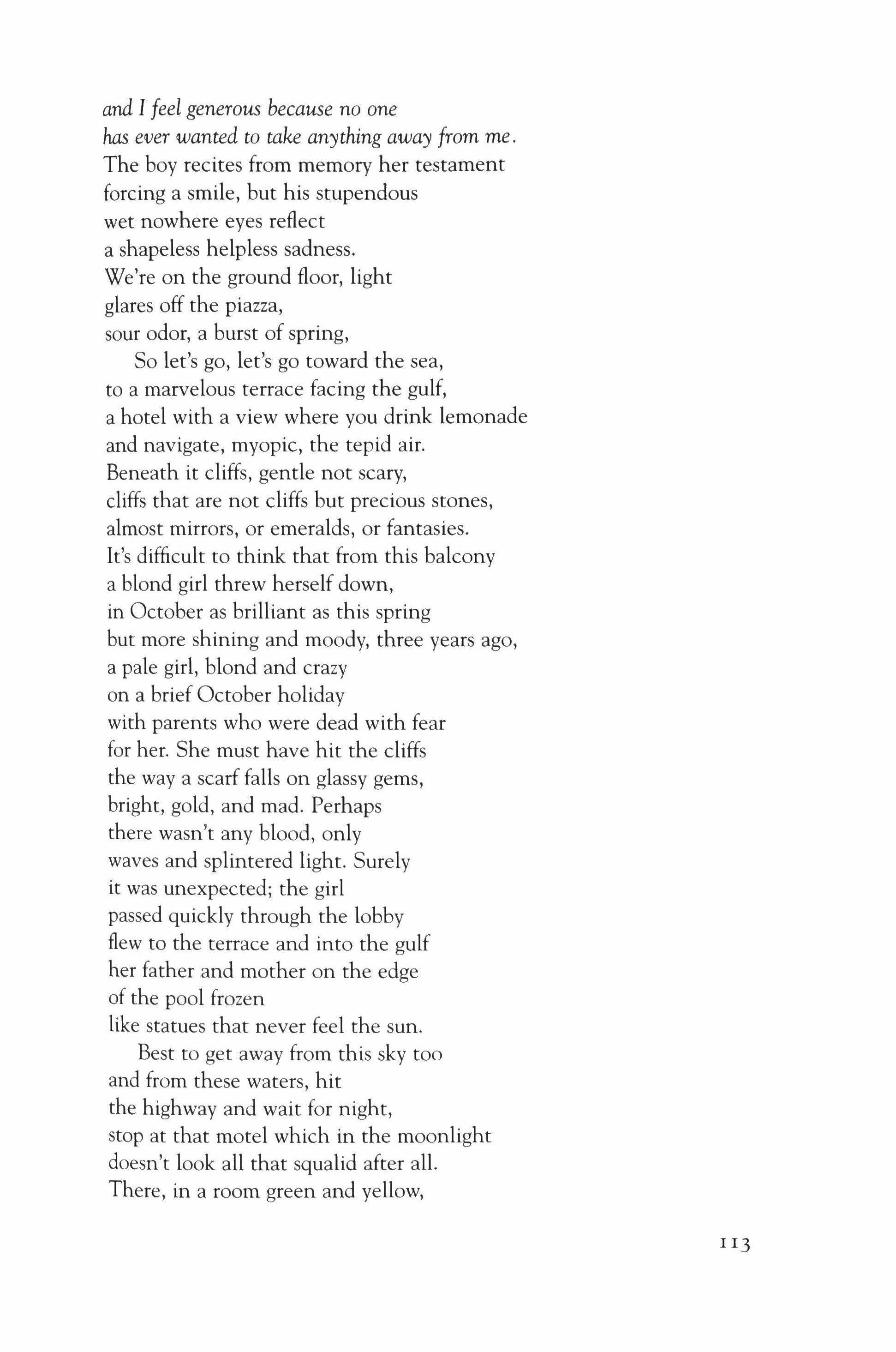
and I feel generous because no one has ever wanted to take anything away from me. The boy recites from memory her testament forcing a smile, but his stupendous wet nowhere eyes reflect a shapeless helpless sadness. We're on the ground floor, light glares off the piazza, sour odor, a burst of spring,
So let's go, let's go toward the sea, to a marvelous terrace facing the gulf, a hotel with a view where you drink lemonade and navigate, myopic, the tepid air. Beneath it cliffs, gentle not scary, cliffs that are not cliffs but precious stones, almost mirrors, or emeralds, or fantasies. It's difficult to think that from this balcony a blond girl threw herself down, in October as brilliant as this spring but more shining and moody, three years ago, a pale girl, blond and crazy on a brief October holiday with parents who were dead with fear for her. She must have hit the cliffs the way a scarf falls on glassy gems, bright, gold, and mad. Perhaps there wasn't any blood, only waves and splintered light. Surely it was unexpected; the girl passed quickly through the lobby flew to the terrace and into the gulf her father and mother on the edge of the pool frozen like statues that never feel the sun.
Best to get away from this sky too and from these waters, hit the highway and wait for night, stop at that motel which in the moonlight doesn't look all that squalid after all. There, in a room green and yellow,
II3

La, in una camera gialla e verde, con lampade morbide, e pure la televisione, frigobar e la toilette chiara spaziosa, insensibili alla speranza e forse all'eros un ragazzo e una ragazza hanno lasciato le loro vite ingozzandosi di pillole, avvolti in una coperta gialla di lana, dopo aver bevuto vino cattivo e mischiato lacrime dolci in un bicchiere, dopo aver cantata insieme molte canzoni, senza la chitarra rna con buona intonazione, meravigliosa creatura, piu bella cosa non c'e, appena maggiorenni, incomprensibili, forse divini, forse cari al cielo, non so, magari aerei e trasforrnati in stelle, per me agghiacciati spreconi di bellezza, di came, amore, sensi e sentimenti, peccatori incalliti contro la giovinezza. Ecco, finisce che divento retorico, e allora e meglio ricoverare alla Pensione Regina, mediocre ostello di relitti, dove in un lago di merda e di demenza s'e impiccato un vecchio pittore. Macchiava le sue tele coi colori
e con la salsa di pomodoro e l'inchiostro, ci gettava sopra il caffe e il vino, ci pisciava sopra anche, spesso; viveva come un pitocco, sudicia ombra di artista, e l'avevano sfrattato infine: trove una stanza alla Pensione Regina e decise di chiudervi la sua esistenza, terminare tutto alla stanza ventuno. Era odioso, sporco, rabbioso: nessuno 10 piangera: tocchera insomrna a me piangerlo, di contraggenio. Aveva con se l'ultima tela, su cui sputava, su cui cagava e su cui vomito due volte: vi dipinse anche col dentifricio e con gocce di sangue dalle gengive. Quando gli dissero d'andarsene
114
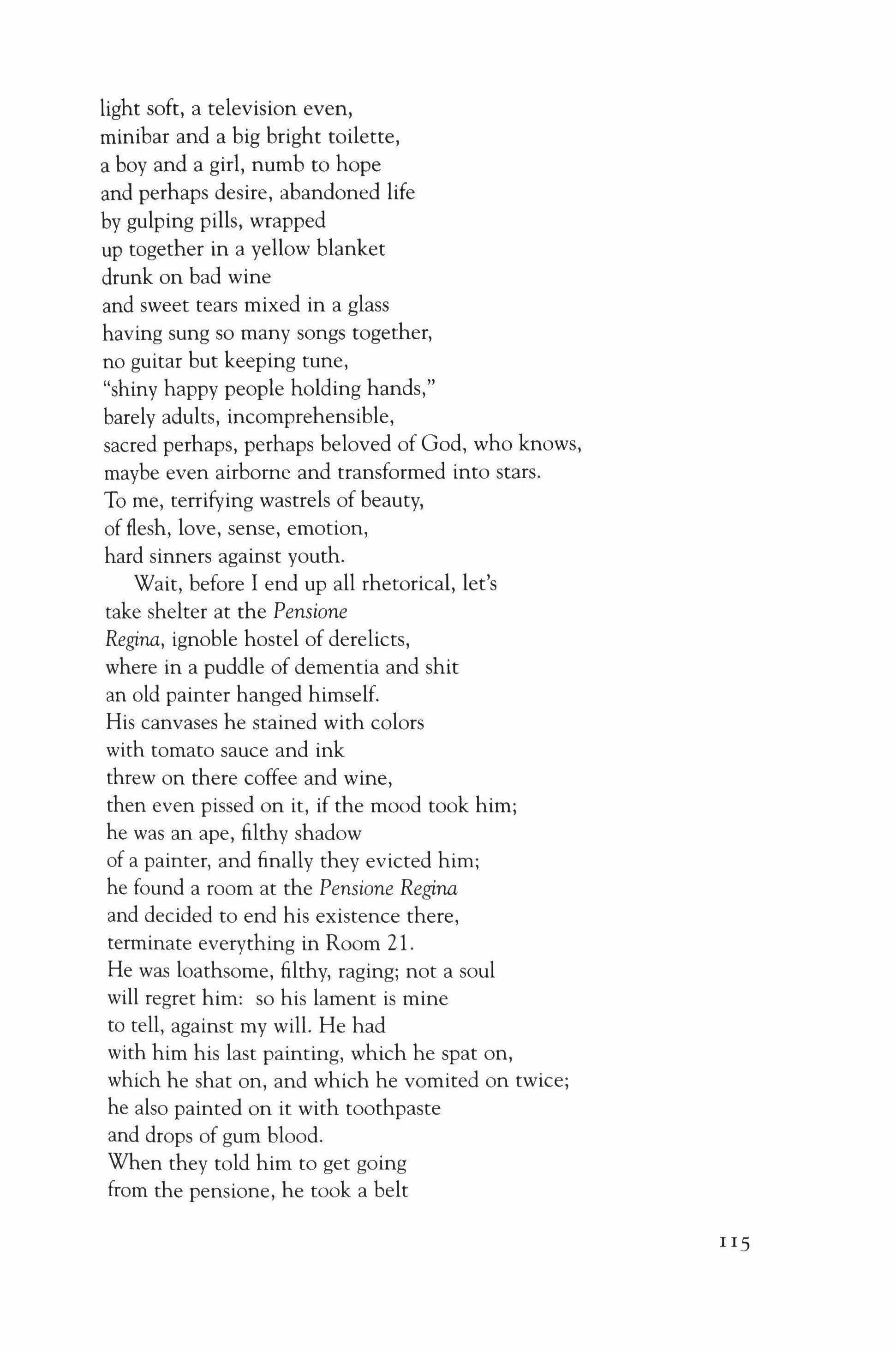
light soft, a television even, minibar and a big bright toilette, a boy and a girl, numb to hope and perhaps desire, abandoned life by gulping pills, wrapped up together in a yellow blanket drunk on bad wine and sweet tears mixed in a glass having sung so many songs together, no guitar but keeping tune, "shiny happy people holding hands," barely adults, incomprehensible, sacred perhaps, perhaps beloved of God, who knows, maybe even airborne and transformed into stars.
To me, terrifying wastrels of beauty, of flesh, love, sense, emotion, hard sinners against youth.
Wait, before I end up all rhetorical, let's take shelter at the Pensione Regina, ignoble hostel of derelicts, where in a puddle of dementia and shit an old painter hanged himself. His canvases he stained with colors with tomato sauce and ink threw on there coffee and wine, then even pissed on it, if the mood took him; he was an ape, filthy shadow of a painter, and finally they evicted him; he found a room at the Pensione Regina and decided to end his existence there, terminate everything in Room 21. He was loathsome, filthy, raging; not a soul will regret him: so his lament is mine to tell, against my will. He had with him his last painting, which he spat on, which he shat on, and which he vomited on twice; he also painted on it with toothpaste and drops of gum blood. When they told him to get going from the pensione, he took a belt
liS

dalla pensione, prese una cintura e si appese alIa smaniglia della finestra, cadendo seduto, mezzo ubriaco, non so come abbia fatto a morire, rna e certo che ci rimase. La stanza ventuno fu disinfestata, l'ultima tela fu bruciata. 10 sono un ben povero biografo, rna forse basto a cantare vita e morte di questa pittore che non cerco l'ammirazione di nessuno, meno che mai di se stesso. Avra almeno da me un'ammirazione con riserva, una piccola stima un po' schifata.
Potrei condurvi ancora all'albergo in montagna dove un uomo molto ricco s'e ucciso in una suite ingerendo veleno come un suicida d'altri tempi (e morto in ospedale), oppure alla pensione in citra dove due donne sono morte insierne, una bella e una brutta, 0 anche All'Hotel de la Ville dove un pazzo ha sparato alla sua signora e poi ha dato la testa nel muro {non ci credete?}. oppure oppure oppure oppure basta.
II6
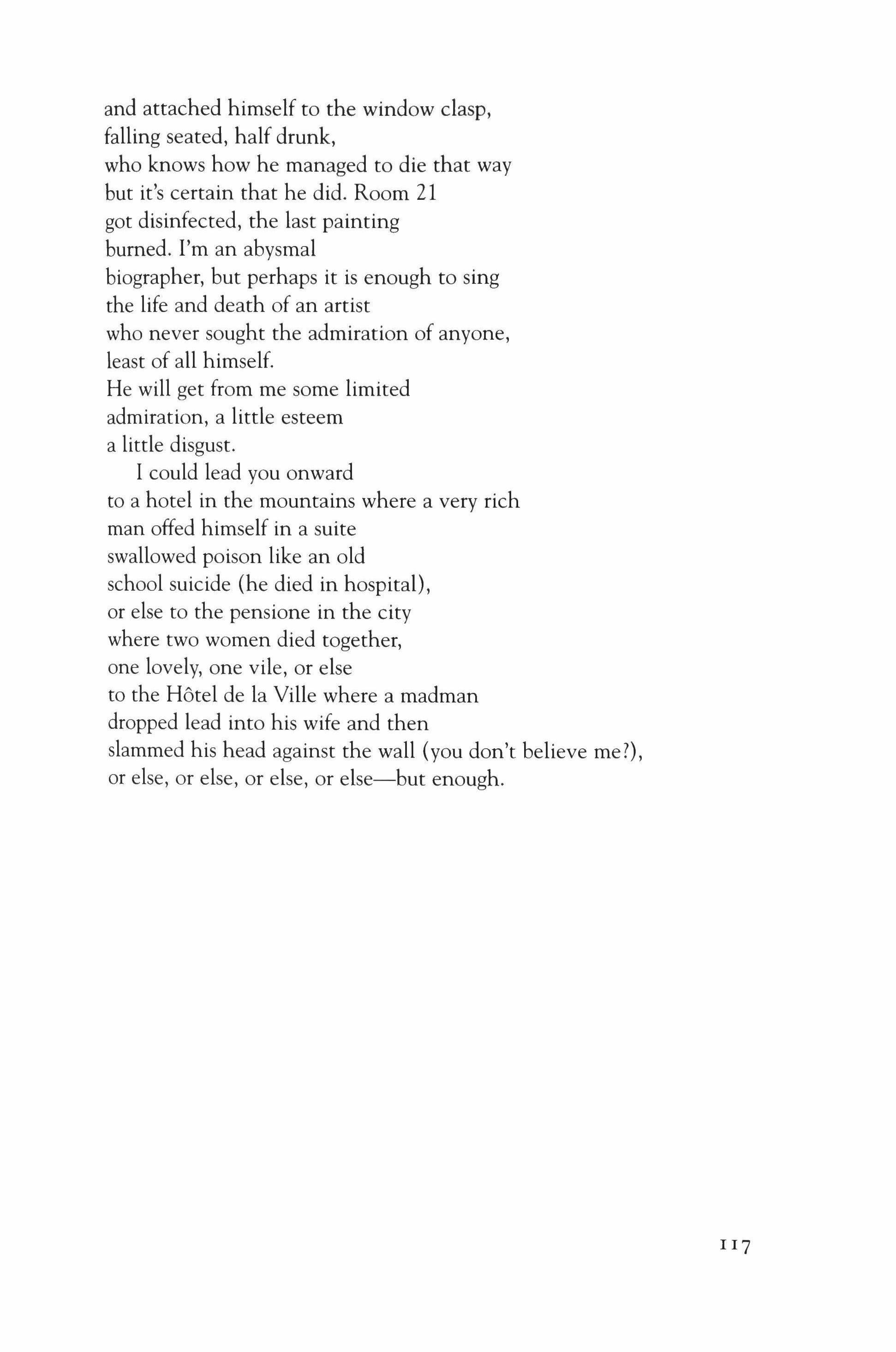
and attached himself to the window clasp, falling seated, half drunk, who knows how he managed to die that way but it's certain that he did. Room 21 got disinfected, the last painting burned. I'm an abysmal biographer, but perhaps it is enough to sing the life and death of an artist who never sought the admiration of anyone, least of all himself. He will get from me some limited admiration, a little esteem a little disgust.
I could lead you onward to a hotel in the mountains where a very rich man offed himself in a suite swallowed poison like an old school suicide (he died in hospital), or else to the pensione in the city where two women died together, one lovely, one vile, or else to the Hotel de la Ville where a madman dropped lead into his wife and then slammed his head against the wall (you don't believe me?), or else, or else, or else, or else-but enough.
Rosaria Lo Russo

Xenion di Ophelia
Good night, ladies; good night, sweet ladies; good night, good night.
Shakespeare, Amleto
Le mie creature finalmente dormono, hanno perduto ogni contrattura del volto, ogni strenua difesa e stremata.
Non si puo dire altrettanto delloro riposo che scalpita nel ginocchio puntato che accentua un ricordo di corsa.
Il loro riposo e un tempo franato. Non si puo dire che sia un sonno lieve: troppo silenzio grava sospeso all'apnea delle bocche, e 10 sterno risulta contrito dal riparo opprimente di un tricipite.
Le mie creature accolgono il precario all'ombra curva umidita delle palpebre, nel sogno cauto del nostro legame. Chi veglia su di loro si accontenta di accordare i nostri respiri intestini; naufraga intanto il sangue alla testa: "Povera Ofelia, divisa da se e dal chiaro criterio senza di che siamo solo bestia 0 figura"; povera me, che rimugino visionata dall'alto fra folte effiorescenze di pupille urticanti e non posso che dissentire da quella vivacita,
Le mie creature non si accorgono di nulla, il chiarore ovattato dell'alba rimargina la loro verginita.
lIB
 Translated by Gian Maria Annovi and Susan Stewart
Translated by Gian Maria Annovi and Susan Stewart
Ophelia's Xenion
Good night, ladies; good night, sweet ladies; good night, good night.
Shakespeare, Hamlet
My little creatures are finally sleeping, their faces have lost all their tension, each tireless defense is tired out. The same can't be said of their nap, the restless knee chafing at the bit pulsing out the memory of a race. Their nap is a time that collapses. It can't be called a light sleep: too much silence rests suspended on their bated breathing, and the breastbone turns regretful beneath the triceps' heavy shelter.
My little creatures gather the precarious in the curved humid shadows of their eyelids, in the cautious dream of our bond. The one who watches over them is happy to tune our deepest breaths; meanwhile the mind's blood founders: "Poor Ophelia divided from herself and her fair judgment without which we are merely beasts or figures"; poor me, brooding over the view from above through the thick flowering of sore eyes and I can't help but argue with that brightness.
My little creatures do not notice anything, the dawn's softened light heals their virginity.
119
Le Grazie
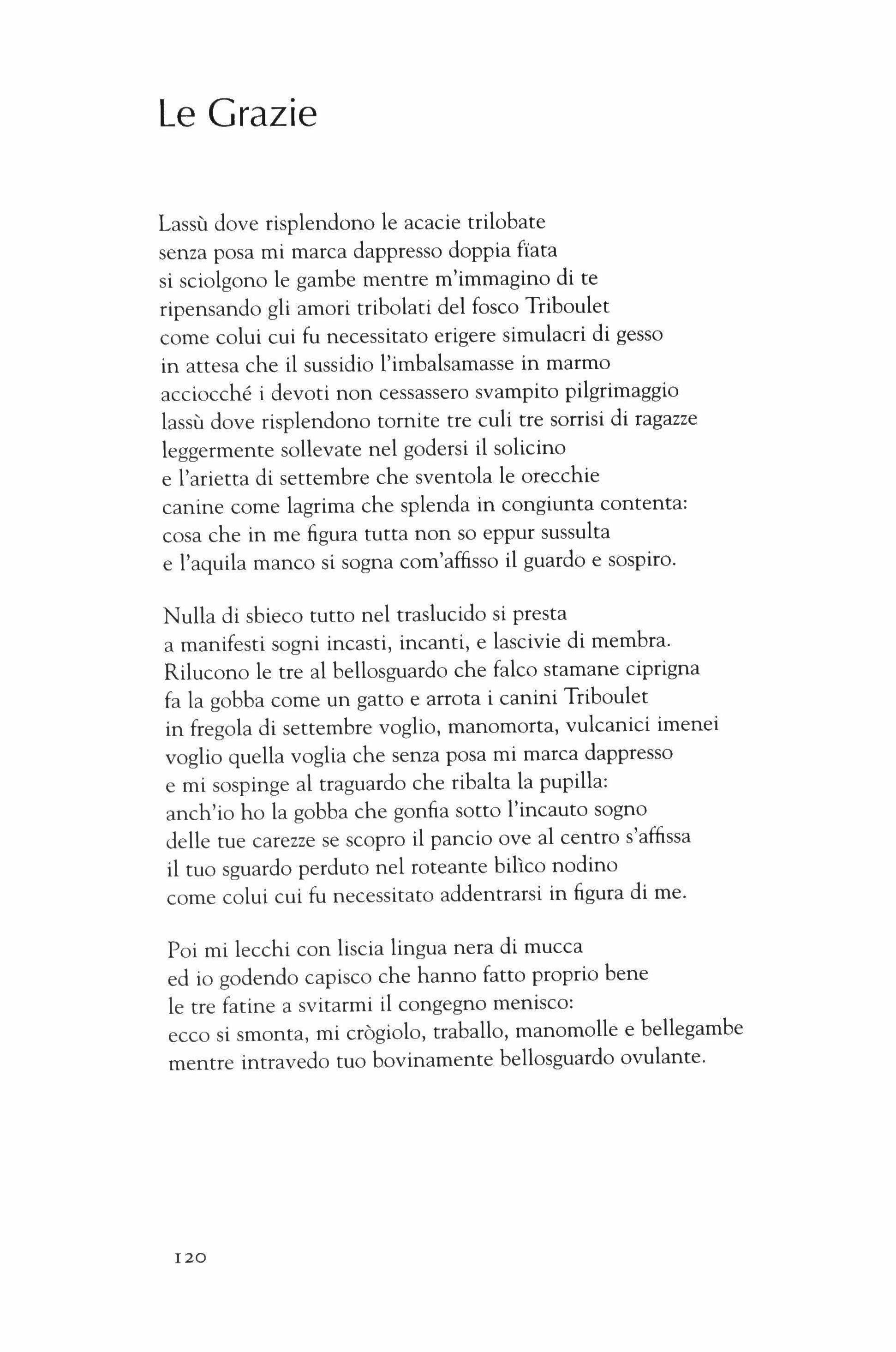
Lassu dove risplendono le acacie trilobate senza posa mi marca dappresso doppia fiata si sciolgono le gambe mentre m'immagino di te ripensando gli amori tribolati del fosco Triboulet come colui cui fu necessitato erigere simulacri di gesso in attesa che il sussidio l'imbalsamasse in marmo acciocche i devoti non cessassero svampito pilgrimaggio lassu dove risplendono tomite tre culi tre sorrisi di ragazze leggermente sollevate nel godersi il solicino e l'arietta di settembre che sventola le orecchie canine come lagrima che splenda in congiunta contenta: cosa che in me figura tutta non so eppur sussulta e l'aquila manco si sogna com'affisso il guardo e sospiro.
Nulla di sbieco tutto nel traslucido si presta a manifesti sogni incasti, incanti, e lascivie di membra. Rilucono le tre al bellosguardo che fako stamane ciprigna fa la gobba come un gatto e arrota i canini Triboulet in fregola di settembre voglio, manomorta, vulcanici imenei voglio quella voglia che senza posa mi marca dappresso e mi sospinge al traguardo che ribalta la pupilla: anch'io ho la gobba che gonfia sotto l'incauto sogno delle tue carezze se scopro il pancio ove al centro s'affissa il tuo sguardo perduto nel roteante biltco nodino come colui cui fu necessitato addentrarsi in figura di me.
Poi mi lecchi con liscia lingua nera di mucca ed io godendo capisco che hanno fatto proprio bene le tre fatine a svitarmi il congegno menisco: ecco si smonta, mi crogiolo, traballo, manomolle e bellegambe mentre intravedo tuo bovinamente bellosguardo ovulante.
120
The Three Graces

Up there where the trilobated thorntrees are shining it's recursively ceaselessly branding me as I call your image to mind, my legs come untangled rethinking gloomy Triboulet's tormented love affairs like someone who has to prop up plaster simulacra while he's waiting for a stipend to embalm them in marble just so the devout won't stop their scatterbrained pilgrimage up there where the three girls' pretty butts and smiles are shining lightly lifted in the pleasure of the little sun and September's slight breeze that flaps the dogs' ears like a tear that shined, happily, in a conjunctival sac: I don't know what shapes me and still trembles and the eagle can't even dream of how I stare and sigh.
Nothing is aslant everything opens up to the light to the realized forms of dreams, unchaste, enchanted and lusty limbs. The three girls glitter in bellosguardo this morning as I stalk, glowering, Triboulet arches like a cat and grinds his canines I want to be warmed up by September, to be felt up, hymeneal seethings I desire the desire that ceaselessly brands me that drives me to my target, that drops my eyelids: I too have a back that arches, inflating, beneath the incautious dream of your caresses if I uncover my belly where your gaze is lost inside the swirling knot of the tiny belly button like the one who long ago needed to enter inside my shape.
Then you lick me with your smooth black cow's tongue and pleased I realize the three little fairies were in fact right to loosen my meniscus's contraption: here it disassembles, I snuggle down, I stagger, limp-handed, well-limbed while I catch a glimpse of your bovine ovulating beautiful view.
121
Leda col Cigno
(Sopra una sculturina dell'Ammannati che si truova al Bargello)
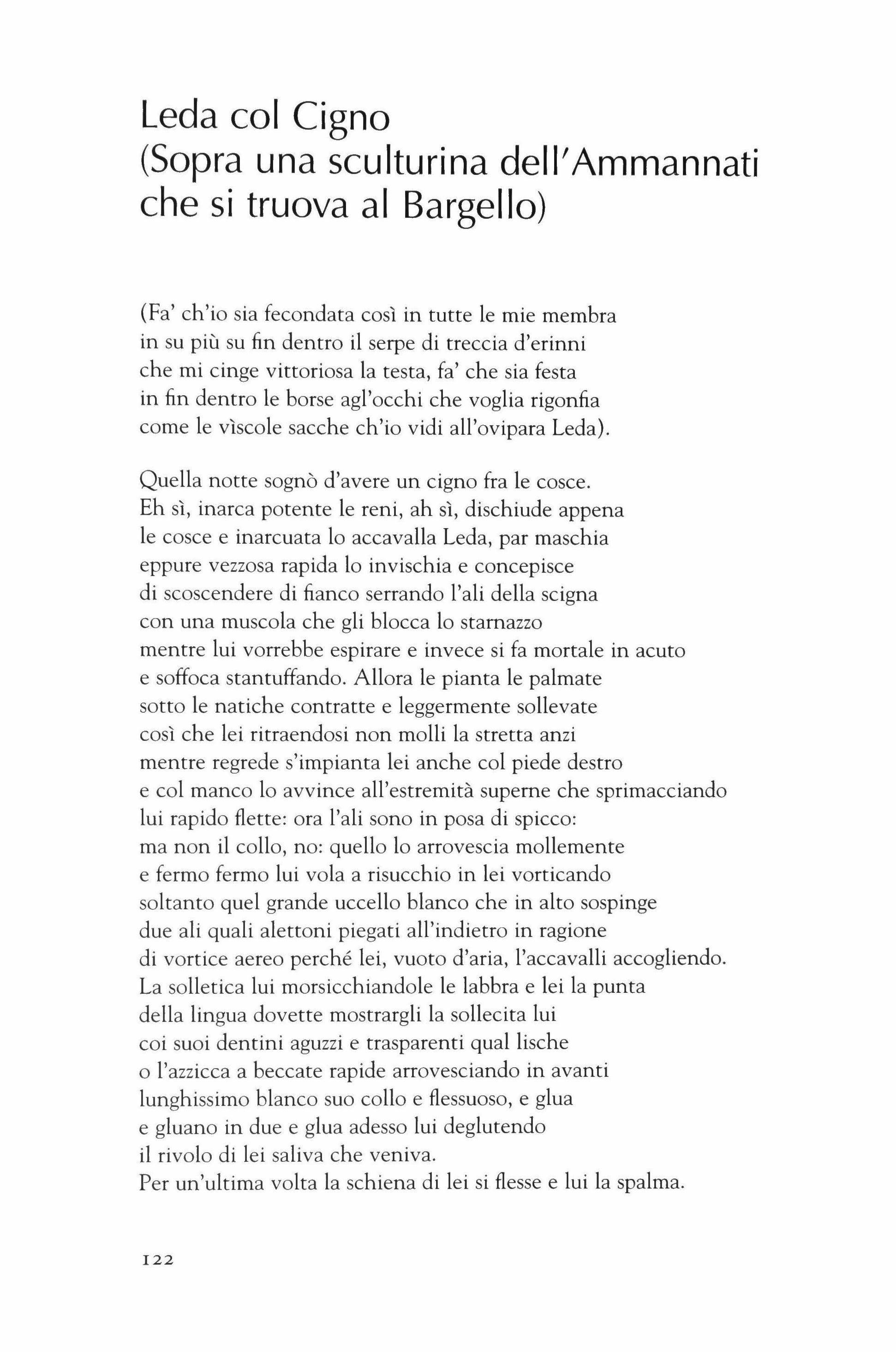
(Fa' ch'io sia fecondata cost in tutte le mie membra in su pill su fin dentro il serpe di treccia d'erinni che mi cinge vittoriosa la testa, fa' che sia festa in fin dentro le borse agl'occhi che voglia rigonfia come le viscole sacche ch'io vidi all'ovipara Leda).
Quella notte sogno d'avere un cigno fra [e cosce. Eh si, inarca potente le reni, ah sl, dischiude appena le cosce e inarcuata 10 accavalla Leda, par maschia eppure vezzosa rapida 10 invischia e concepisce di scoscendere di fianco serrando l'ali della scigna con una muscola che gli blocca 10 stamazzo mentre lui vorrebbe espirare e invece si fa mortale in acuto e soffoca stantuffando. Allora le pianta le palmate sotto le natiche contratte e leggermente sollevate cost che lei ritraendosi non molli la stretta anzi mentre regrede s'impianta lei anche col piede destro e col manco 10 avvince all'estrernita supeme che sprimacciando lui rapido flette: ora l'ali sono in posa di spicco: ma non il collo, no: quello 10 arrovescia mollemente e fermo fermo lui vola a risucchio in lei vorticando soltanto quel grande uccello blanco che in alto sospinge due ali quali alettoni piegati all'indietro in ragione di vortice aereo perche lei, vuoto d'aria, l'accavalli accogliendo. La solletica lui morsicchiandole le labbra e lei la punta della lingua dovette mostrargli la sollecita lui coi suoi dentini aguzzi e trasparenti quallische o l'azzicca a beccate rapide arrovesciando in avanti lunghissimo blanco suo collo e flessuoso, e glua e gluano in due e glua adesso lui deglutendo il rivolo di lei saliva che veniva. Per un'ultima volta la schiena di lei si flesse e lui la spalma.
122
Leda and the Swan
(On a little sculpture by Ammanti that standeth in the Bargello Museum)
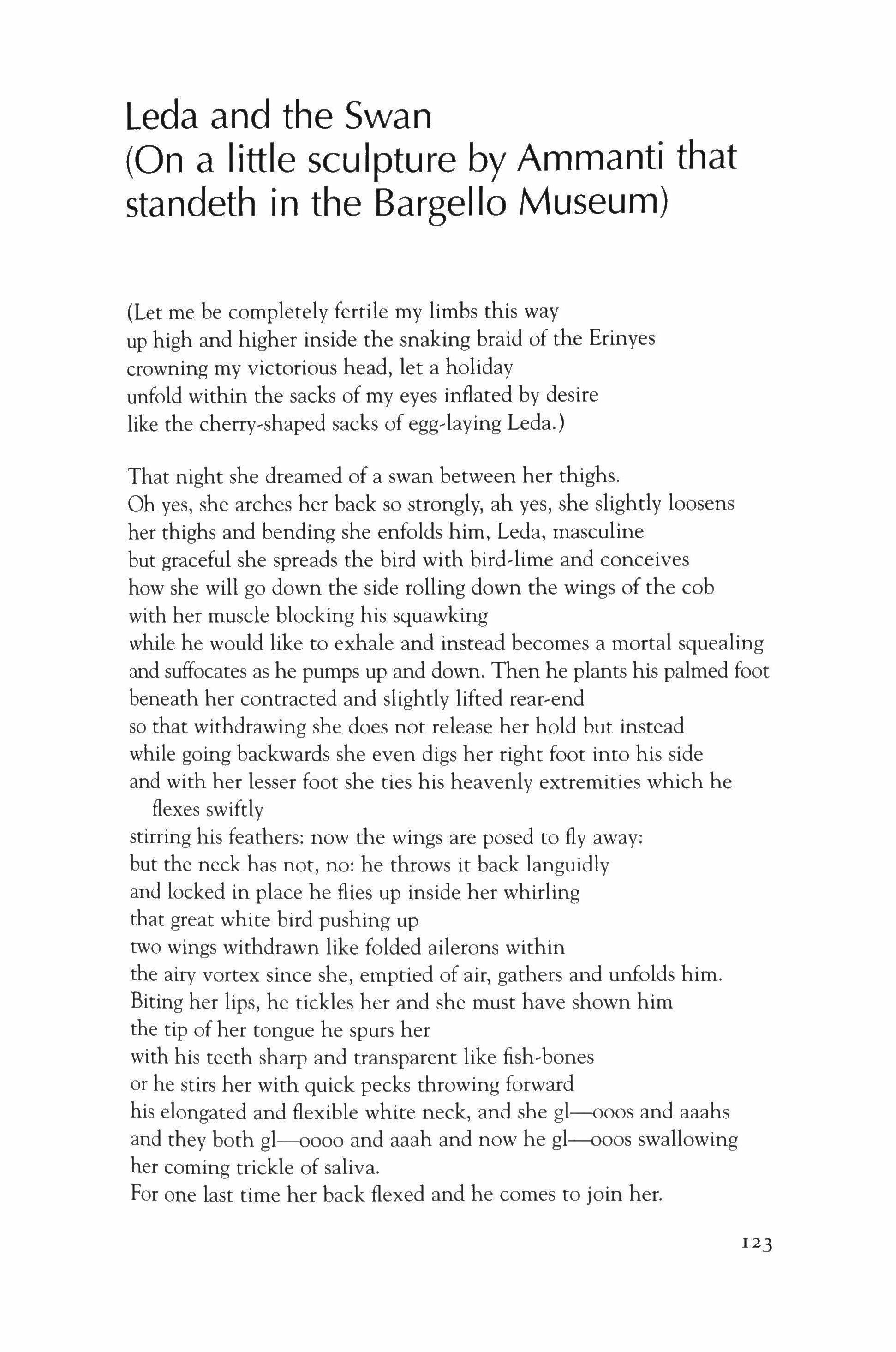
(Let me be completely fertile my limbs this way up high and higher inside the snaking braid of the Erinyes crowning my victorious head, let a holiday unfold within the sacks of my eyes inflated by desire like the cherry-shaped sacks of egg-laying Leda.)
That night she dreamed of a swan between her thighs. Oh yes, she arches her back so strongly, ah yes, she slightly loosens her thighs and bending she enfolds him, Leda, masculine but graceful she spreads the bird with bird-lime and conceives how she will go down the side rolling down the wings of the cob with her muscle blocking his squawking while he would like to exhale and instead becomes a mortal squealing and suffocates as he pumps up and down. Then he plants his palmed foot beneath her contracted and slightly lifted rear-end so that withdrawing she does not release her hold but instead while going backwards she even digs her right foot into his side and with her lesser foot she ties his heavenly extremities which he flexes swiftly stirring his feathers: now the wings are posed to flyaway: but the neck has not, no: he throws it back languidly and locked in place he flies up inside her whirling that great white bird pushing up two wings withdrawn like folded ailerons within the airy vortex since she, emptied of air, gathers and unfolds him. Biting her lips, he tickles her and she must have shown him the tip of her tongue he spurs her with his teeth sharp and transparent like fish-bones or he stirs her with quick pecks throwing forward his elongated and flexible white neck, and she gl-ooos and aaahs and they both gl-oooo and aaah and now he gl-ooos swallowing her coming trickle of saliva. For one last time her back flexed and he comes to join her.
123

Risucchiandogli sua discendenza ab ovo Elena e Polluce tresca di Zeus beato che l'incinse orgogliosa e mortale a Leda garrula madre il ventre certo gorgogliava beata. Si scambiarono due rapidi sorrisi di maniera e l'aere fu queta: quello di Leda duro s'ornbreggio di nausea pallidendo aquila quello ridivenne in un battibaleno fiammeggiando. Per poco perduro vago sentore di sedano e di pesce, e sorrideva lei da sola le riverse mammelle blanche di madrepora: piume umide e gallate i grassi resti del trescone sulla riva renosa dove lei granule riversa un poco ancora, e dovettero certo indurirle granulose due pere marme di madrepora.
(A noi di quel colossalmente divertito godimento solo si presta in picciola teca una qualche allegra vestigia, rna fra drappi malriusciti ed in minuscolo, in minugia, che coi madreperlaceo pulviscolo di marmo, 0 pseudomichelangiolo, bene imitasti la maniera del movimento sensuale ombreggiando).
124
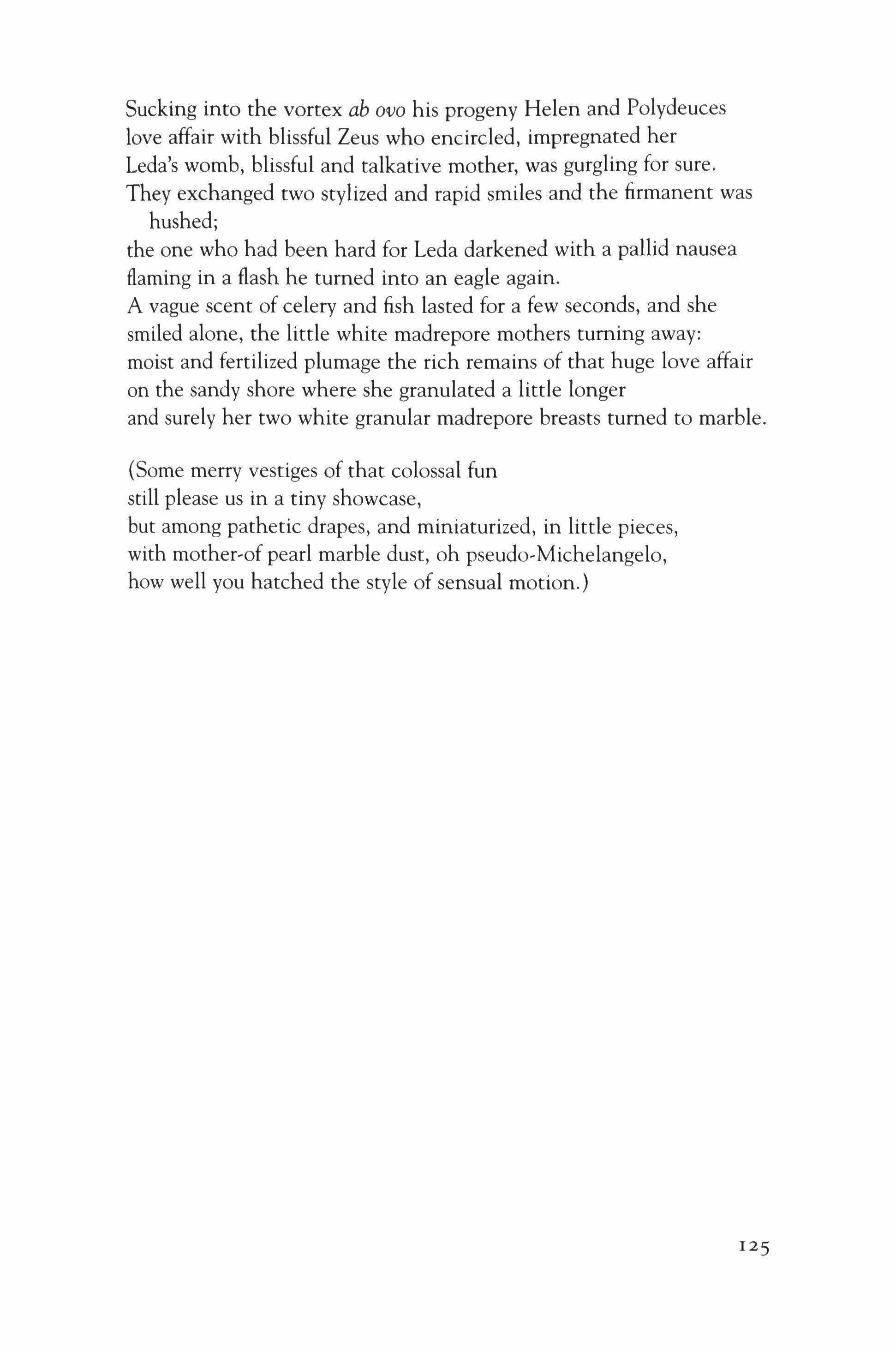
Sucking into the vortex ab ovo his progeny Helen and Polydeuces love affair with blissful Zeus who encircled, impregnated her Leda's womb, blissful and talkative mother, was gurgling for sure. They exchanged two stylized and rapid smiles and the firmanent was hushed;
the one who had been hard for Leda darkened with a pallid nausea flaming in a flash he turned into an eagle again.
A vague scent of celery and fish lasted for a few seconds, and she smiled alone, the little white madrepore mothers turning away: moist and fertilized plumage the rich remains of that huge love affair on the sandy shore where she granulated a little longer and surely her two white granular madrepore breasts turned to marble.
(Some merry vestiges of that colossal fun still please us in a tiny showcase, but among pathetic drapes, and miniaturized, in little pieces, with mother-of pearl marble dust, oh pseudo-Michelangelo, how well you hatched the style of sensual motion.)
125
Valerio Magrelli

Che la materia provochi il contagio se toccata nelle sue fibre ultime recisa come it vitello dalla madre come il maiale dal proprio cuore stridendo nel vedere le sue membra strappate;
Che tale schianto generi la stessa energia che divampa quando la societa si lacera, sacro velo del tempio e la testa del re cade spiccata dal corpo dello stato afnnche il taumaturgo diventi la ferita;
Che l'abbraccio del focolare sia radiazione rogo della natura che si disgrega inerme davanti al sorriso degli astanti per offrire un lievissimo aumento della temperatura ambientale;
Che la forma di ogni produzione implichi effrazione, scissione, un addio e la storia sia l'atto di comburere e la Terra una tenera catasta di legname messa a asciugare al sole,
e incredibile, no?
126
Translated by David Lummus

That matter provokes contagion if touched in its utmost fibers cut like the calf from its mother like the pig from its own heart squealing at the sight of its members tom away;
That such a rupture generates the very energy that surges when society is lacerated, holy veil of the temple, and the king's head falls, sliced from the body of the state until the thaumaturge becomes the wound;
That the embrace of the hearth is radiation pyre of nature that breaks up helpless before the smile of bystanders to offer even the slightest increase of the room's temperature;
That the form of every production implicates effraction, scission, a farewell and history is the act of combusting and the Earth a tender pile of firewood left to dry in the sun; isn't it incredible?
127
L'abbraccio

Tu dormi accanto a me cost io mi inchino
e accostato al tuo visa prendo sonno come fa 10 stoppino da uno stoppino che gli passa il fuoco. E i due lumini stanno
mentre la fiamma passa e il sonno fila. Ma mentre fila vibra la caldaia neUe cantine.
Laggiu si brucia una natura fossile, la in fondo arde la Preistoria, morte torbe sommerse, fermentate, avvampano nel mio termosifone.
In una buia aureola di petrolio la cameretta e un nido riscaldato da depositi organici, da roghi, da liquami.
E noi, stoppini, siamo le due lingue di quell'unica torcia paleozoica.
128
The Embrace

You sleep near me so I kneel down and next to your face I catch your slumber as does a wick from another wick that passes on its fire. And the two votives stand while the flame passes and sleep rolls on. But while it rolls throbs the boiler in the basement.
Down there a fossil nature bums, there, down deep, prehistory is in flames, dead peat, buried and fermented, flares in my radiator.
In a dark halo of petroleum the little room is a nest heated by organic deposits, by pyres, by slime. And we, the wicks, are the two tongues of that singular Paleozoic torch.
129

Ero sul letto di un ambulatorio, nascosto dietro un paravento. "Antigone," "Si," "Sei qui?" "Si, qui." Le vertebre, le vertebre. E iniziano a discorrere tra loro, due vecchi, due voci di vecchi.
Perche una voce invecchia, anche nel suono sta l'osso del tempo anche nel fiato. Soffiavano, e c'era dentro un'eco di se stessa, un'eco che precedeva la pronuncia.
Qualcosa di scassato e scardinato, il midollo sfilato dalla spina dorsale e sguainato come una spada luccicante, voce-carcassa vertebra della voce.

I was on a hospital bed, hidden behind a screen.
"Antigone," "Yes," "Are you here?" "Yes, here." The vertebrae, the vertebrae. And an old man and woman, their old voices, begin speaking amongst themselves. Because a voice gets old, even in sound is the bone of time even in breath. They wheezed, and there was within an echo of itself, an echo that anticipated pronunciation. Something smashed and dislodged, the cord unstrung from the spine and unsheathed like a sparkling sword, a VOice s carcass vertebra of the voice.
131
Annunci immobiliari

Affittasi villino sopra la ferrovia con tavernetta adiacente il capolinea dei bus e salotto limitrofo al metro. Povere case abitate dal rumore dove famiglie piccole e isolate si stringono - uccelletti sopra cavi dell'alta tensione. L'alta tensione del censo e delle classi, l'alta tensione del denaro, quella scossa invisibile che divide le vacche nei campi, e voi da noi.
Non toccare la corrente che ti scivola accanto, lasciala sospirare mentre romba via sui tralicci nel suo cupreo fiume intrecciato.
132
Real Estate Announcements

For rent, a little house above the railroad with small dining room adjacent to the bus terminus and living room bordering the metro. Poor homes inhabited by noise where small, isolated families squeeze together-sparrows on hightension lines. The high tension of wealth and of classes, the high tension of money, that invisible shock that separates the cows in the fields, and you from us. Do not touch the current that slides by next to you, let it sigh as it rumbles by on the trellises in its cupreous, interwoven river.
133
Fotografia

E' che 10 scatto recide l'ombelico della luce. Recide, quella forbice, il filamento lento e lungo dello sguardo, budello del nutrimento, separa perche l'immagine venga al mondo dividendosi dalla madre.
E quella pupa d'ombra, quel bozzolo, e la cesta lasciata a galleggiare sulle acque per mettere in salvo la forma.
134
Photograph

It's that the click cuts off the navel of the light. It cuts, that scissor, the slow and long filament of the gaze, cord of nutriment, it separates so that the image come into the world splitting from its mother. And that shadowy pupa, that cocoon, is the basket left to float on the waters to shelter the form of things.
135

D'improvviso ho visto un colibri, anzi l'ho udito frullare fra i rami di un cespuglio che stavo scostando. Per meglio dire, ho avvertito il suo brivido, simile a quello dei centomila volts che sibilano sui cavi, da traliccio a traliccio, nelle nostre campagne-uccellini di pura energia. E questa punto puro era 10 stesso che vortica recluso negli acceleratori di particelle, lungo le cieche nozze di un circuito sotterraneo. o forse il matrimonio e la struttura che conserva la forza affidandola a un percorso anulare, mobile e ferma insieme (un'aureola del sesso). Eppure nel ribrezzo che provavo per la sua minacciosa liberta, liberta di colpirmi, il colibri stava prima, precedeva ogni forma, era la folgore che ancora non ha scelto il suo tracciato, era tutti i tracciati. Potenza di insostenibile fragore era lui la cascata che cercavo mentre andavo spostando quei cespugli.
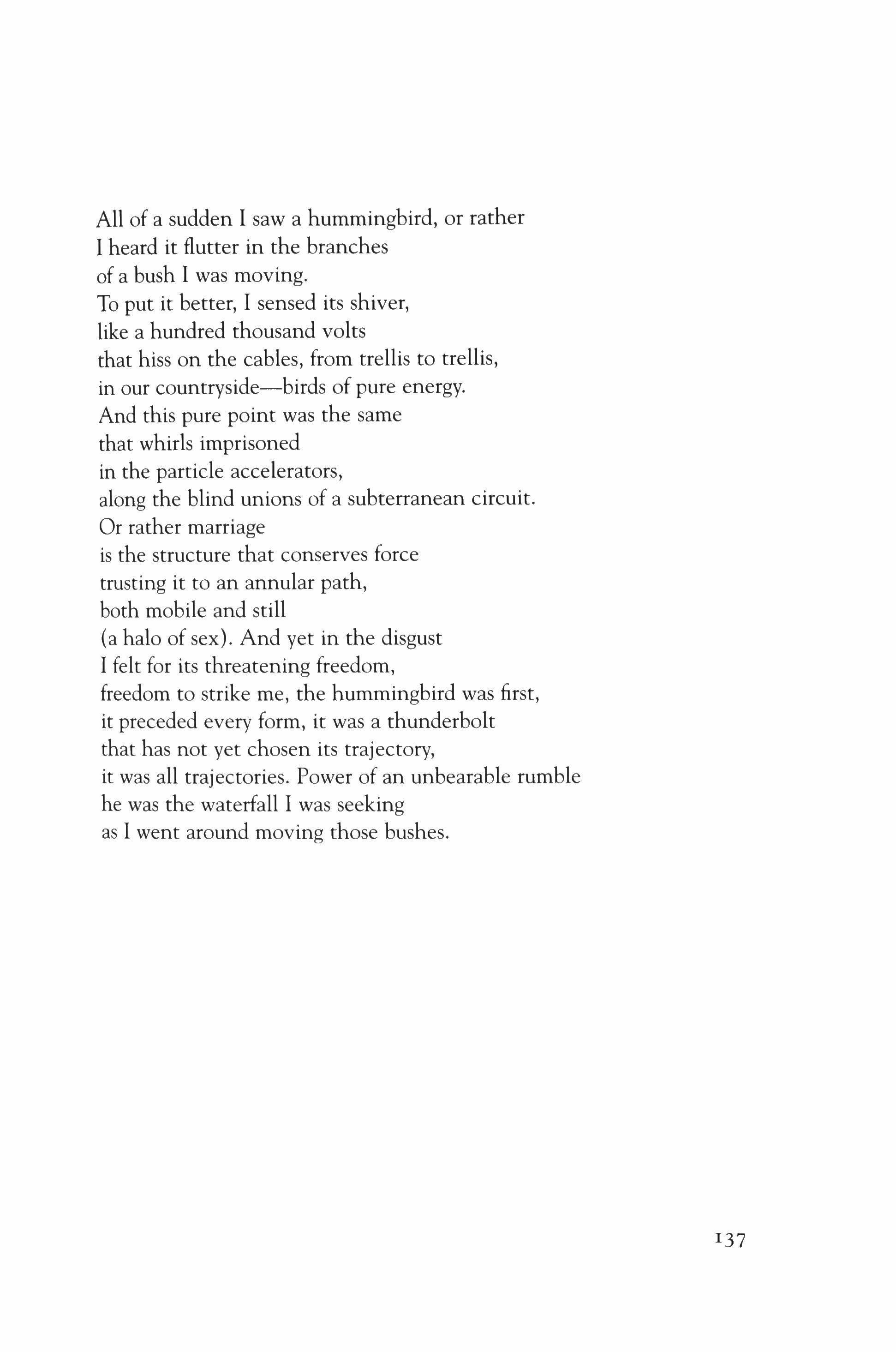
All of a sudden I saw a hummingbird, or rather I heard it flutter in the branches of a bush I was moving. To put it better, I sensed its shiver, like a hundred thousand volts that hiss on the cables, from trellis to trellis, in our countryside-birds of pure energy. And this pure point was the same that whirls imprisoned in the particle accelerators, along the blind unions of a subterranean circuit. Or rather marriage is the structure that conserves force trusting it to an annular path, both mobile and still (a halo of sex). And yet in the disgust I felt for its threatening freedom, freedom to strike me, the hummingbird was first, it preceded every form, it was a thunderbolt that has not yet chosen its trajectory, it was all trajectories. Power of an unbearable rumble he was the waterfall I was seeking as I went around moving those bushes.
137
"Guarda questa bambina"

Guarda questa bambina che sta imparando a leggere: tende le labbra, si concentra, tira su una parola dopo l'altra, pesca, e la voce fa da canna, fila, si flette, strappa guizzanti queste lettere ora alte nell'aria luccicanti al sole della pronuncia.
"Look

at this girl"
Look at this girl who is learning to read: she curls her lips, concentrates, draws up one word after another, she fishes, and her voice acts as pole, slackens, bends, tears these wriggling letters now high in the air glittering in the sun of pronunciation.
139
Guardando Ie colonne di profughi
da casa mia

Che poi e uno schifo, a osservarlo da vicino, un calcestruzzo di polvere, di paglia, di saliva, povero intreccio nato da secrezioni e steli con una vaga idea compositiva.
Un filo oggi, un filo domani, e viene fuori un cestino in fibra vegetale, bolo raffermo, pasta che l'abitante, insieme, abita e mastica.
Questa casa di bava e fatta come i figli che accoglie, materia generata, materiale genetico, tuorlo di trasmissione.
Per questo, senza nido, ora avanzano ciechi, perduti nella norte della loro identita.
140
Watching the Columns of Refugees from My House

That it is indeed disgusting to observe it from up close, a wattle of dust, of straw, of saliva, a poor weaving born from secretions and steles with a vague constituent idea.
A thread today, a thread tomorrow, it turns out a basket of vegetal fiber, stale cud, paste that the inhabitant both inhabits and chews.
This house of slime is made like the children it welcomes, generated matter, genetic material, yolk of transmission.
For this, nest-less, they move on now, blind, lost in the night of their identity.
La famiglia del poeta

Ci amiamo tanto
ma ogni cozzo e un lampo, qui dentro, stretti stretti, vicini ogni momenta in un sacchetto annodato dalla sorte: si sente forte come per gli urti ticchettiamo!
Da noi non fa mai notte, c'e sempre uno sprazzo che scocca illumindandoci appena ci tocchiamo.
Noi ci vogliamo bene, ma di un bene che abbaglia e certe volte scotta.
Noi siamo la famiglia delle pietre focaie.
The Poet's Family
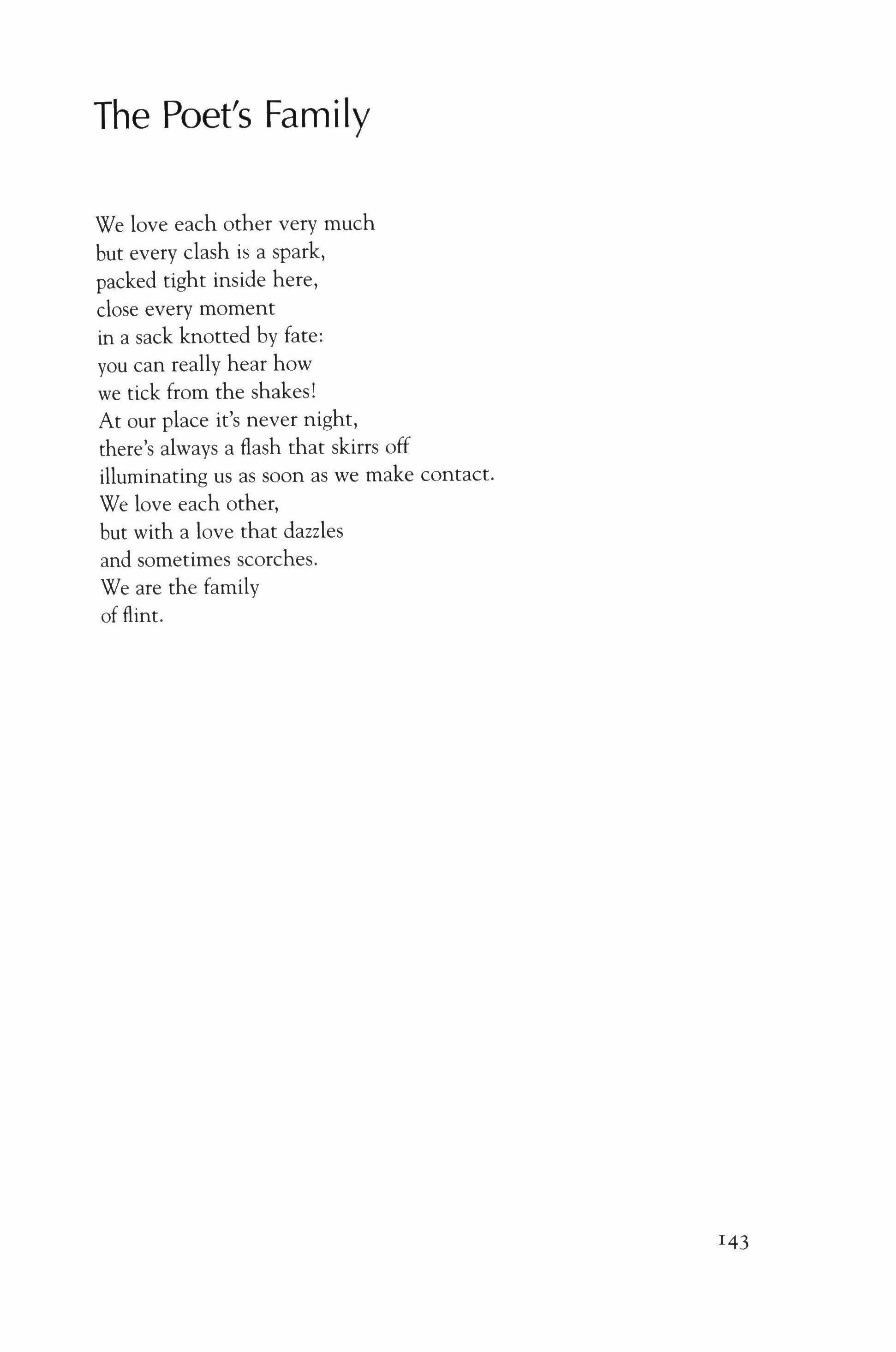
We love each other very much but every clash is a spark, packed tight inside here, close every moment in a sack knotted by fate: you can really hear how we tick from the shakes! At our place it's never night, there's always a flash that skirrs off illuminating us as soon as we make contact. We love each other, but with a love that dazzles and sometimes scorches. We are the family of flint.

Dormo accanto a mio figlio. E' un letto di fortuna e lui ha accettato, sia pure a malincuore. Cost 10 sento a fianco, che sospira pesante, stuoino di spuma, intreccio di bave, telaio d'amore filato per quasi quindici anni. Tremendo nella violenza che spavaldo esibisce, insulti, offese come tiepida malta per costruire il suo se, e la bestemmia come un Babbo Natale cui lui stesso non crede, l'irnplume, rna che gli serve a regalarsi questa smarrita corazza di piume.
144

I sleep next to my son. It's a fortune's bed and he has accepted, even if reluctantly. So I hear him next to me, breathing heavily, a mat of foam, a weaving of spittle, loom of love threaded for almost fifteen years. Terrible in the violence that he defiantly exhibits, insults, offenses like a lukewarm mortar for constructing his self, and curses like a Santa Claus in which he himself does not believe, unfledged, but which he needs to grant himself this lost cuirass of feathers.
Lucio Mariani

Deserto
Lo sanno anche i bambini come nasce un deserto. Non dipende dal sole ne dal morso ossessivo delle formiche rosse, di mosche dell'ulivo. Un deserto si forma quando il cuore degli uomini si fa pallido e secco si forma se continuano a mancare amore, ira 0 digiuno.
Cost questa giardino va stomando il suo verde e finira di logorarsi esusto per sgarbi della pura indifferenza per caduta dei venti di passione per concorso dei nostri tanti senza.
E nessuno potra un giomo scoprire chi tra noi inferse il colpo decisivo.
Translated by David Lummus

Desert
They know it, too, the little ones, how a desert is born. It doesn't depend on the sun or on the obsessive sting of the red ants, of the olive flies.
A desert takes shape when the heart of men becomes pale and dry; it takes shape if love, anger, and privation continue to run dry.
This is how the garden keeps warding off its green and will end up wearing away, parched by the slights of pure indifference by the collapse of the winds of passion by the coincidence of all our absences.
And no one will be able one day to discover who among us dealt the decisive blow.
147
Maschere

Uscire entrare
passare per le porte entrare
uscire
altro non devi fare
prescrive il lunario del percorso di briganza e rapina
la vita attaccata alla sorte si trascina come se amuleti e monete
e occasioni
fossero un rosario di boe colorate
non la flotta di carta
e di perdoni che s'avvita distrutta
al soffio d'ogni brezza marrana intrisa e sfranta dal brivido
della marea
che batte i giomi nelle mani con chiodi fermi
finche non scoverai mai pill
responsi di contabili
ne modi per uscire e i cani alla guardia del cambio permanente ti spingeranno a entrare
nei fomi dove brucia ogni maschera ombratile
Masks

Exit enter pass through the doors enter exit you mustn't do anything else prescribes the almanac of the journey of banditry and robbery life attached to fortune drags itself as if amulets and coins and occasions were a rosary of colored buoys not the fleet of paper and of pardons that twists, destroyed, in the breath of every renegade breeze soaked and broken by the shiver of the tide that beats the days into your hands with firm nails until you will never again unearth the accountants' answers or ways to exit and the dogs guarding the permanent change will push you to enter into the ovens where burns every dim mask
149
Meno che I'infinito

Quando cammini per la strada assorto e radi il duomo e guardi oltre la siepe con l'occhio incavemito come un morto nel pensiero non fingi l'infinito ne il cor ti strepe.
In mezzo ai sassi, tra i sacchetti sparsi, nei magri mozziconi frughi una scusa da basso incidente sei in cerca di falsissime ragioni, d'una pelea per disfarti di Dio, dell'amico che ancora si frappone e ti trattiene mentre vai a capofitto nella merda.
Less Than the Infi n ite

When you walk intent along the street and you skim over the cathedral and you look beyond the hedgerow with your eye caved in like a dead man, in your thought you do not imagine the infinite nor does your heart call out.
In the middle of the rocks, among the scattered sacks, in the thin cigarette butts, you rummage for a lowdown excuse you're in search of the most bogus reasons, of a struggle to get rid of God, of the friend who continues to object and holds you back while you fall headfirst in the shit.
Precetto del profeta

Traverserai la vita brano a brano senza cani nel cuore senza artigli e ti farai metronomo, segno del tempo, tempo procederai col popolo dei te di luna in lenta luna verso il mare coprirai il monte, taglierai la piana la sporta colma di fichi e olive troverai bocche e braccia generose non vorrai rive ne avrai dove tornare. Questi sono gli appunti che il tuo sangue ha dettato per leggere la mappa dei sensi e durare, incapace di ricordi come il cipresso immane resta a Todi folto d'anni e di bacche tegolate.
The Prophet's Precept

You will cross life piece by piece without dogs in your heart, without claws and you will become a metronome, sign of time, time you will proceed with the people within you from moon to slow moon toward the sea you will cover the mountain, you will cut the plain your pack full with figs and olives you will find generous mouths and arms you won't wish for shores, you'll have no place of return. These are the notes that your blood has dictated so as to read the map of the senses and to endure, incapable of memories as the massive cypress rests at Todi thick with years and shingled with berries.
153

Alda Merini II pastrano
Un certo pastrano abita lungo tempo in casa era un pastrano di lana buona un pettinato leggero un pastrano di molte fatture vissuto e rivoltato mille volte era il disegno del nostro babbo la sua sagoma ora assorta ed ora felice. Appeso a un cappio 0 al portabiti assumeva un'aria sconfitta: traverso quell'antico pastrano ho conosciuto I segreti di mio padre vivendolo cost, nell'ombra.
154
Translated by Susan Stewart and Brunella Antomarini

The Overcoat
A certain overcoat resided at our house for a long time it was made of good wool a finely-combed wool a many-times-made-over overcoat well-worn, a thousand times turned inside out it wore the outline of our father his very figure, whether worried or happy Hanging on a hook or on the coat rack it took on a defeated air: through that ancient overcoat I came to know my father's secrets to live his life, in shadow.
155
II grembiule
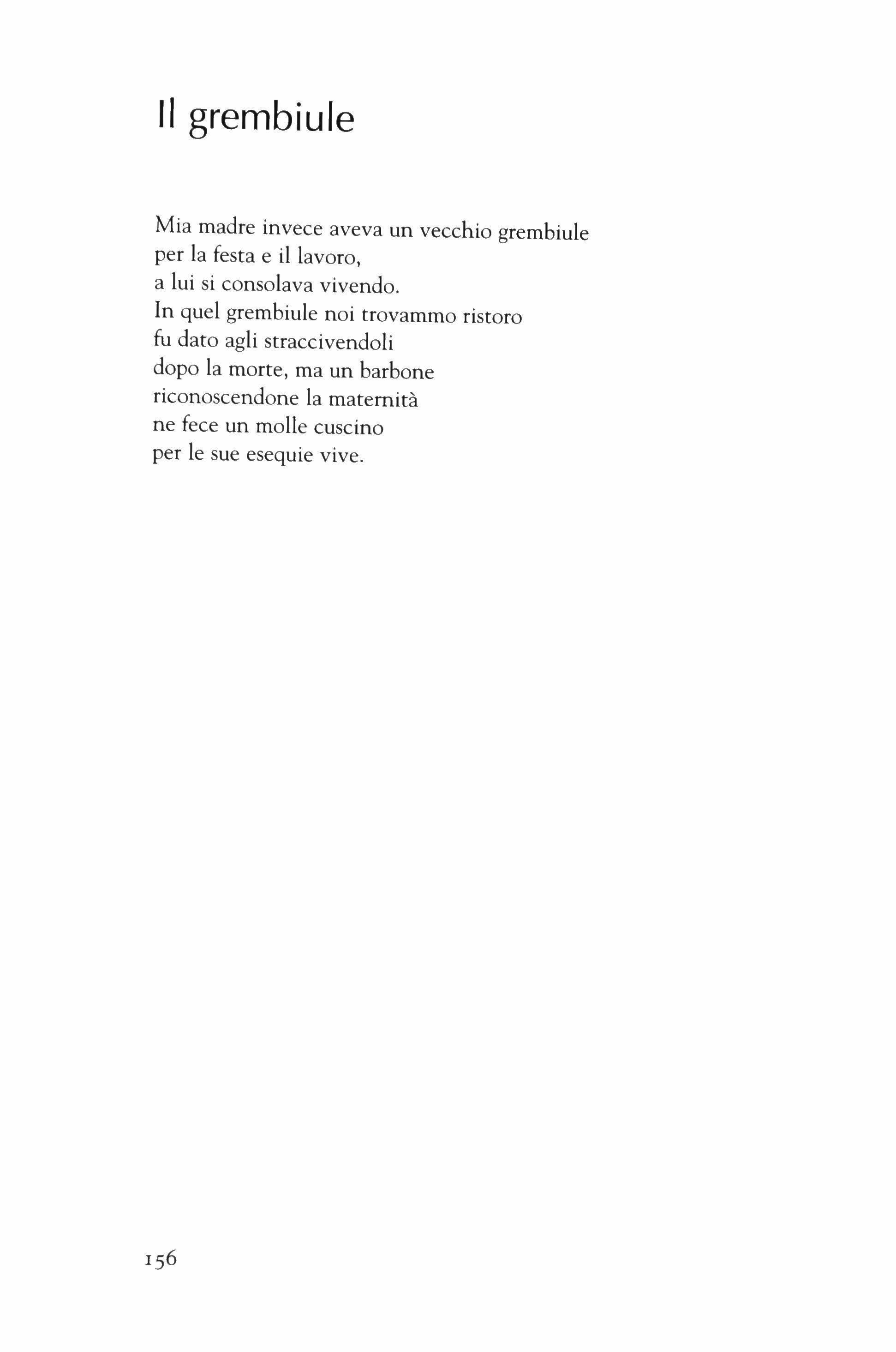
Mia madre invece aveva un vecchio grembiule per la festa e il lavoro, a lui si consolava vivendo.
In quel grembiule noi trovammo ristoro fu dato agli straccivendoli dopo la morte, rna un barbone riconoscendone la maternita ne fece un melle cuscino per le sue esequie vive.
The Apron

My mother, though, had an old apron for holidays and work and she consoled herself with it, by living. We found solace in that apron that was given away to the ragmen after her death, but a tramp, recognizing its maternity, made a soggy pillow from it for the funeral rites of his life.
157
Guerra

o uomo sconciato come una fossa in te si lavano le mani i servi, i servi del delitto che ti cambiano veste parola e udito che ti fanno simile a un fantasma dorato. Viscidi uccelli visitano le tue dimore sparvieri senza volto ti legano i polsi alle vendette degli altri che vogliono dissacrare il Signore. o guerra, portento di ogni spavento malvagita inarcata, figlia stretta generata dal suolo di nessuno non hai udito ne ombra: sei un mostro senza anima che mangia la soglia e il futuro dell'uomo.
War
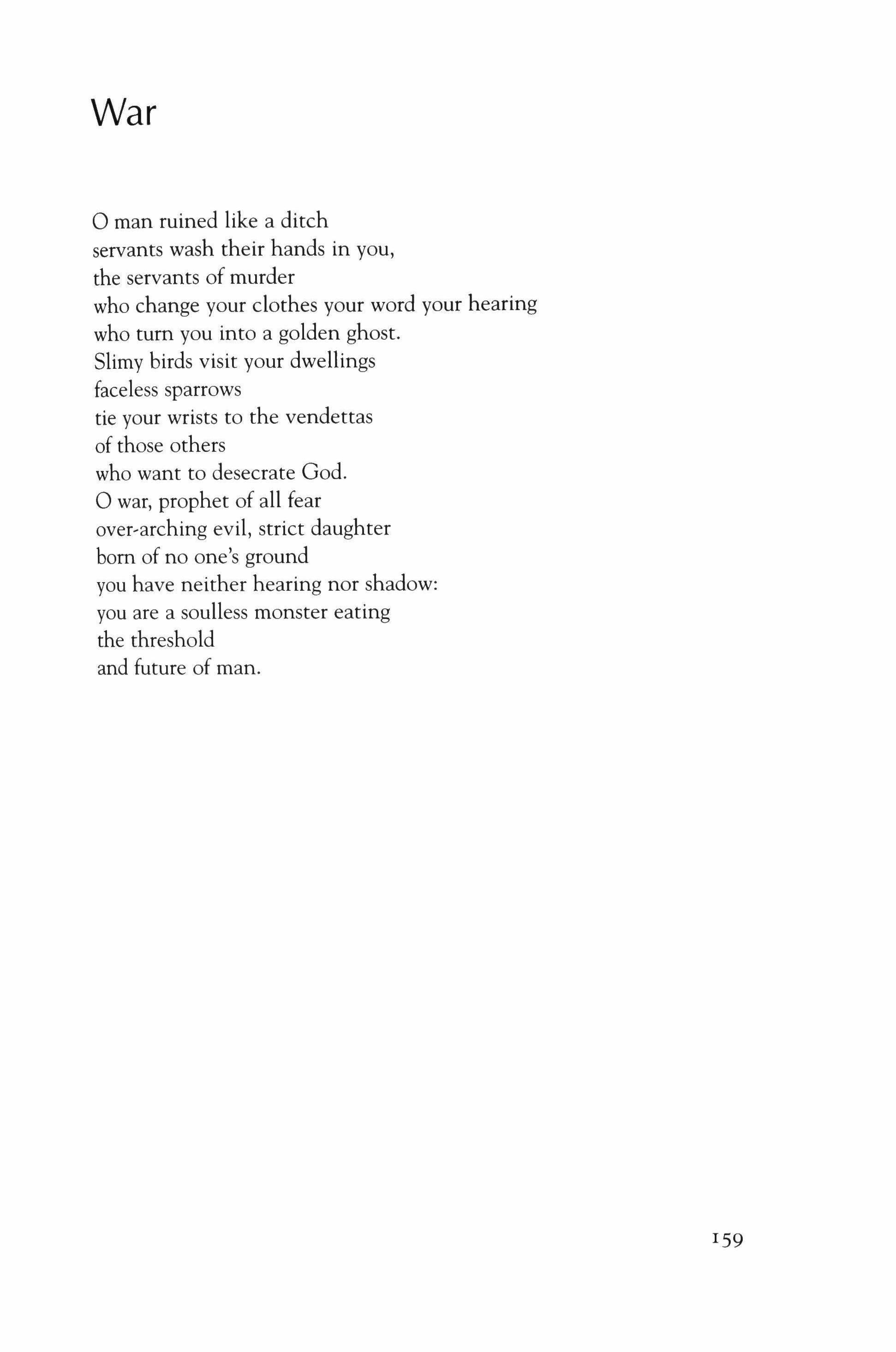
o man ruined like a ditch servants wash their hands in you, the servants of murder who change your clothes your word your hearing who turn you into a golden ghost. Slimy birds visit your dwellings faceless sparrows tie your wrists to the vendettas of those others who want to desecrate God.
o war, prophet of all fear over-arching evil, strict daughter born of no one's ground you have neither hearing nor shadow: you are a soulless monster eating the threshold and future of man.
I59
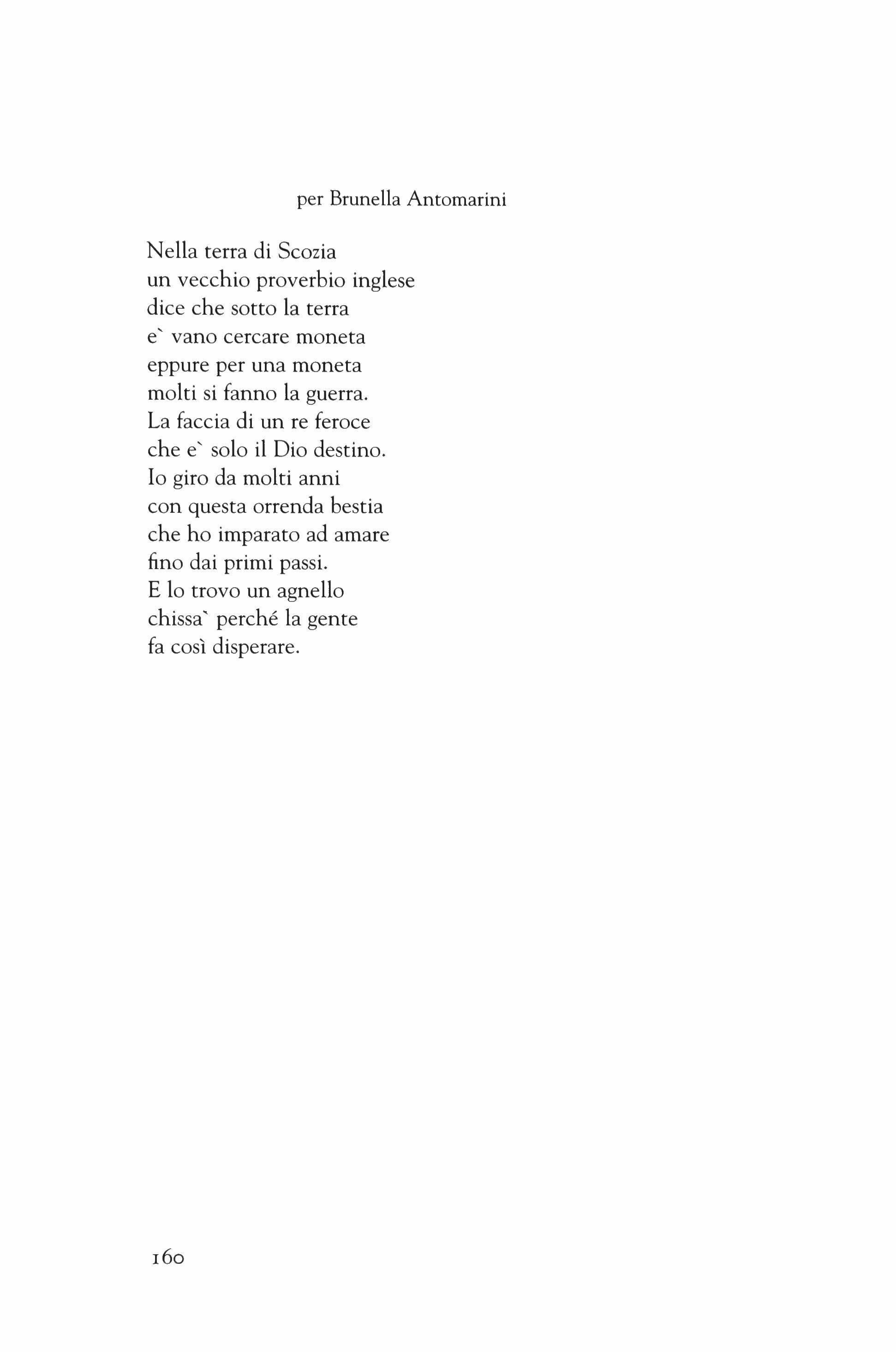 per Brunella Antomarini
per Brunella Antomarini
Nella terra di Scozia un vecchio proverbio inglese dice che sotto 1a terra e' vano cercare moneta
eppure per una moneta molti si fanno 1a guerra. La faccia di un re feroce che e' solo il Dio destino. 10 giro da molti anni con questa orrenda bestia che ho imparato ad amare fino dai primi passi. E 10 trovo un agnello chissa' perche 1a gente fa cost disperare.
160
 for Brunella Antomarini
for Brunella Antomarini
In the land of Scotland there's an old English proverb that says that beneath the dirt it's vain to look for coins, since because of a single coin so many will go to war. The face of a fierce king who is only the God of destiny. I have lived for many years with this horrible beast I have learned to love since I took my first steps. And I find it's a lamb though who knows why it drives people to desperation.
Giovanni Raboni

Di quello che ho nel cuore parlo poco, rni frena la paura. E voglio e soffro, e mi fara morire la cosa che la lingua non sa dire.
Translated by Robert Pogue Harrison andDavid Lummus

Of what is in my heart I rarely speak, fear holds me back. And I want and I suffer, and the thing the tongue cannot say will be the death of me.
Stanze per la musica di Adriano Guarnieri

Quare tristis-perche
sempre, nella veglia e nel sonno, nell'omissione e nell'adempimento, l'anima ci fa COSt male?
Noi che la custodiamo
senza amarla, senza conoscerla nella gabbietta delle nostre ossa come il vetro d'una lantema custodisce la fiamma sappiamo soltanto che e lei, lei che non ha ne tendini ne sangue, la compagnia pili sanguinosa. Tu come lei invisibile proteggici dal suo silenzio, fa' che sentiamo in tempo la sua voce.
Stanzas for the Music of Adriano Guarnieri
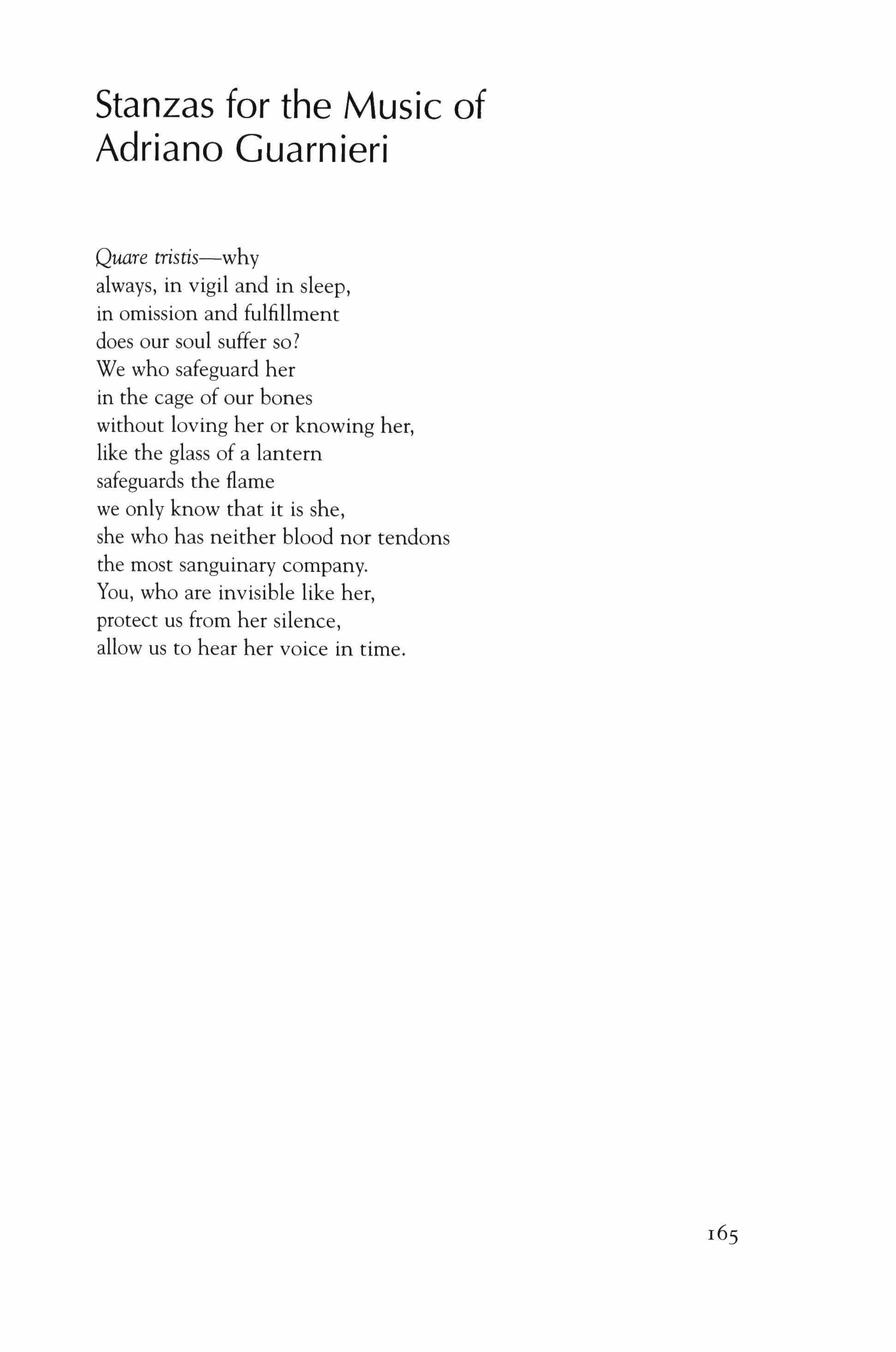
Quare tristis-why always, in vigil and in sleep, in omission and fulfillment does our soul suffer so? We who safeguard her in the cage of our bones without loving her or knowing her, like the glass of a lantern safeguards the flame we only know that it is she, she who has neither blood nor tendons the most sanguinary company. You, who are invisible like her, protect us from her silence, allow us to hear her voice in time.
165

Cost a volte succede che nel buio si insanguini un volto, una mana ci implori-cosl c'e chi ignora e chi invece ha nel cuore la comunione dei vivi e dei morti.
166
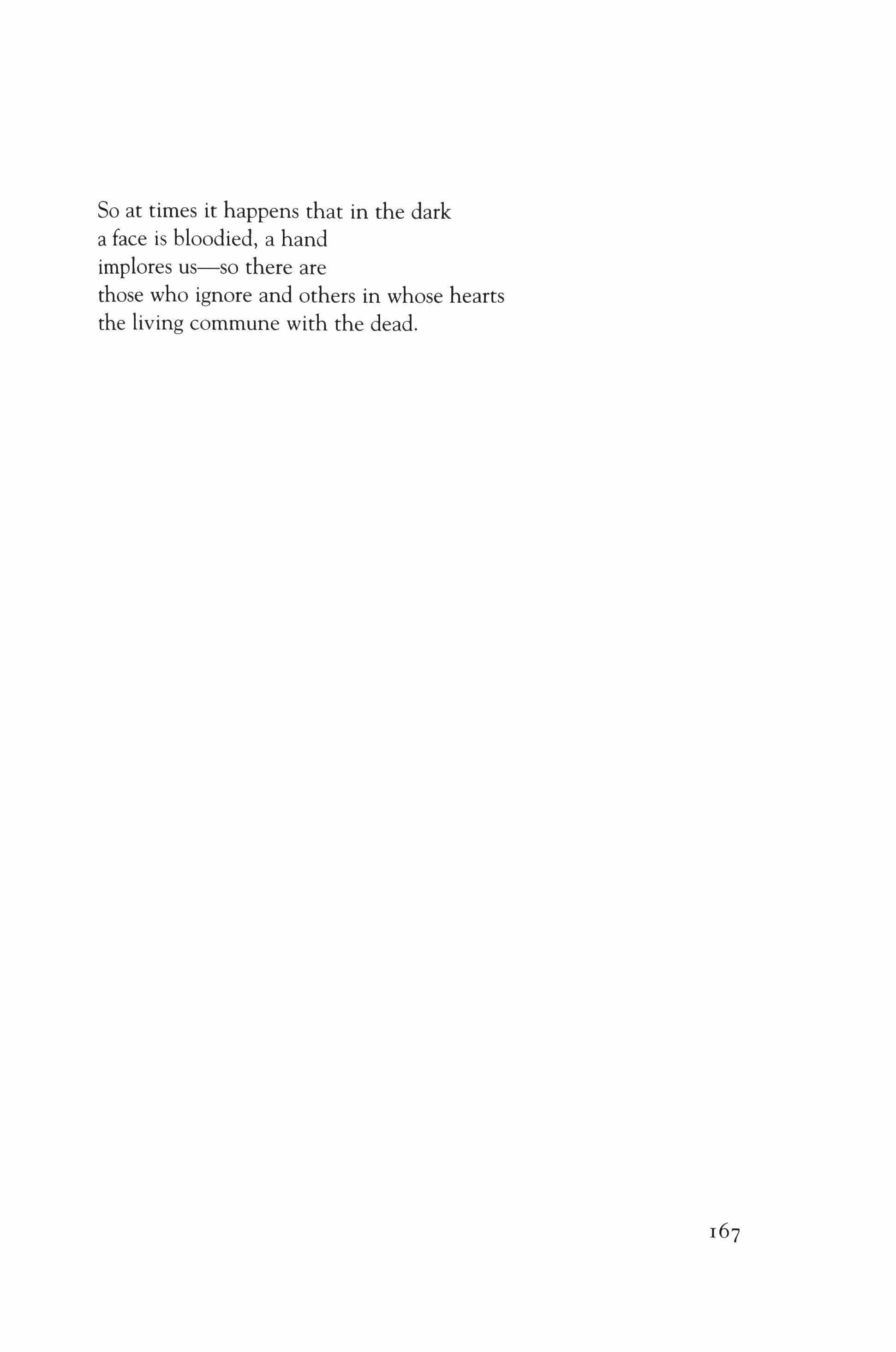
So at times it happens that in the dark a face is bloodied, a hand implores us-so there are those who ignore and others in whose hearts the living commune with the dead.

L'autunno ha a volte luci cost terse e, sugli alberi, rossi di cost atroce dolcezza che il cuore si spezzerebbe vedendoli. In diverse
pili innocue incombenze dunque si tinge assorbito e lascia che siano gli occhi a incantarsene, a impregnarsene, sciocchi e intrepidi come sono Poi stinge
a poco a poco 0 forse trascolora come fa, salendo, la luna, quel tetro fulgore, scrudelisce nel pulviscolo del tempo, e solo allora
uno ha il coraggio di dire quant'era bello - pili bello della primavera.
168

At times autumn can have lights so terse and, on the trees, reds so atrociously sweet that the heart would break in two just seeing them. So in different more harmless chores it pretends to be absorbed and leaves it to the eyes to become enchanted, to become permeated, silly and intrepid as they are Then little by little it fades or maybe grows pale as does the moon, rising, that dark splendor, it loses its edge in the dust of time, and only then do we have the heart to say how beautiful it was-more beautiful than spring.
Davide Rondoni
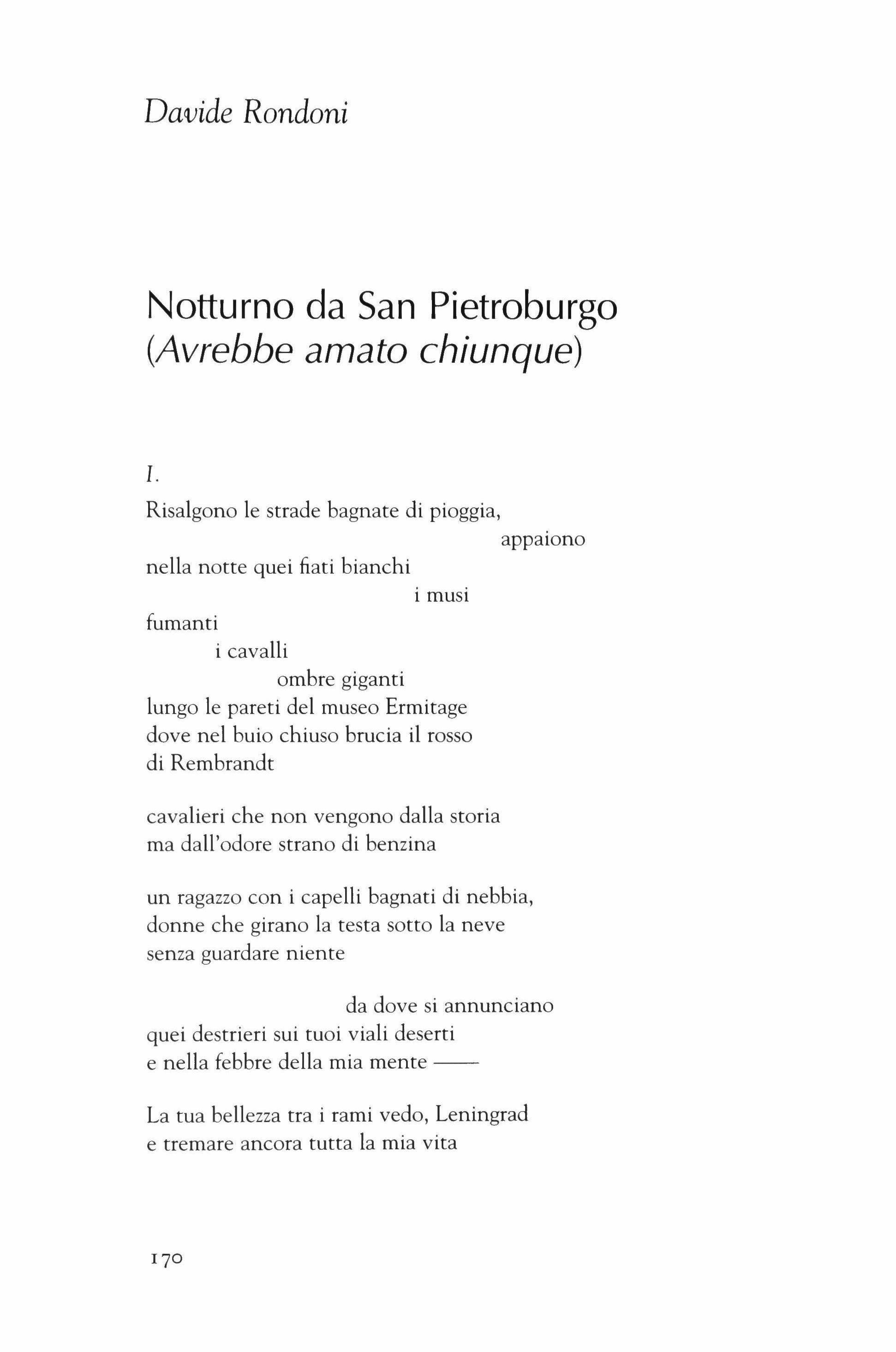
Notturno da San Pietroburgo (Avrebbe amato chiunque)
1.
Risalgono le strade bagnate di pioggia, appaiono
nella notte quei fiati bianchi i musi fumanti i cavalli ombre giganti
lungo Ie pareti del museo Ermitage dove nel buio chiuso brucia il rosso di Rembrandt
cavalieri che non vengono dalla storia rna dall'odore strano di benzina
un ragazzo con i capelli bagnati di nebbia, donne che girano la testa sotto la neve senza guardare niente da dove si annunciano quei destrieri sui tuoi viali deserti e nella febbre della mia mente
La tua bellezza tra i rami vedo, Leningrad e tremare ancora tutta la mia vita
170
Translated by Gregory Pell
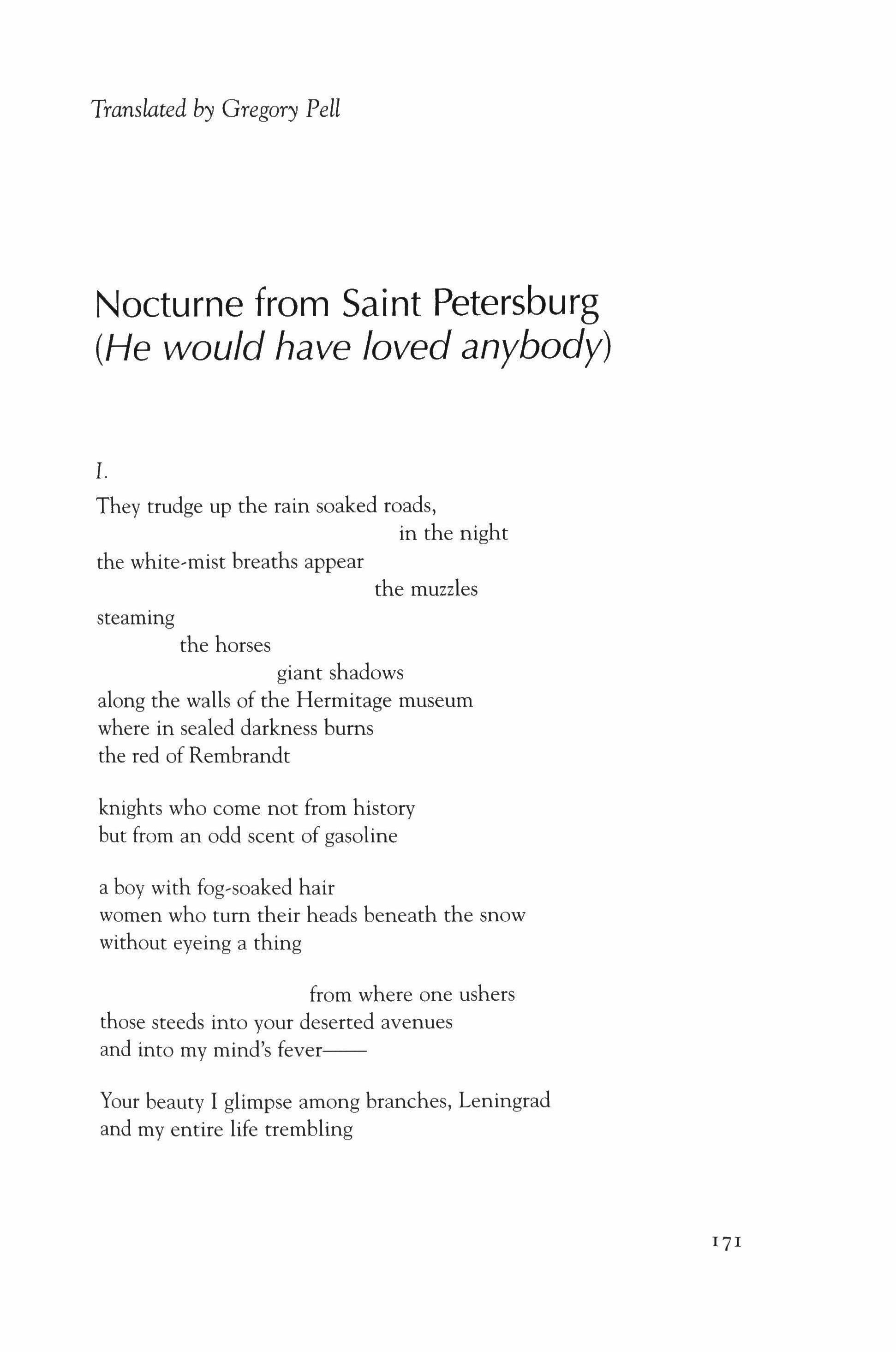
Nocturne from Saint Petersburg (He would have loved anybody)
1. They trudge up the rain soaked roads, in the night the white-mist breaths appear the muzzles steaming the horses giant shadows along the walls of the Hermitage museum where in sealed darkness bums the red of Rembrandt knights who come not from history but from an odd scent of gasoline a boy with fog-soaked hair women who tum their heads beneath the snow without eyeing a thing from where one ushers those steeds into your deserted avenues and into my mind's fever--
Your beauty I glimpse among branches, Leningrad and my entire life trembling
171

II.
Che ora e, dimmi, e ancora tempo
quando si alzano nella tenebra
le grandi braccia dei ponti
per le navi immense, nere che escono sul Baltico
e quando risuonano dai vicoli
o dalle piazze sospese come due secoli fa le risate ubriache degli architetti italiani
che lavorarono al sogno della citra
disegnando palazzi sull'acqua
e nella luce fredda
davanti allo sguardo palude di Pietro, 10 zar
che ora e, dimmi, e ancora tempo?
III.
II desiderio di conquistare Venezia sospesa sui ghiacci
fu incendio nello sguardo di molti
fu piombo
nel cuore di lunghe schiere di uomini
immobili per mesi nella neve
e fu il presentimento di morire
IV.
Ma la citra sull'acqua
e stata cost sola stanotte
avrebbe amato chiunque
la ragazza sotto l'arco fruga con ansia nella borsetta, poi
se ne va ed io resto solo sulla piazza 0 sul suo desiderio

II.
What hour is it, tell me, is it still the time when in the gloom rise up the great arms of the bridges for immense ships, black as they issue out onto the Baltic and when they resound from alleys or from the suspended piazzas of two centuries ago drunken laughter of Italian architects who worked towards the dream of the city designing buildings on the water and in the cold light before the mired stare of Peter, the czar what hour is it, tell me, is it still the time?
III.
The desire to conquer Venice suspended above sheets of ice was then the rage in the gaze of the masses was lead in the hearts of long formations of men immobilized for months in the snow and it was then the premonition of dying
IV.
But the city atop the water was just so only last night he would have loved anybody the girl in the archway rummaging anxiously through her purse, then off she goes as I remain alone in the piazza or in her longing

1a pioggia gelida
batte l'asfalto, sono code di 1adre comete visti dall'a1to
i viali che da qui se ne vanno a finire in periferia
Cosa porti via, ultima
1uce del cielo d'europa-e cosa
1ascerai in me
della visione dei cavalli nei cavalli
1a loro corsa nella neve, e questi anni
174

the icy rain lashes the pavement, they're dreadful comet tails seen from on high the avenues that from here go off leading to the outskirts
What do you take away, last light of the European sky-and what will you leave in me of this sight of horses seen through horses their racing through the snow, and these years
175
Settembre (Avrebbe amato chiunque)

A fine stagione quando la stagione non vuole finire e l'altra ancora non ha agganciato al cielo le sue vele
rna il cuore sa, corne 10 sanno le strade e la corona che si spegne dei rami sulle sedie sparse ai tavolini deve finire
qualcosa se qualcosa deve inziare
rna gli arnori no, sono stagioni che non hanno rnai fine, giorni che salgono nello sguardo alle spalle delle colline scure e degli abbandoni
176
September (He would have loved anybody)
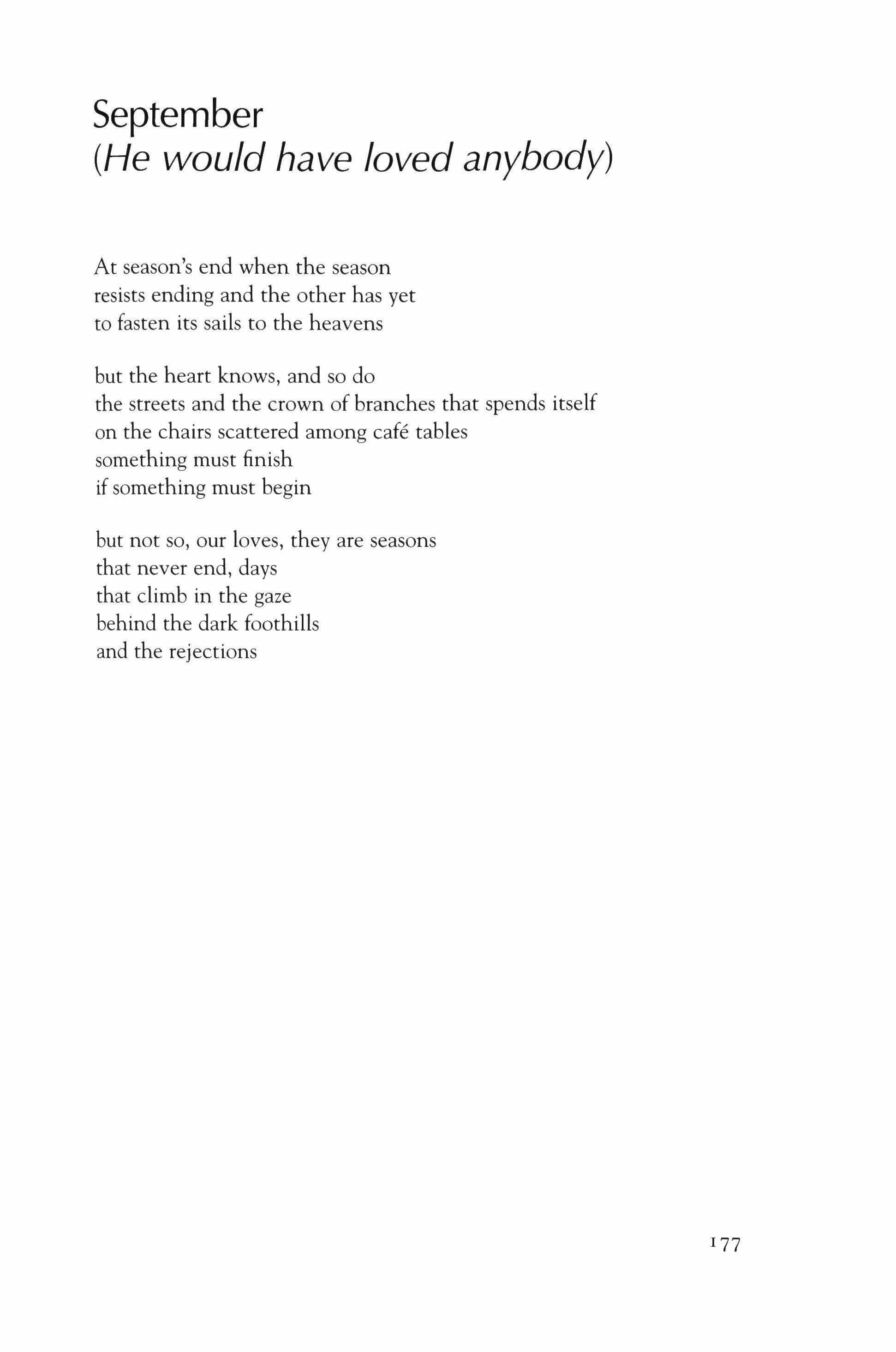
At season's end when the season resists ending and the other has yet to fasten its sails to the heavens but the heart knows, and so do the streets and the crown of branches that spends itself on the chairs scattered among cafe tables something must finish if something must begin but not so, our loves, they are seasons that never end, days that climb in the gaze behind the dark foothills and the rejections
In biblioteca (II bar del tempo)

Metti gill, mama, metti
gill tu, ripeteva dolce, sfinita
e a disagio la bibliotecaria mentre guardava di fuggita noi con il cartellino in mano e le borse strette al cuore.
Stavamo in attesa con gli sguardi a mezz ana davanti a quel colloquio tra lei gia matura d'anni e la povera donna ostinata che parlava 0 taceva, 0 di la gemeva per disamore.
Metti gill tu, da brava. Mama.
Chiuse
con gli occhi chiusi.
E i libri allineati nella grande stanza fuggente nelle proprie campiture furono scoiattoli per un istante, mi sembrarono fissare dalla loro ebbra e quieta luminosita questa faccenda irraggiungibile di donne e di pieta.
Dallo scaffale della filologia germanica, 0 forse dalla seconda fila della Pleiade si udi un crlcchio, un poco di rumore, quasi niente, e non so ancora se fu un verso sinistro 0 qualcosa come quando un bambino fa di nascosto un gioco.
178
In the Library (The bar of time)
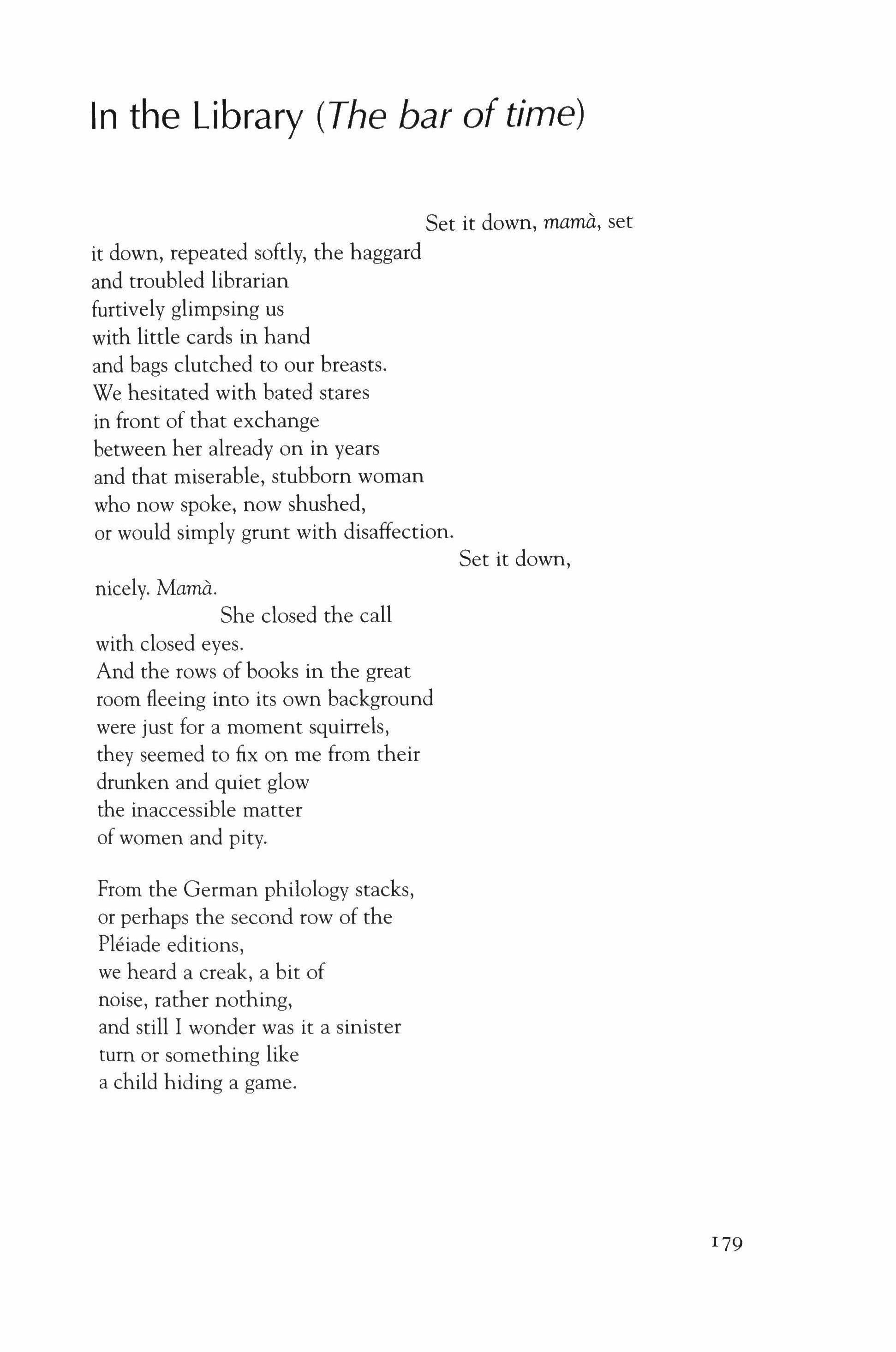
Set it down, mama, set it down, repeated softly, the haggard and troubled librarian furtively glimpsing us with little cards in hand and bags clutched to our breasts. We hesitated with bated stares in front of that exchange between her already on in years and that miserable, stubborn woman who now spoke, now shushed, or would simply grunt with disaffection.
Set it down, nicely. Mama. She closed the call with closed eyes. And the rows of books in the great room fleeing into its own background were just for a moment squirrels, they seemed to fix on me from their drunken and quiet glow the inaccessible matter of women and pity.
From the German philology stacks, or perhaps the second row of the Pleiade editions, we heard a creak, a bit of noise, rather nothing, and still I wonder was it a sinister tum or something like a child hiding a game.
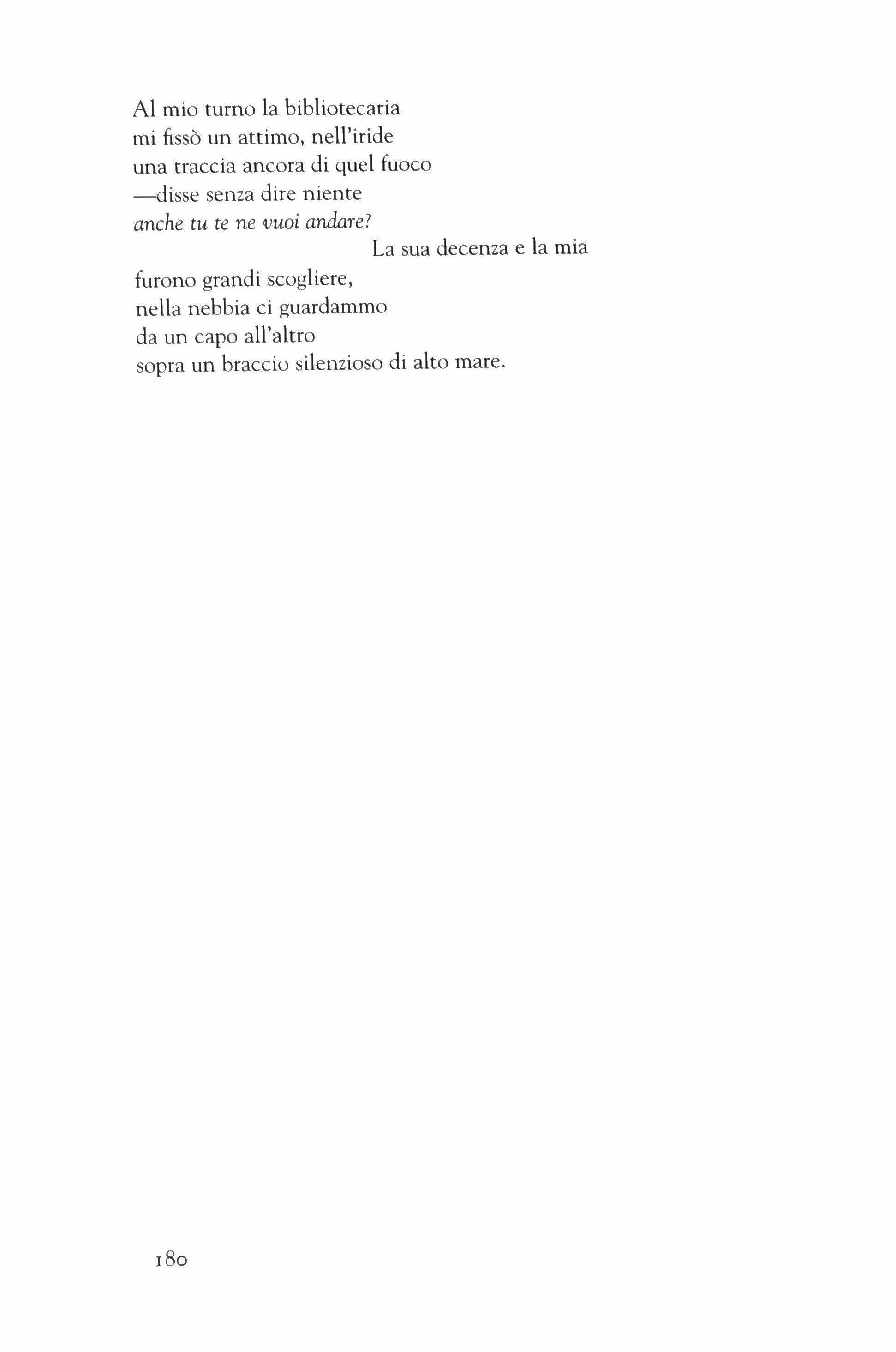
A1 mio turno la biblioteearia mi fisso un attimo, nell'iride
una traecia aneora di quel fuoeo -disse senza dire niente anche tu te ne vuoi andare?
La sua decenza e la mia
furono grandi scogliere, nella nebbia ci guardammo da un capo all'altro sopra un braccio silenzioso di alto mare.
180

When my tum came, the librarian stared me down a moment, in her iris a faint sliver of that fire -without speaking she said you too want to leave?
Her decorum and mine were vast reefs, in a fog we eyed each other back and forth over a quiet stretch of the open sea.
181
Edoardo Sanguineti
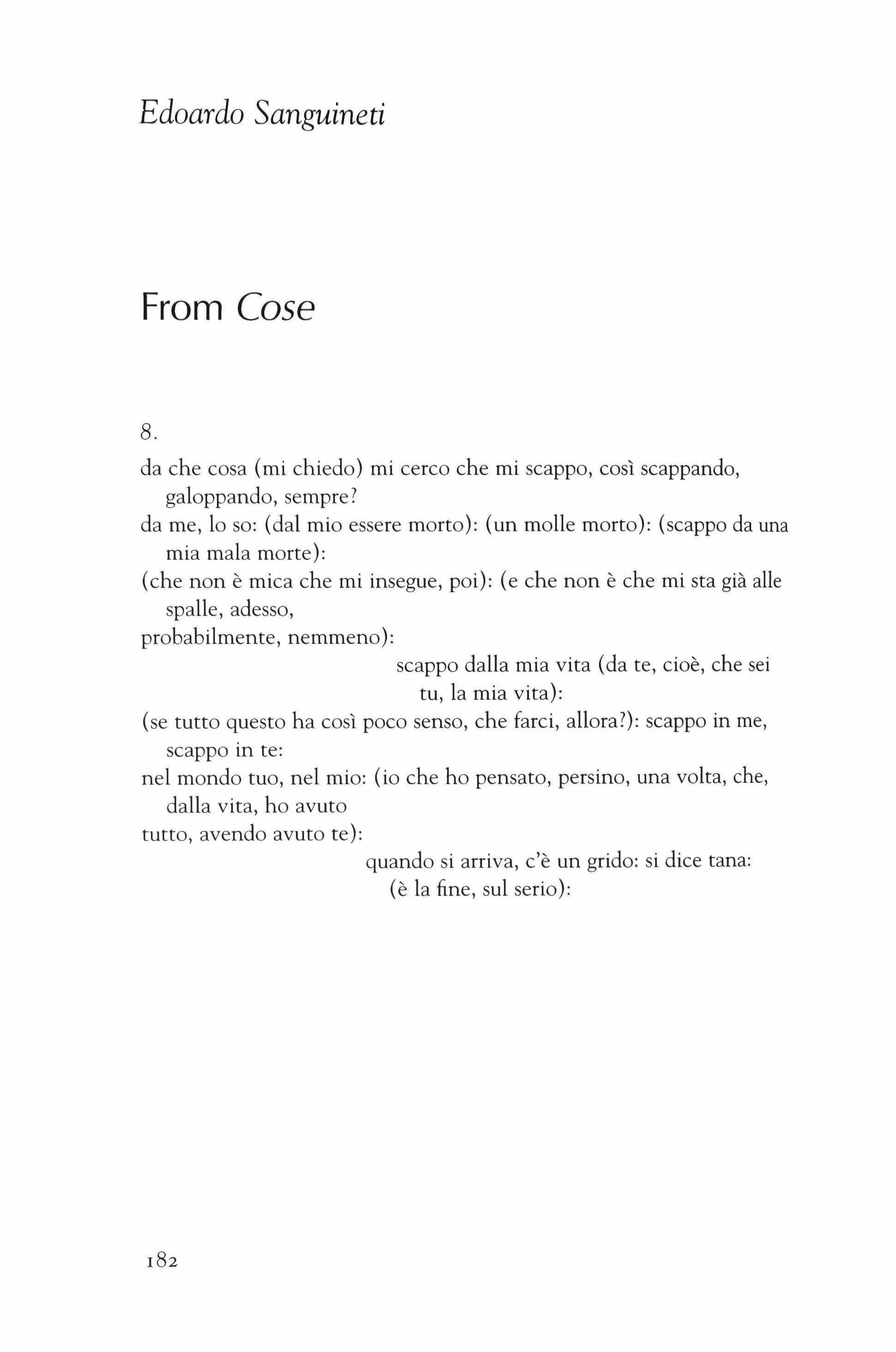
From Case
8.
da che cosa (mi chiedo) mi cerco che mi scappo, cost scappando, galoppando, sempre? da me, 10 so: (dal mio essere morro): (un moUe morto): (scappo da una mia mala morte ): (che non e mica che mi insegue, poi): (e che non e che mi sta gia alle spalle, adesso, probabilmente, nernmeno): scappo daUa mia vita (da te, cioe, che sei tu, la mia vita):
(se tutto questa ha COSt poco senso, che farci, allorai): scappo in me, scappo in te: nel mondo tuo, nel mio: (io che ho pensato, persino, una volta, che, daUa vita, ho avuto tutto, avendo avuto te): quando si arriva, c'e un grido: si dice tana: (e la fine, sul serio):
Translated by Patrizio Ceccagnoli and Susan Stewart

From Things
from what (I ask myself) do I look for myself, fleeing from it, fleeing like this, racing, always? from myself, I know: (from being dead): (a flabby death): (I flee my one bad death): (which is not really chasing me, after all): (and which isn't already on my tail at this moment, probably, either):
I flee from my life (from you, that is, for it's you, my life): (if all this makes very little sense, what then, should I do?): I flee into myself, I flee into you; into your world, into mine: (I even once thought that, from life, I had everything, since I had you): when you arrive, there's a scream: you say "ollie ollie in free": (it is the end, seriously):
8.

17.
c'e il pianobar, e vero, qui, in azione: (c'e la piscina blu, che e sottoposta ai fari pluricromatici, che mi semistrabicano, sernifilmicamente): (e qui significa, questa volta, semifellinianamente, al limite): (che e un limite cospicuo, qui, pero): (e pen) qui mi manca, persino, un ragazzino stile polonaise}: {stile mezzo coleta): che qui sarebbe convenientissimo, se mai fosse semibellissimo, pen) {semiviscontinianamentissimo, nei modi avant, nei modi apres deux guerres): (et avant et apres mille guerres, et aussi pendant, je sais, je sais tres bien}: io, dunque, mi sono visto, qui, una mostruosa mostra: (di amorini romani, amorosissimi: e amoralissimi, infatti): la vita e dura dura: la vita e una durissima cazzata eccitatissima: {io ti amo, amore):
18. la poesia, in un certo senso, e una macchina organica: {voglio dire, cioe, assai rigorosamente fisiologica): {che esige una manutenzione sorvegliata, cautelosamente controllata): (e come fare i tagliandi, per l'auto: anche se, come no? c'e la faccenda dei nove anni critici, per la revisione: io mi accontento, personalmente parlando, dei nove mesi da gestante classica): (la lubrificazione della versificazione e decisiva, comunque: da motore, da derma, anche da condom): rna vedi, idolo mio, mio carburante d'oro, mio tesoro: il mio olio poetico sei tu:

17.
there's the piano bar, it's true, here, happening: (there's the blue pool, under the multi-colored headlights, which semi-squint at me semicinematographically): (and here pointing out, this time, a semi-fellini-like ending): (but this is quite a remarkable ending, even so): (and even so, here, I miss a little boy in the polonaise style): (in halfcholera style): who, here, would be just the thing, if, however, he could be semigorgeous, but (semi-very-visconti-like, in his way avant, in his way apres deux guerres): et avant et apres mille guerres, et aussi pendant, je sais, je sais tres bien): well, I saw, here, a monstrous exhibition: (of Roman cupids, very venereal: and very amoral, in fact): life is hard hard: life is a very hard cock-up very worked up: (I love you, my love):
18.
poetry is, in a certain sense, an organic machine: (what I mean is, very rigorously physiological):
(that demands a vigilant maintenance schedule, carefully followed): (it's like getting the service schedule for the car: even if, why not? there are nine crucial years for the service: I am happy, speaking for myself, with the nine months of the classic pregnancy): (lubricating one's versifying is crucial, though: of the engine, of the skin, of the condom, too): but you see, my idol, my golden fuel, my treasure: my poetic motor oil is you:

l'imperativo categorico dice:
mangiare, bere, e, soprattutto, fottere: (fottere il pili possibile, per cerro): (e al meglio, se ci riesci, se ci puoi): (io ci ho speso una vita, a farti questo): (e adesso me 10 so, l'ho spesa bene):
dilettissirna cornplice, mia sposa: sono un gatto lupesco, e laido e lieto:
25.
186

the categorical imperative says: to eat, to drink, and above all, to fuck: (for sure, to fuck as much as you can): (and as best you can, if you can pull it off, if you can): (l spent a lifetime, doing this to you): (and now I know that I spent it well): my most beloved accomplice, my spouse: I am the wolfish cat, and filthy, and happy:
25.
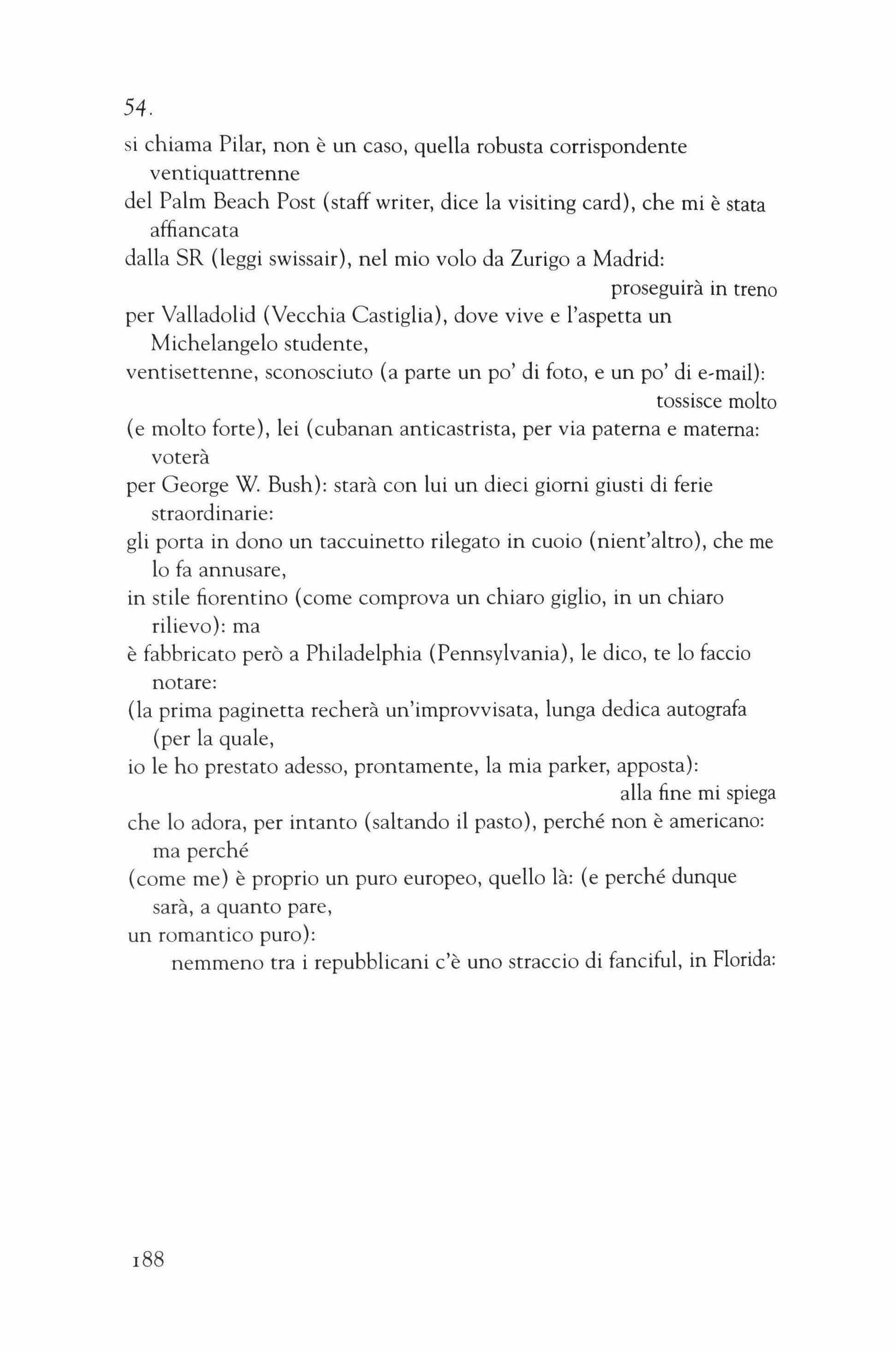
si chiama Pilar, non e un caso, quella robusta corrispondente ventiquattrenne
del Palm Beach Post (staff writer, dice la visiting card), che mi e stata affiancata
dalla SR (leggi swissair), nel mio yolo da Zurigo a Madrid: proseguira in treno per Valladolid (Vecchia Castiglia), dove vive e l'aspetta un Michelangelo studente, ventisettenne, sconosciuto (a parte un po' di foto, e un po' di e-mail): tossisce malta (e molto forte), lei (cubanan anticastrista, per via paterna e materna: votera
per George W. Bush): stara con lui un dieci giorni giusti di ferie straordinarie: gli porta in dono un taccuinetto rilegato in cuoio (nient'altro), che me 10 fa annusare, in stile fiorentino (come comprova un chiaro giglio, in un chiaro rilievo): rna e fabbricato pen) a Philadelphia (Pennsylvania), le dico, te 10 faccio notare: (la prima paginetta rechera un'improvvisata, lunga dedica autografa (per la quale, io le ho prestato adesso, prontamente, la mia parker, apposta): alla fine mi spiega che 10 adora, per intanto (saltando il pasto), perche non e americana: rna perche (come me) e proprio un puro europeo, quello la: (e perche dunque sara, a quanto pare, un romantico puro):
nemmeno tra i repubblicani c'e uno straccio di fanciful, in Florida:
54.
188

her name is Pilar, not by chance, that twenty-four-year-old robust reporter from the Palm Beach Post ("staff writer" says her business card), who has been seated next to me by SR (read Swissair), on my flight from Zurich to Madrid: she will continue on by train to Valladolid (Old Castille), where a student lives and waits for her, a certain Michelangelo, twenty-seven, unknown to her (except for a few pictures and a few e-rnails):
she coughs a lot (and very loudly) she (Cuban, anti-Castro, both on her mother's side and her father's: she will vote for George W. Bush): she will stay with him for only ten days of an amazing vacation: She brings him as a gift a little leather-bound notebook (nothing else), and she makes me smell it, it's in the Florentine style (as evidenced by a clear lily in clear relief): but it was actually made in Philadelphia (Pennsylvania), I tell her that, making you notice it: {the first little page will carry an improvised, long, dedication and signature (for which I loaned her, just now, without hesitation my Parker pen, for just that purpose):
finally, she explains to me that she adores him, for now (skipping the meal) because he isn't an American: because (like me) he is truly a pure European, that guy: (and because therefore he'll obviously be a pure romantic):
not even among Republicans is there a shortage of the fanciful, in Florida:
54.

59.
non hai l'idea come mi piace vivere (adesso): (ma un po'sempre, da sempre): ieri, al Louvre, te 10 confesso, ho pranzato, tranquillo, con sei distinti nomi femminili:
e a portarli, 11 in tutto, c'erano due ragazze: (anche troppe, dirai, che dirai bene):
per brevita, una era Barbara: (ma era anche Francisca e Carolina): (mezza attrice, e mezza, anche, terapista): (non l'ho capito, il suo metodo, ma importa poco): anzi, niente):
l'altra era DonateUa: (nonche, per puro amore di completezza, Elena e Maria): (conosco anche i cognomi: li trascuro): (e spaventoso, ma il caso (le hasard,
le plus grand des hasards par pur hasard) e pieno di senso): (e il senso): (e tutto): (questa parola (voglio dire: hasard) ha dominato la conversazione}: e ridevano
terribilmente, i sei nomi: (e dicevano, terribilmente, e il vino): (eravamo tre, dunque, parlavamo tre lingue: e non ci capivamo: (voglio dire non sempre}: pen),
eppure, noi ci siamo capiti: anche eccessivamente}: e ridevano eccessivamente {11, al ristorante del Richelieu, 1 er etage): ci guardavano tutti: ci invidiavano: (adesso, io 10 so, tu mi invidi, anche tu): (erano terrificati, tutti, perche ero vecchio, ma vivo): e siamo stati 10 scandalo, per un'ora e piu, di uno dei maggiori musei di questa mondo): (e ho cercato di capire, allora, che cosa mai potevano volersi, quelle, da me): (ed io, che cosa, io, mi volevo da queUe sei, da queUe due, non so, non 10 so bene): (che cosa mai non so, me 10 so bene); (adesso sto volando verso Genova); (io sto volando in tutti

you have no idea how much I like living (now): (but I always have, a little, since always): yesterday, at the Louvre, I confess to you, I had lunch, in peace, with six different women's names: and to bring them, all together there, there were two girls: (also too many, you'd say, and you'd be right): to get to the point, one was Barbara: (but she was also Francisca and Carolina): (half-actress, and half, as well, therapist): (I didn't understand her, her method, but it doesn't really matter): in fact, not at all}: the other was Donatella: (as well as, just to dot every "i," Elena and Maria): (I also know the surnames: I'm neglecting them): {it's frightening, but chance (le hasard, le plus grand des hasards par pur hasard) is full of sense}: (it is the sense): (it is everything): (this word (I mean: hasard) dominated the conversation}: and they laughed terribly, the six names: (and they said, terribly, it's the wine): (we were three, so, we were speaking three languages: and we didn't understand each other: (I mean, not always): but, even so, we understood each other: even more than was necessary}: and they laughed more than was necessary (there at the Richelieu restaurant, first floor): everyone was looking at us: they envied us: (now, I know, you envy me, you too): {they were terrified, all of them, because I was old, but alive}: {and we were the scandal, for an hour or more, of one of this world's most important museums}: and I tried to understand, then, what it was they could have wanted, those girls, from me}: {and I, what I myself wanted from those six, from those two, I don't know, I don't have a sense of it}: {whatever I don't know, I tend to know well} {now, I am flying toward Genoa}: (I am flying in all senses):
59.

quanti i sensi}: volo tra le tue braccia (come dicono, qui, taluni, talvolta): (e volo, uccello, dentro il tuo ventre):
Silvie, oggi, mi ha fatto tutto il suo oroscopo: (dopa le ostriche, la came, le pere con il cioccolato, il vino: sempre il vino, vedi, il vino rossa e il bianco zuccheroso): ho la mia pelle fresca, cost mi ha detto, e sto bene: io sono in forma: e avro una vita lunghissima (e lucida, e beata) (corne sua madre):
qui poteri scrivere (scriverti) in etemo: le donne, certo, sono il paradiso, rna tu, moglie mia, tu sei il paradiso dei paradisi: (l'ho detto anche ai sei nomi, e tu perdonami): (io non dovevo dire niente, e vero): (rna come si fa? corne si puo resistere?): (al paradiso non si resiste): (non ce la faccio, io almeno): dimenticavo di precisare che sono deux jeunes femmes (come dice Jean) di Rotterdam: (che ridevano, si, assai, te l'ho gia rivelato): (rna non erano felici, anche se 10 volevano, e 10 vogliono, almeno credo): (e non le ho fatte felici affatto, io, e sicuro): (pero, adesso, devi essere felice, tu, per me): l'assistente di volo, un uomo, vedendo che bevevo e bevevo, mi ha detto, proprio adesso, prenez-vous votre temps: (non era regolare, rna bevevo, atterrando: e l'ultima bottiglia, la terza, era un merlot du pays d'oc): (che delizial ):
c'e una parola olandese, speciale (ho fatto male a non notarla, scritta), per esprimere, semivolgarmente (non necessariamente volgarmente), il piacere:

I fly into your arms (as they say here, someone, sometimes): (and I fly, like a bird, inside your womb):
Sylvie, today, told me her whole horoscope: (after the oysters, the meat, the pears with chocolate, the wine: always the wine, you see, the red wine and the sweet white one): I keep my fresh complexion, so she told me, and I am well:
I am in good shape: and I will have a very long life (and lucid and blessed) (like her mother): here I could write (write to you) for all eternity: women, certainly, are paradise, but you my wife, you are the paradise of paradises: ( I told that also to the six names, and you, please forgive me): (I should not have said anything, it's true): (but how can one do it? how can one resist?): (you do not resist paradise): (I cannot manage to, at least I cannot): I've been forgetting to explain that they are deux jeunes femmes (as Jean says) from Rotterdam: (that there were laughing, yes, a lot, as I've already revealed to you): (but they were not happy, although they wanted to be, and still want to, at least I think so): (and I didn't make them happy at all, not I, that's for sure): (however, now you, you have to be happy, for me):
the flight assistant, a man, seeing that I was drinking and drinking, told me just now: prenez,vous votre temps: (it wasn't allowed, but I was drinking, while we were landing: and the last bottle, the third one, was a merlot du pays d'oc: (what a delightl): there is a dutch word, a special one (l was wrong not to note it, to write it down) to express, semi,vulgarly (not necessarily vulgarly), pleasure:
193
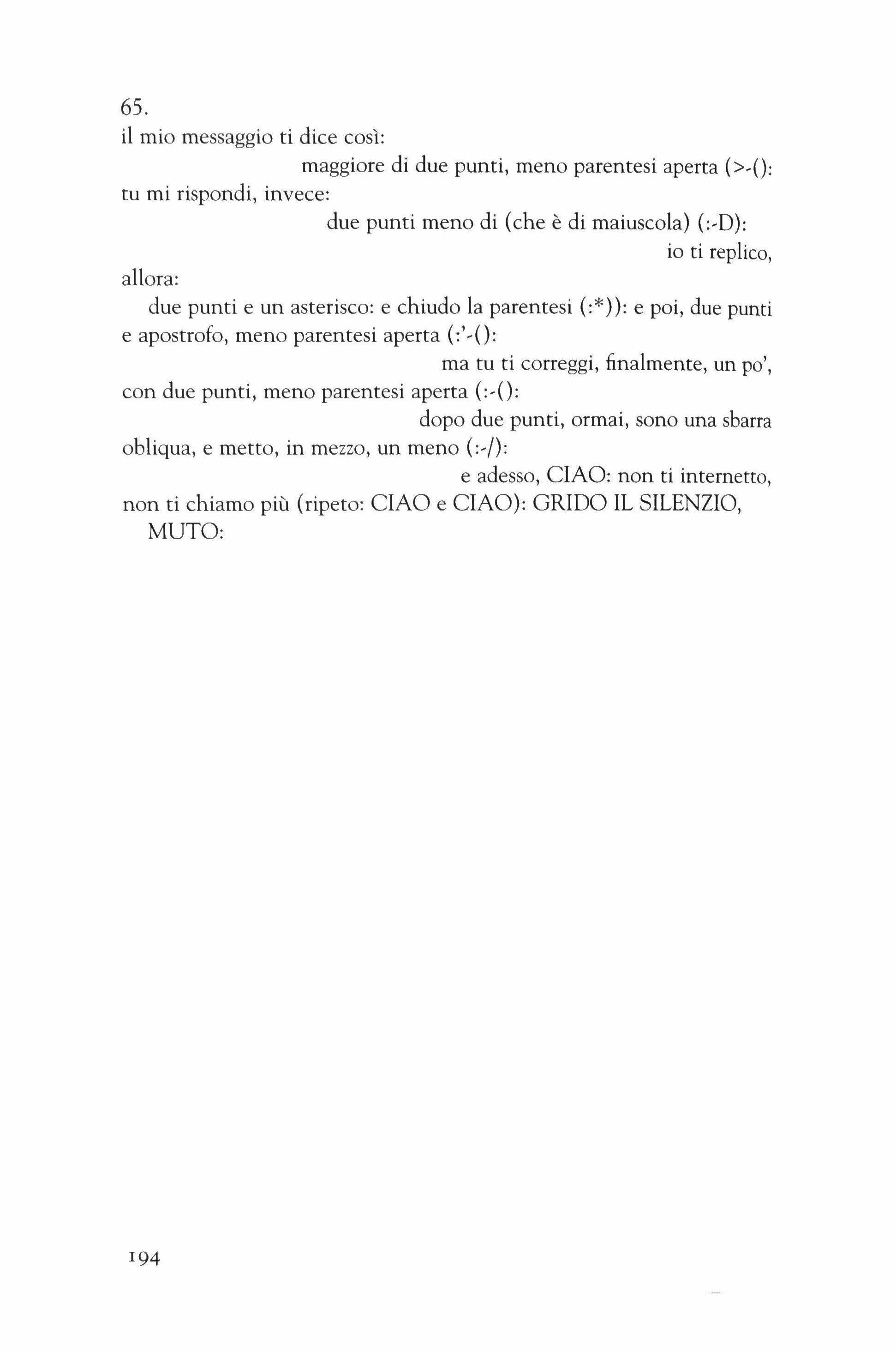
65.
il mio messaggio ti dice COSt:
maggiore di due punti, meno parentesi aperta (>-0: tu mi rispondi, invece:
due punti rneno di (che e di maiuscola) (:-O): io ti replica, allora:
due punti e un asterisco: e chiudo la parentesi (:*}): e poi, due punti e apostrofo, meno parentesi aperta (:'-0: rna tu ti correggi, finalmente, un po', con due punti, meno parentesi aperta (:-0: dopo due punti, ormai, sono una sbarra obliqua, e metto, in mezzo, un meno (:-/): e adesso, CIAO: non ti intemetto, non ti chiamo pili (ripeto: CIAO e CIAO): GRIDO IL SILENZIO, MUTO:
194

my message tells you so:
greater than a colon, minus the open parenthesis {>-O: instead, you answer:
a colon minus d (which is a capital d) (:-O): I reply to you, then:
a colon and an asterisk: and I close the parenthesis (:*)): and then, a colon and an apostrophe, minus the open parenthesis {:'-{): but you correct yourself, finally, a little, with a colon, minus the open parenthesis {:-O: after two minutes, at last, I am a back slash, and I put, in the middle, a minus (:-/): and now, CIAO: I'm not pinging you, I'm not calling you any more (I repeat: CIAO and CIAO): I SCREAM THE SILENCE, MUTE:
65.
195
Patrizia Valduga

Ho veduto due mosche un certo giorno: cento colpi al minuto, mi hanno detto.
Le sue mani ho veduto a te dattorno, ti stringeva alle reni con diletto.
Spargi seme, dannato capricorno, a caso, dove viene viene A letto, gia", nel gioco dei ditteri l'esperto! o gran clio, nell'inferno son per certo!
Translated by David Lummus, Susan Stewart, andRobert Pogue Harrison

I saw two flies on a certain day a hundred beats a minute, they say. I saw her hands wrapped around you tight, clutching your waist with crass delight you scatter your seed, you damned capricorn, here and there, where it comes, it comes. In bed you're the expert at the flies' games. o great god, I'm surely in hell's flames.
I97
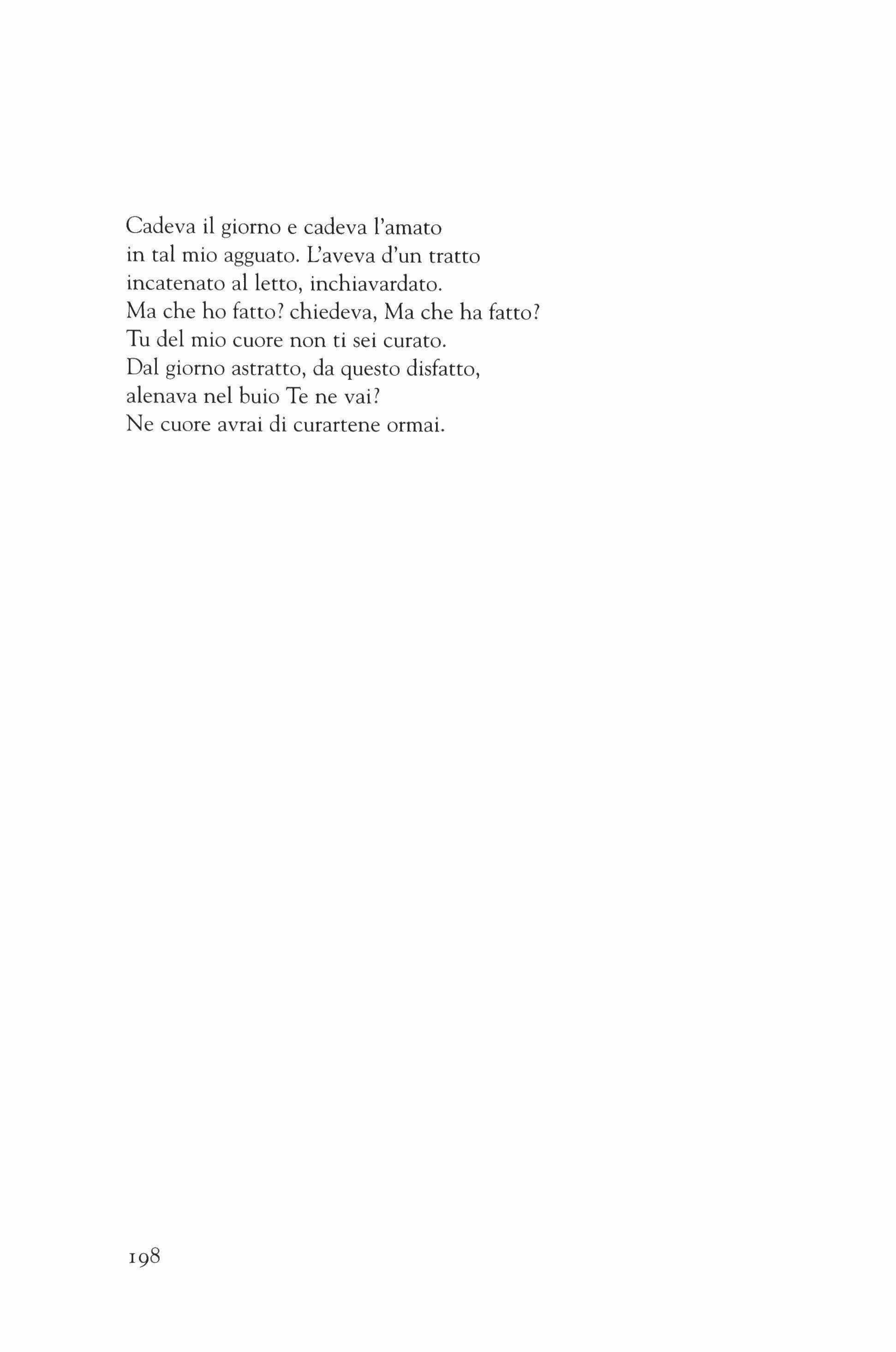
Cadeva il giorno e cadeva l'amato in tal mio agguato. L'aveva d'un tratto incatenato al letto, inchiavardato.
Ma che ho fatto? chiedeva, Ma che ha fatto?
Tu del mio cuore non ti sei curato.
Dal giorno astratto, da questa disfatto, alenava nel buio Te ne vai?
Ne cuore avrai di curartene ormai.

The day was falling and my lover was falling into my trap. I had, for a while, chained him, confined him to the bed.
"But what did I do?" he asked. But what did he do?
"You didn't take care of my heart," I said.
Out of that vague day, out of this undoing, he panted in the dark, "Are you leaving?"
You'll have no more heart to take care of now.
199

Ti voglio far provare il bel piacere.
Pur mal mio grado? Lasciami tranquilla!
Da troppe sere e troppe primavere
Dei superni desiri ecco la squilla.
La luna scorre su acque nere e brilla
Oh, tu vai alto per volermi avere!
Ed io ti prendero come un'anguilla.
Dentro da me per vie d'acqua 0 vie aeree
E perche pili e pili in te s'interni
Entrerai mai e mai, primavere 0 inverni.
Dall'alto scendero con giri alterni
Pensatore di donne, mio amatore
Fin ch'io ti prenda, fin che l'incaverni
Ad averti c'e poco per il cuore.
200
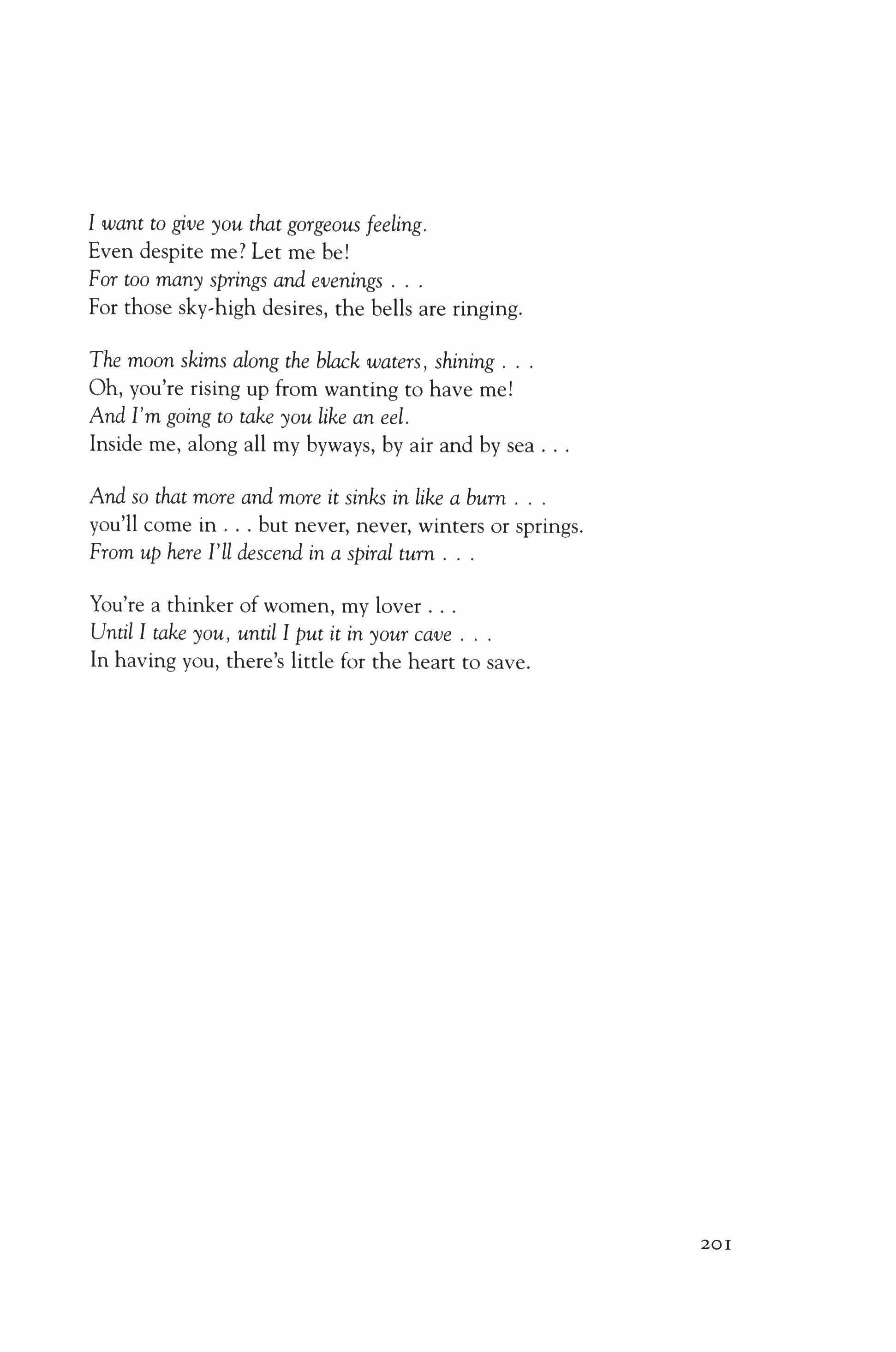
I want to give you that gorgeous feeling. Even despite me? Let me be!
For too many springs and evenings For those sky-high desires, the bells are ringing.
The moon skims along the black waters, shining Oh, you're rising up from wanting to have me! And I'm going to take you like an eel. Inside me, along all my byways, by air and by sea
And so that more and more it sinks in like a burn you'll come in but never, never, winters or springs. From up here I'll descend in a spiral turn
You're a thinker of women, my lover Until I take you, until I put it in your cave In having you, there's little for the heart to save.
201

In nome di Dio, aiutami! Che tanto
amor non muta e muta mi trascino.
Ancora sete ho di te soltanto sola a te solo e col sole declino.
o marea d'amore viverti accanto
e arresto del cuore, amor-mio divino, che etemi della vita luce e canto.
La mia ne muore dal ricordo sino
al qui ancora verso il cuore in cammino, verso te, mio dissorte eppur destino
se non di morte ora di te rimpianto
e il mare discolora il mio mattino.
Ma tu incatenami all'amato incanto, resta, e giomo, vieni pili vicino.
202

For God's sake, help me! That so much love not alter, while, altered, I drag myself along. Even so, I'm thirsty for you only alone, yours alone, and the sun far gone.
o what a tide of love to live beside you, it's heart-stopping. My love, so divine, you make the light and song an endless line of life. My own life dies from the memory that rises here, still toward my heart, toward you, my distorted consort, yet a destiny if not of death now of longing for you and the sea paints my morning pale. But you, chain me to my favorite love-spell it's day, come a little closer, stay a while.
203
Paolo Valesio

Testavuota
A volte la mia testa e una zucca. Brava zucca barucca che accogli le preghiere dentro la tua vuotaggine e le lasci scorribandare!
204
Translated by Patrizio Ceccagnoli and Susan Stewart

Empty Head
Sometimes my head is a pumpkin. Good pumpkin lumpkin, you welcome the prayers inside your emptiness and let them have a field day!
205
Predica agli animali
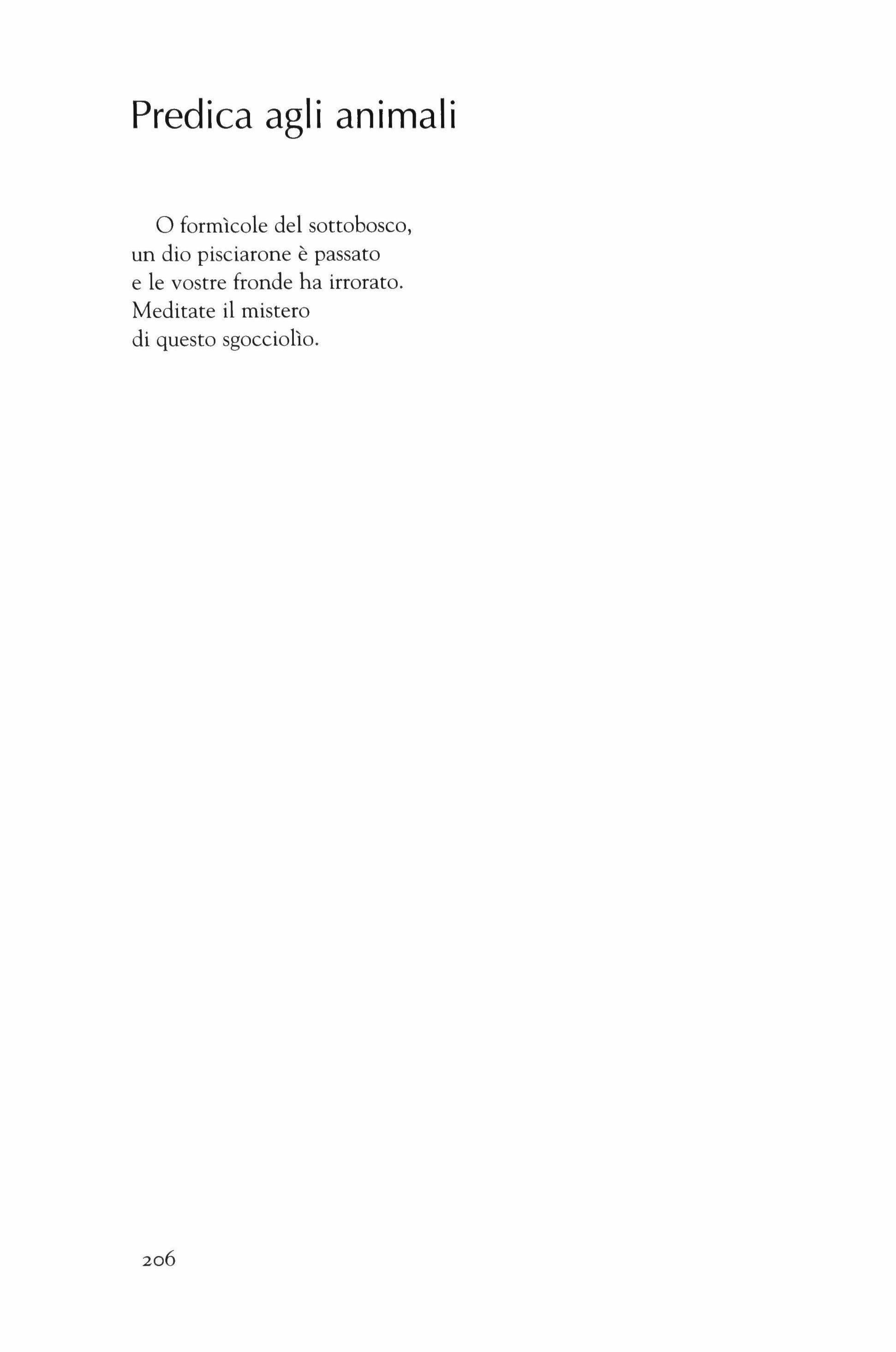
o formtcole del sottobosco, un dio pisciarone e passato e le vostre fronde ha irrorato. Meditate il mistero di questa sgocciolto.
206
Sermon to the Animals

Oh tiny pretty ants from the underwood, a great big pissing god has passed by and sprinkled your branches. Meditate on the mystery of this drip, drip, drip.
207
Progresso regresso

Una volta parlavano, i poeti, del cielo indifferente alle sciagure umane.
Ma questa era prima del tempo degli aerei: adesso anche il cielo e devastato e infoschito e fumatoe umiliato costretto a immischiarsi con gli umani.
("Ground Zero," 13 Ottobre 2001)
208
Progress/Regress

Once they, the poets, used to speak about the sky, indifferent to human disaster. But this was before the time of the planes: now, too, the sky is devastated and darkened and full of smokeit is humiliated that it must mingle with human beings.
("Ground Zero," 13 October 2001)
209
Postnovecento

Hamlet: a certain convocation of politic worms are e' en at him. Your worm is your only emperor for diet
(Hamlet, IV, 3)
Che la destra non sappia che mai fa la sinistra, e viceversa. Ma la mano sinistra e la destra sono entrambe maldestre.
Guardale qui: l'una e distesa, l'altra e raggrinchitaappartengono a due esanimi corpi brulicanti di vermi politici, come sacchi abbandonati nella prigione sfondata del Novecento.
210

After the Twentieth Century
Hamlet: a certain convocation of politic worms are e' en at him. Your worm is your only emperor for diet
(Hamlet, IV, 3)
That the right hand not know what the left is doing, and vice versa. But the left hand and the right hand are both unhandy. Look at them here: one is stretched out, the other is balled upthey belong to two lifeless bodies, swarming with political worms, like abandoned sacks in the bottomed-out prison of the twentieth century.
211
II de-centro

Chi punta al girasole punta al sole
e chi scaglia i suoi dardi verso il sole
si e scelto un bersaglio
che e un accecante barbaglio
e non si lascia centrare.
Ma basta aver provato una volta, e diventa impossibile rinunziare alla sfida.
212
The Decentered

Whoever aims at the sunflower aims at the sun and whoever hurls darts at the sun has chosen a target that is a blinding dazzle and it won't let itself be hit. But it is enough to have tried once, and it becomes impossibile to renounce the challenge.
213
Andrea Zanzotto

LIGONAs'
I
Quell'intimo splendore di "c'era una volta" e che da dirupati anni mi resta diviso
Stillicidi in colline stradine e giardini e anche la nel mistero che s'addensa ai Palir' che dagli oblo di Ligonas s'indovinanoed e, tutto, colmo calice di nivale dolcezza di nivale attitudine ad appianare, sanare, e-in-se-e-per-se di neve involata, di soli involatiSole, rna timido per geli, rna quasi supplicante tregue almeno di poche ore, deh! ore pur sempre d'etra purissimo, ah! e neve augurata, rna solo di tocco in tocco, tatti, contatti, feste, agguati placatiappena sopravvivente rna ben decisa a tutto sopportare per esistere qui e rifigurare, adeguare, verde e polveri e voci di altre ragioni E ogni sole e neve, punto di sole 0 neve
1. Grande casa-osteria in aperta campagna. II toponimo, di origine incerta, figurava sulla facciata. Nel tempo scomparve e ora e stato ripristinato.
2. PaIu: chiarnati anche Val Bone, sono zone acquitrinose che gia dal rnedioevo erano state "strutturate" in varie forme, specie dai cistercensi, e trasformate in vaste scacchiere di prati circondati da acque correnti e da alberature di diverso carattere, conservate con memore animo attraverso i secoli. L'attuale espansione di insediamenti industriali 0 abitarivi e la necessita di ampliare la rete stradale, ormai trombotica, soprattutto net Veneto, cui si aggiunge un'agricoltura cieca e invasiva, rninacciano oggi di far del tutto sparire questi veri e propri capolavori di "land art," che erano anche utili economicamente, per prati da sfalcio, acque neche di pesci, ecc.
214
Translated by David Lummus

IThat intimate splendor of "once upon a time" and which for craggy years has been separated from me
In the hills paths and gardens and even there in the mystery that condenses in the Palu/, drippings are divined from the portholes of Ligonas->and it is, all of it, a chalice full of snowy sweetness of a snowy ability to smooth and to heal, it-is-in-itself-and-for-itself made of vanished snow, of vanished sunsSun, but timid from the frosts, but almost begging for truces-for at least a few hours, eh! hours still of the purest ether, ah! and the welcome snow, though only touch by touch, tactile, contacts, festivals, calmed snaresjust barely surviving but quite determined to tolerate anything so as to exist here and to refigure, to adapt, green and dust and voices of other reasons And every sun and snow, a point of sun or snow
1. A big tavern-house in the open country. The place-name, of uncertain origin, was on the face of the building. It disappeared over the years, but now it is being used again.
2. Palu: also called Val Bone. These are swampy areas "structured," since medieval times, into different shapes, mostly by Cistercian monks. They were tuned into a vast echelon formed of fields surrounded by flowing waters and different kinds of trees, and preserved conscientiously throughout the centuries. The present growth of industrial and urban areas and the necessity to increase the by-now thrombotic system of roads, especially in the Veneto, not to mention the heedless and invasive agriculture, are threatening to make these masterpieces of"land art" completely disappear, though they were once economically useful for hay fields, fishing waters, etc.
2I5

va per beatamente allacciare gli estremi di foco-Iuce e di gelo negato-negante, li allaccia per solo un dito e poi per dita e fiati e fiati e baci e baci
E anche le pili avverse potenze nel destino comune si fanno carezze e nozze e illimiti titillii
fanno corona di gioia-lutto-iddii: qui il dirupo del '29, del '54, del '63 megainvemi ed altri dirupi di neve-sole di sommi-inverni si colmano, si ritrovano in seconda fila; e i bambini in slittino si lasciano andare appunto di dirupo in dirupo da dirupi alti tre dita 0 alti tre millenni e tutto e bambino in tintinno con loro, indenni tra gloriuscole-ornbra gia al primo pomeriggio
Fatate dimenticanze gia tentano e ritentano, magici sottozero decine di sottozero, terribili eppure dolcemente ridenti, irrisivi fino all'indaco al turchino preparano le irte, irsute d'addiacci, nottate che si danno la voce di campo in campo, di annate in annate.
216

goes blessedly to bind the extremes of hearth-light and the frozen negating-negation, it binds them by a single finger and then by fingers and breaths and breaths and kisses and kisses And even the most adverse powers of common destiny turn into caresses and weddings and limitless titillations they make a crown of joy-grief-gods: here the crag of '29, of '54, of '63-all mega-winters and other crags of snow-sun in supreme winters fill up and find themselves in second place; and the children in their sleds fling themselves pointedly from crag to crag from crags three fingers or three millennia high and it's all a child jingling in harmony with them, undamaged among tiny glories-shadows already in the early afternoon Fairytale forgettings already tempt and tempt again the magic of subzero ten times subzero, terrible and yet sweetly smiling, scornful to the degree of indigo then turquoise, they prepare the bristling-bristly with fenced folds-nights that call to one another from field to field, from year to year.
217

No, tu non mi hai mai tradito, [�fles8:ggie] su te ho riversato tutto cio che tu infmito assente, infinito accoglimento non puoi avere: il nero del fato/nuvola avversa 0 della colpa, del gorgo implosivo. Tu che stemperi in quinte/silenzi indifferenti e pur tanto attinenti, dirimenti l'idea stessa di traumatu restio all'ultima umana cupidita di disgregazione e torsione tu forse ormai scheletro con pochi brandelli rna che un raggio di sole basta a far rinvenire, continui a darmi famiglia con le tue famiglie di colori e d'ombre quete rna pur mosse-da-quiete, tu dai, distribuisci con dolcezza e con lene distrazione il bene dell'identita, dell' "io," che perennemente poi toma, tessendo infinite autoconciliazioni: da te, per te, in teo
Tu mal noto, sempre a te davanti come stralucido schermo, o dietro sfogliato in milioni di fogli, mai camminato quanta pur si desidera, da ben prima del nascere: rna perche furiosa-dispotica-inane l'ombra del disamore della disidentificazione s'imporrebbe qui nei giri, strati e salti, nelle tue dolci tane?
Ma no. Con frementi tormente di petali di meli e di ciliegi con rapide rapide nubi di petali e baci tu mi hai ieri, ieri? accarezzato? Gremite assenze, ombre grementi alle spalle
II
218 Ligonas
Ligonds

No, you have not betrayed me, [lB:f'l:aSeB:fle] onto you I have poured out all that youinfinite absence, infinite acceptancecannot have: the black of fate/cloud of hostility or of fault, of the implosive vortex. You who water down in indifferent and yet so relevant, absolute, scenes/silences the very idea of traumayou who oppose the ultimate human greed for disaggregation and torsion you, perhaps now a skeleton in meager rags -though a ray of sun is enough to revive ityou continue to give me a family with your families of colors and of shadows that are quiet albeit agitated-by-quiet, you give, dole out sweetly and with delicate distraction the good identity of the "I", which then perennially returns, twining infinite self-conciliations: by you, through you, in you.
You, poorly known, always ahead of yourself like a super-bright screen or behind, leafed through in millions of leaves, never walked upon even as much as one desires, from well before birth: but why furious-despotic-inane would the shadow of disaffection of dis-identification insinuate itself here in the courses, strata, and stands, in your sweet lairs?
But no. With trembling torments of apple blossoms and cherry blossoms with rapid, rapid clouds of blossoms and kisses did you, yesterday-yesterday?--caress me? Crowded absences, shadows crowding at the back
II
219

di quanta fu e sara, petali petali amatamente dissolti nelle alte dilavate erbe-e laggiu tra i meli
stralunati presagi di sera
In petali, piogge pure, lune sottili dacci secondo i nostri meriti pochi rna come immensi, da che solo in mitezza per te mi pensi e in reciproco scambio di sonni amori e sensi da questa gran casa LIGONAs dalle sue finestrelle-occhi all'orlo del nulla io ti individui per sempre e in te mi assuma.
220

of all that was and will be, blossoms, blossoms belovedly dissolved in the high faded grasses, and down among the apples moon-wild presages of evening In blossoms, pure rains, and subtle moons grant to us according to our merits, only a few, but as if immense, grant that only in gentleness toward you may I think myself and in mutual exchange of sleep, love, and sense -from this great house LIGONAs from its window-eyes at the edge of nothingnessthat I may single you out forever and be assumed in you.
221
Luce raggiunta infine, raggiungibile in ogni sua pili riposta volonta di astrarsi e separarsi-ma inducendo e producendo il creabile
Eppure e come priva di consistenze tanto e limpida e dilavata tanto e soccorrevole e conosciuta tanto e felicemente sconosciuta
Luce che e pur sempre da indagare e che si fa amare COSt a perdifiato rna anche con calma divina come bambina 0 sorella
E c'e presa, in lei, di inutili e pur sagge forze che sublime-mente vengono sperperate ed anche risparmiateequilibrio e risparmio in forre e piagge e pure vento di innumerabili prospettive e cio che chiama a rincorrere, a voglie di inseguimenti-e ora ora--dalle finestrelle sempre fervideliete di Ligonas s'involve e cede, brevissima spuma ultima dei giomi della bruma;' e poi stella dell'ineguagliabile golfo di nadir trasfuso da sogni e notti onir oniriche, effuso alluso.
Vagare e sopore rna che trabocchi inavvertitamente, orienti il niente e sei pur sempre in fase di ristorare da ogni dubbioso esito da ogni remora da ogni dispersa frase. Cost che par che tutto
(Ligonas)
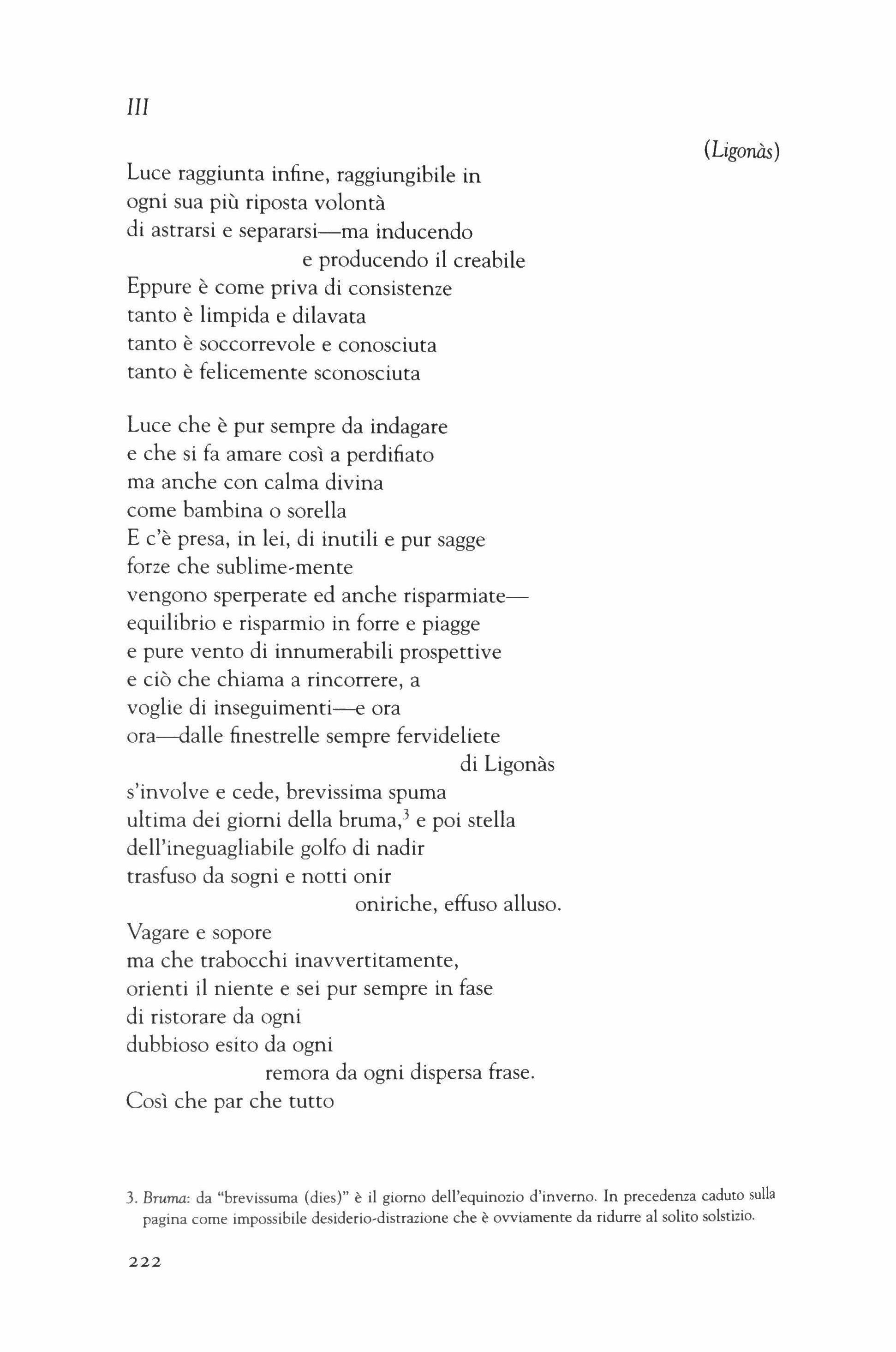
3. Bruma: da "brevissuma (dies)" e il giomo dell'equinozio d'invemo. In precedenza caduto sulla pagina come impossibile desiderto-distrazione che e ovviamente da ridurre al solito solstizio.
III
222
(Ligonds)

Light-reached in the end, reachable in all its most secret will to abstract and separate itself-but inducing and producing the creatable And yet it is as if devoid of consistencies so limpid and pale so helpful and well-known so happily unknown
Light, which is still to be investigated and which endears itself with such breathless speed but also with a divine calm like a child or sister and there's a grasp she has of useless and yet wise forces that sublimely get squandered and also conservedbalance and conservation in gorges and slopes and yet a wind of countless prospects and that which involves the chase, new desires for pursuits-and now now-from the ever cheerfully fervid windows of Ligonas enwraps itself and gives in, the briefest foam, last in the days of the haze:', and then a star of the incomparable gulf of nadir transfused effused alluded by dreams and oneir oneiric nights.
A drowsy wandering but one that unexpectedly overflows, you guide the nothingness and yet are always in the phase of restoring from every doubtful outcome from every hesitation from every scattered phrase. So that it seems that everything-
3. Haze: the word bruma, deriving from the Latin "brevissuma (dies)," here means the day of the winter equinox. It previously showed up on the page as an impossible desire (or perhaps distraction) for a winter equinox instead of solstice. In any case, haze must perforce refer to the winter solstice.
III
223

in collinari accenni resi pulviscolo di mirabilia
somigli a quanta si assottiglia d'orizzonti, COSt che sia fonte di molto pili che se, prati da se figliantisi con verde del frumento nel refolo d'un accento.
E una fogliola che cadendo, sola, nellontanissimo di un centro senza senso. In un dove eccentrico nel suo stare, ad ogni cosa fornisce prove: luce in se intenta a sfidarsi a sfidare.
224

in hilly hints turned into a dust of marvelsresembles the thin line of a diminishing horizon, so that it may be a source of much more than itself, fields by themselves coupling with the green of the grain in the gust of an accent. And a leaf that in falling, alone, in the extreme distance of a senseless center, in a where that's eccentric in its being there, bears witness to each thing: light itself intent on challenging itself to challenge.
225

Sette
Poeti per Rainer Maria Rilke / Seven Poets on Rainer Maria Rilke
 Edited by Roberto Dossi
Edited by Roberto Dossi
Translated by Robert Pogue Harrison and David Lummus
227
Paolo Frigerio
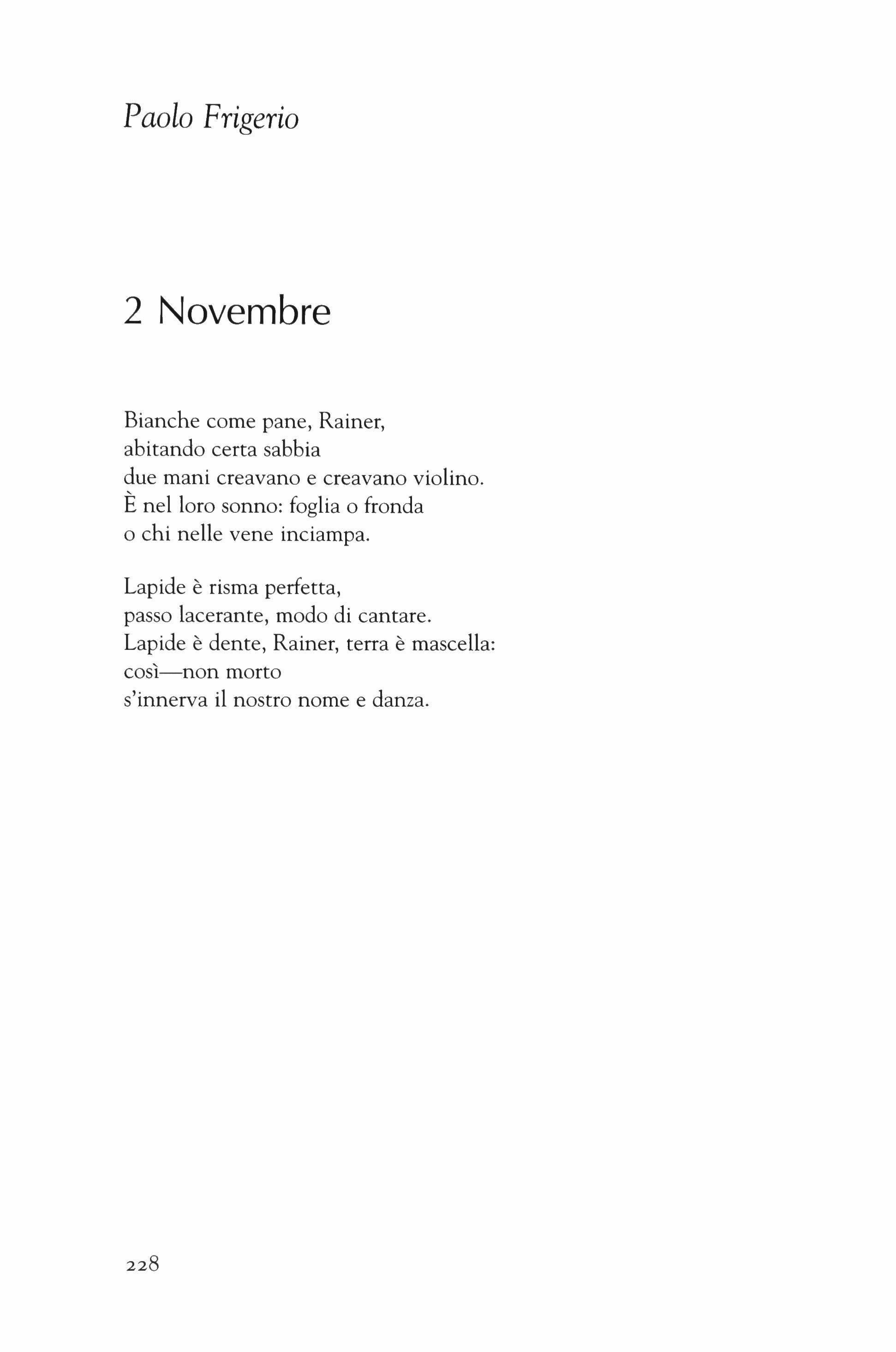
2 Novembre
Bianche come pane, Rainer, abitando certa sabbia due mani creavano e creavano violino. E nel loro sonno: foglia 0 fronda o chi neUe vene inciampa.
Lapide e risma perfetta, passo lacerante, modo di cantare.
Lapide e dente, Rainer, terra e masceUa: cost-non morto s'innerva il nostro nome e danza.
November 2nd

White like bread, Rainer, inhabiting a certain sand two hands were creating and creating violin. It's in their sleep: foliage or frond or one who trips over veins.
Tombstone is perfect ream, a lacerating step, a manner of song. Tombstone is tooth, Rainer, earth its jaw: so-not dead our name comes alive and dances.
229
Giulio Marzaioli
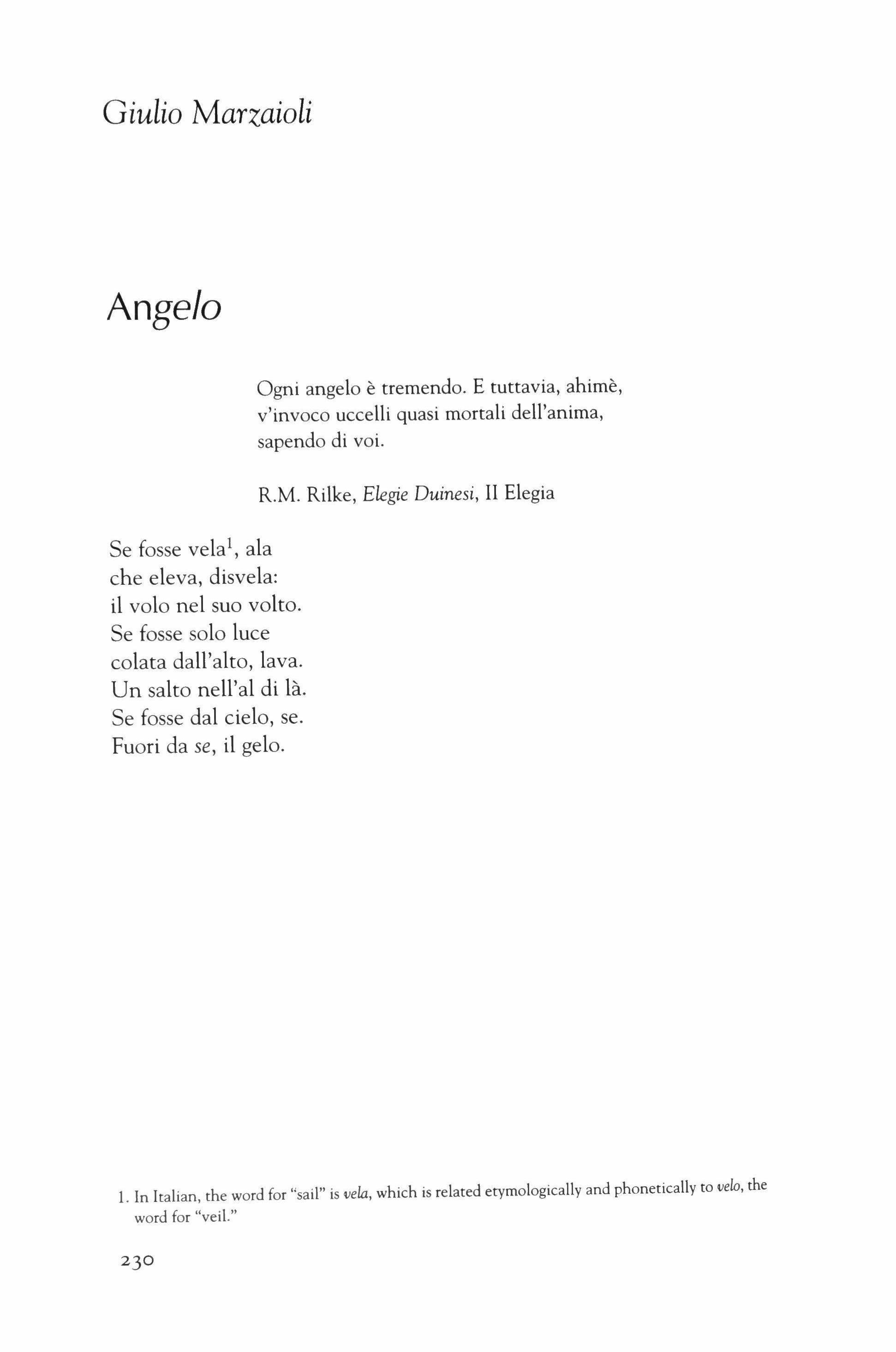
Angelo
Ogni angelo e tremendo. E tuttavia, ahime, v'invoco uccelli quasi mortali dell'anima, sapendo di voi.
R.M. Rilke, Elegie Duinesi, II Elegia
Se fosse vela1, ala che eleva, disvela: il volo nel suo volto. Se fosse solo luce colata dall'alto, lava. Un salto nell'al di lao Se fosse dal cielo, se. Fuori da se, il gelo.
1. In Italian, the word for "sail" is vela, which is related etymologically and phonetically to velo, the word for "veil."
23°
Angel

Every angel is terrible. And still, alas, knowing all that I serenade you, you almost deadly birds of the soul.
R.M. Rilke, Duino Elegies, Elegy IF
If it were a sail, a wing that elevates, unveils: flight face to face. If it were only light filtered from above, lava. A leap into the beyond. If it were from the sky, if. Beyond if, the gelid.
2.
231
As translated by David Young in Duino Elegies (W.W. Norton & Co., Inc., 1978).
Nicola Dal Falco

Oracolo
di fortezza
Olio, fiore franto in frutto con pienezza di pietra come un abbraccio, una stretta d'ossi e lusinghe e patti sulle labbra;
riscorre fino all'albero, alla vita pura, un vapore verde di promesse, tiepido profumo che si incide tra due costole, sapore, corpo e vista di cose narrate.
232
Oracle of Strength

Oil, fractured flower in fruit with plentitude of stone like an embrace, a squeezing of bones and allurements and pacts on lips; it flows again down to the tree, to the pure life, a green vapor of promises, tepid perfume that is engraved between two ribs, taste, body and vision of things told.
233
Massimo Scrignoli

Una voce di ritorno per Rilke
(pensando al suo misterioso Bohusch)
Proprio non saprei dire se era pioggia 0 neve quel ciglio di bora neppure so dove sia meglio perdersi a Mala Strana un'ora prima dell'alba o passata appena la morte di dicembre. Ma sono sicuro che ancora Re Bohusch ogni giovedl santo nella chiesa aspetta dalla grata la voce tra le voci dell'amata pallida e segreta.
Anche se di sera l'ombra di Praga si stacca dalla Torre delle Polveri come una mammina con gli artigli, e gia dona il titolo vuoto a una nuova storia.
234
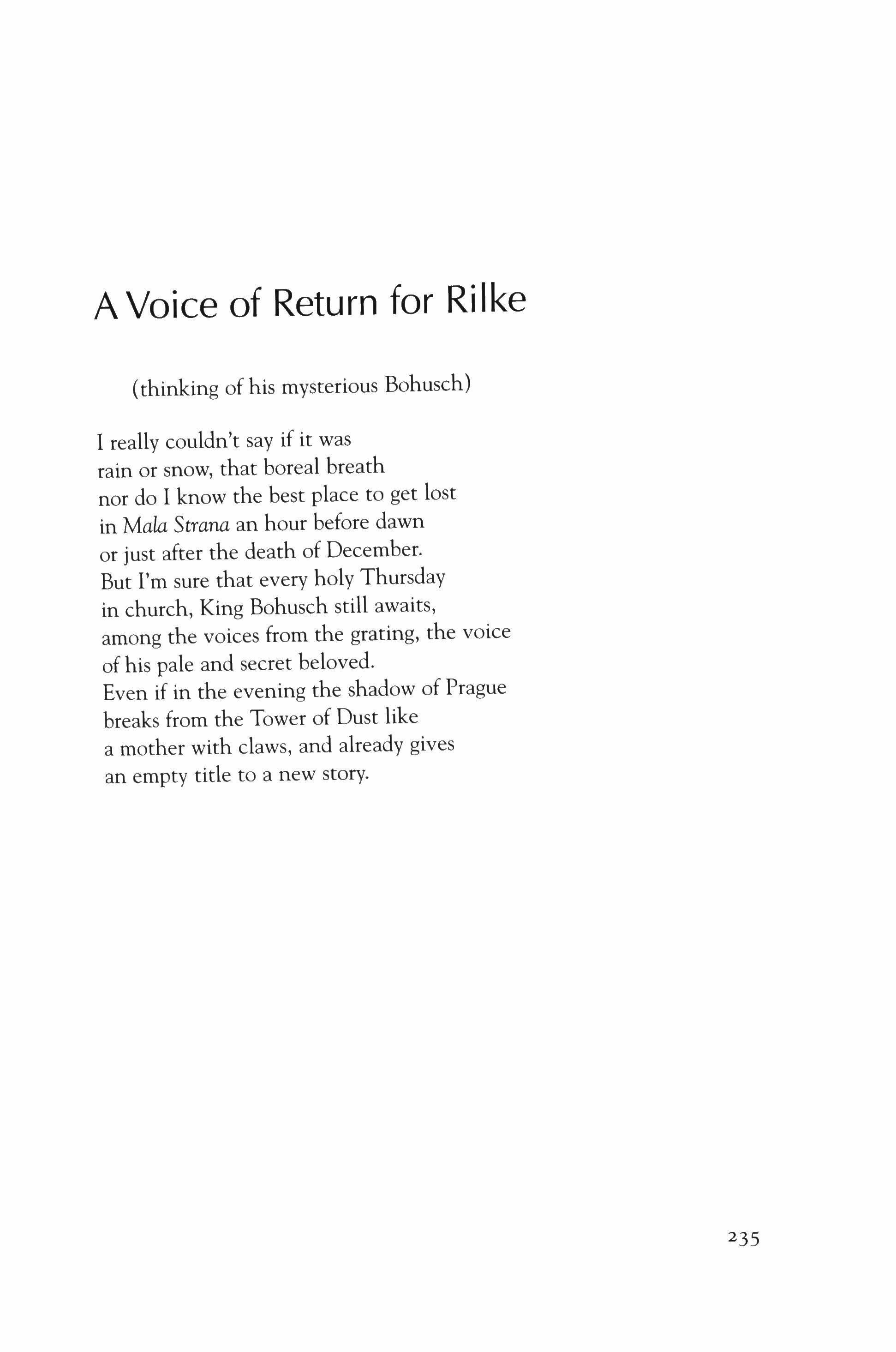
A Voice of Return for Rilke
(thinking of his mysterious Bohusch)
I really couldn't say if it was rain or snow, that boreal breath nor do I know the best place to get lost in Mala Strana an hour before dawn or just after the death of December. But I'm sure that every holy Thursday in church, King Bohusch still awaits, among the voices from the grating, the voice of his pale and secret beloved. Even if in the evening the shadow of Prague breaks from the Tower of Dust like a mother with claws, and already gives an empty title to a new story.
235
Fabiizio Falconi

Forte morte
Al tremore, e al cuore avresti voluto allacciare, non al vento, gli occhi di Paula, che ti volavano via come artigli, prima di prenderti. Perche, se dubitavi della logica e della convenienza del trattenere, e davi credito allibero gioco, di chi ama veramente, perche: piangevi, come un nomade, sotto il cielo di Parigi, abbastanza nordico, ti laceravi le vesti, abbaiando come un cane abbandonato, per la Sua morte?
Di lei, di Paola, restavano gli occhi neri come perle nere, e i colori in festa, come di te restano tutte le parole in fila come celeste convoglio, tratta di messi buone per i viventi, e per il tempo loro assegnato.
Force of Death

To the tremor and to the heart you would have liked to bind, not to the wind, Paula's eyes, which flew away from you like claws, before seizing you. Why, if you doubt the logic, the convenience of restraint, if you believed in the free play of one who truly loves, why did you cry like a nomad, beneath the Paris sky, Nordic enough, why did you tear your clothes, barking like an abandoned dog, for Her death?
Left of her, Paula, were the eyes black like black pearls, and the festive colors, like of you all the words are left lined up like a heavenly convoy, trafficking in good harvests for the living, and for their assigned time.
237
Nina Maroccolo
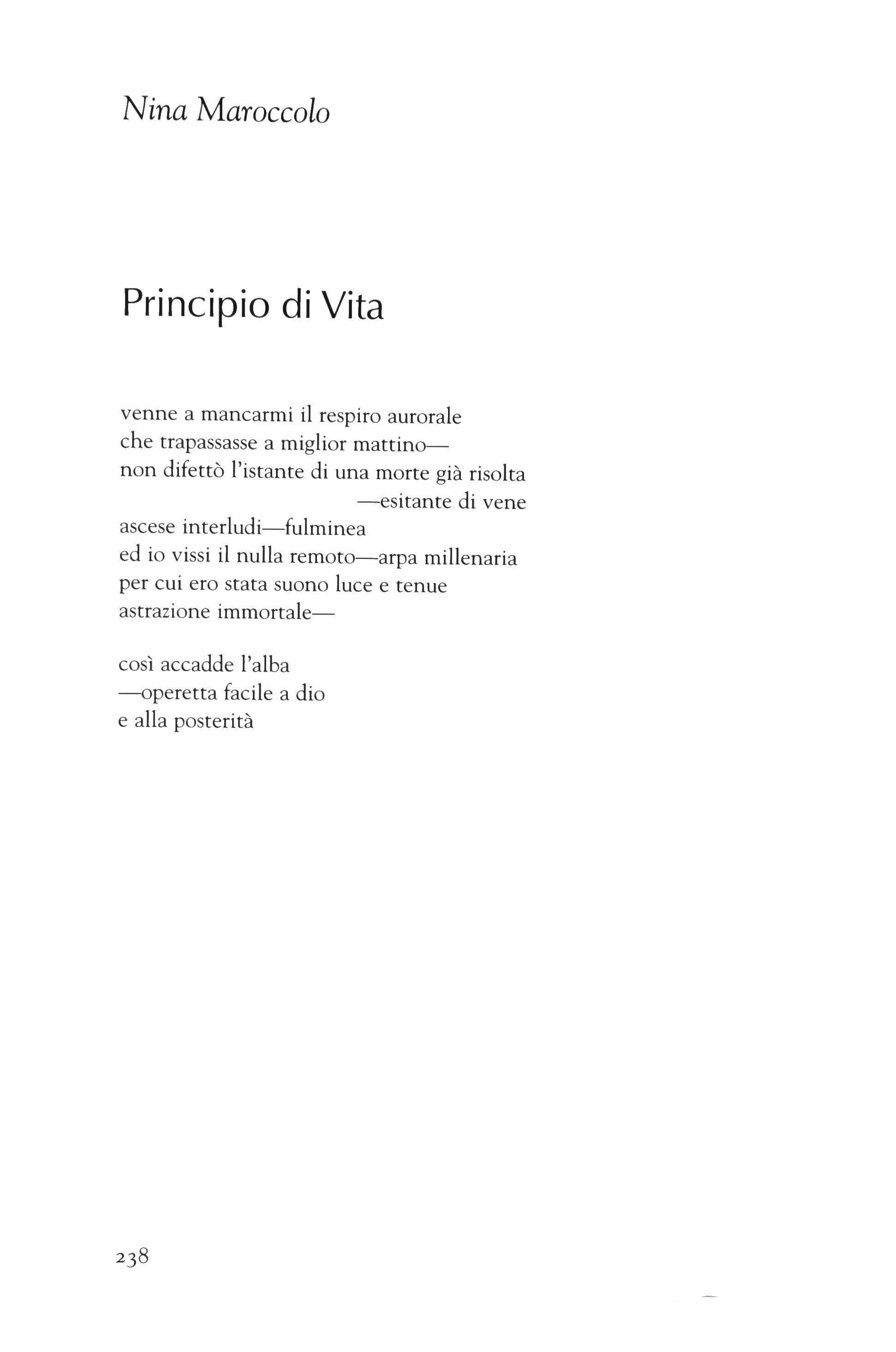
Principio di Vita
venne a mancarrni il respire aurorale che trapassasse a miglior mattinonon difetto l'istante di una morte gia risolta -esitante di vene ascese interludi-fulminea ed io vissi it nulla remoto-arpa millenaria per cui ero stata suono luce e tenue astrazione immortale-
COSt accadde l'alba --operetta facile a dio e alla posterita
Principle of Life

the auroral breath, which sweeps through the best of mornings, ran out on mebut that instant of a long-accepted death didn't fail -a vein of hesitation climbing interludes-lightning-quick and i lived the remote nothing-millennial harp which turned me into sound, light, and tenuous immortal abstractionthus came the dawn -a small deed, easy for god and for posterity
239
Maria Castronovo
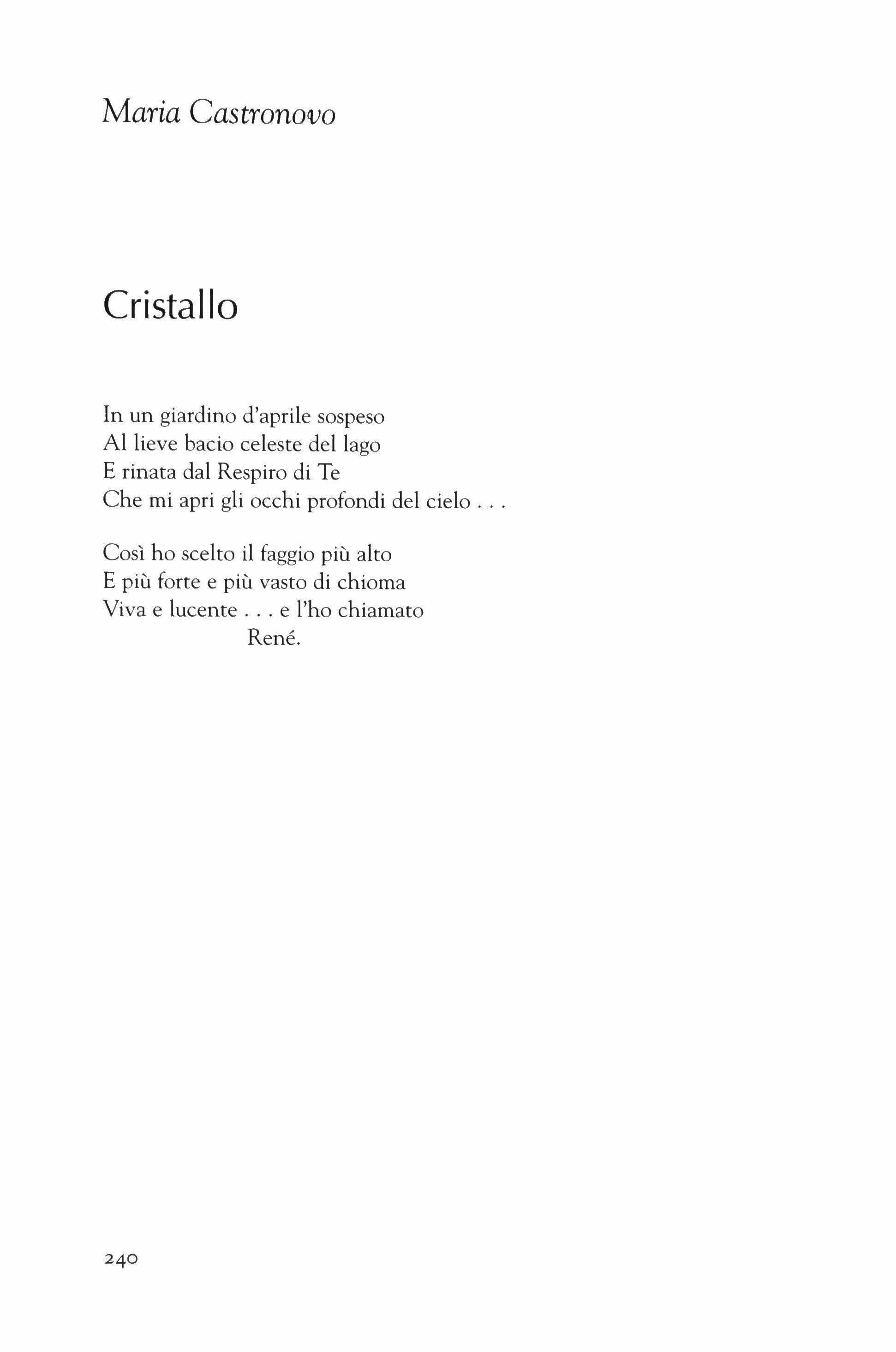
Cristallo
In un giardino d'aprile sospeso
Al lieve bacio celeste del lago
E rinata dal Respiro di Te
Che mi apri gli occhi profondi del cielo
COSt ho scelto il faggio pili alto
E pili forte e pili vasto di chioma
Viva e lucente e l'ho chiamato Rene.
Crystal

In an April garden hanging
On the gentle, blue kiss of the lake
I am reborn by the Breath of You
That opens heaven's deep eyes to me
So I chose the tallest and strongest beech:
The one with the biggest crown
Alive and brilliant and I named it Rene.
CONTRIBUTORS
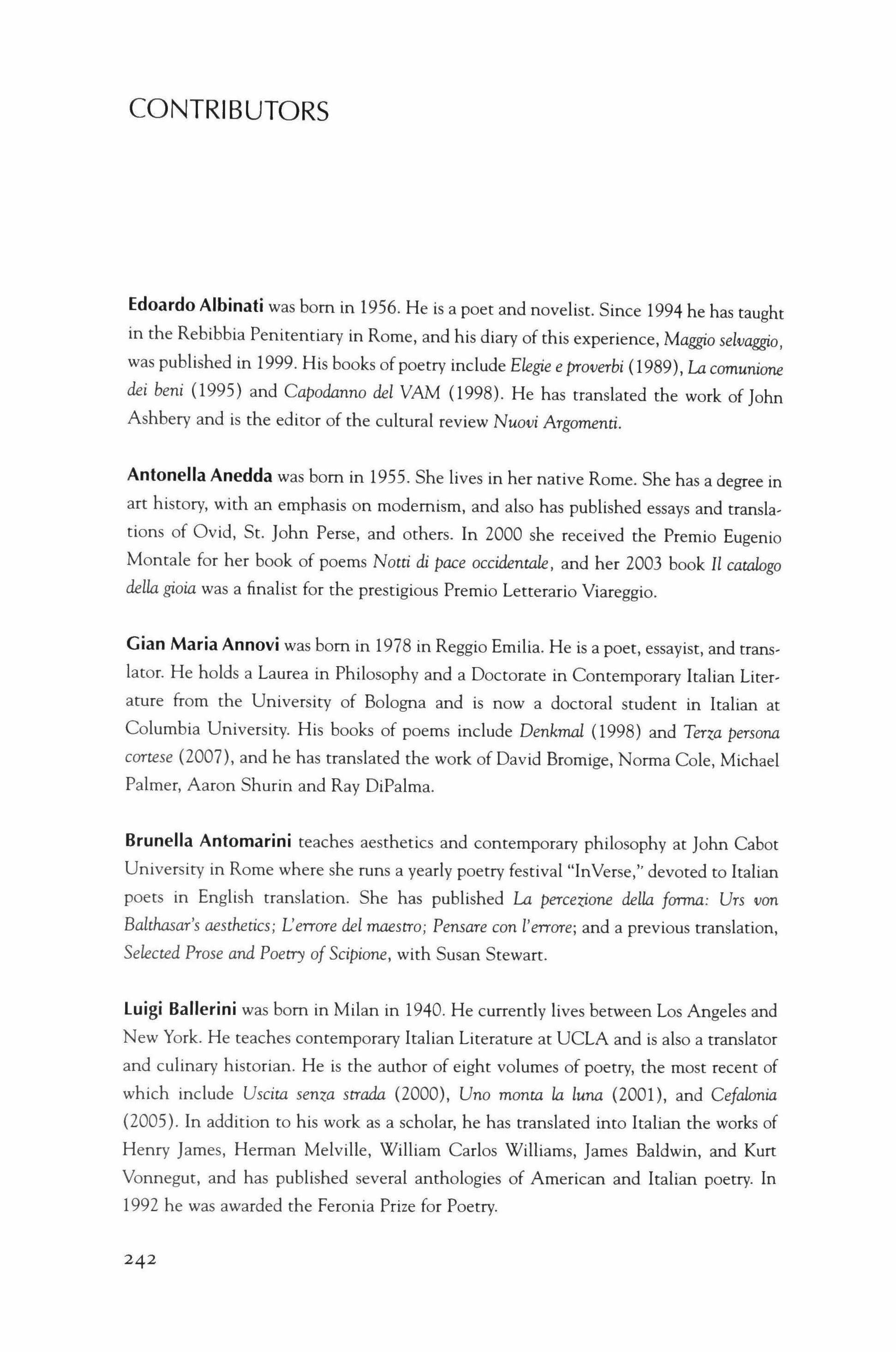
Edoardo Albinati was born in 1956. He is a poet and novelist. Since 1994 he has taught in the Rebibbia Penitentiary in Rome, and his diary of this experience, Maggio selvaggio, was published in 1999. His books of poetry include Elegie e proverbi (1989), La comunione dei beni (1995) and Capodanno del VAM (1998). He has translated the work of John Ashbery and is the editor of the cultural review Nuovi Argomenti.
Antonella Anedda was born in 1955. She lives in her native Rome. She has a degree in art history, with an emphasis on modernism, and also has published essays and translations of Ovid, St. John Perse, and others. In 2000 she received the Premio Eugenio Montale for her book of poems Notti di pace occidentale, and her 2003 book II catalogo della gioia was a finalist for the prestigious Premio Letterario Viareggio.
Cian Maria Annovi was born in 1978 in Reggio Emilia. He is a poet, essayist, and translator. He holds a Laurea in Philosophy and a Doctorate in Contemporary Italian Literature from the University of Bologna and is now a doctoral student in Italian at Columbia University. His books of poems include Denkmal (1998) and Terza persona cortese (2007), and he has translated the work of David Bromige, Norma Cole, Michael Palmer, Aaron Shurin and Ray DiPalma.
Brunella Antomarini teaches aesthetics and contemporary philosophy at John Cabot University in Rome where she runs a yearly poetry festival "InVerse," devoted to Italian poets in English translation. She has published La percezione della forma: Urs von Balthasar's aesthetics; L'errore del maestro; Pensare con l'errore; and a previous translation, Selected Prose and Poetry ofScipione, with Susan Stewart.
Luigi Ballerini was born in Milan in 1940. He currently lives between Los Angeles and New York. He teaches contemporary Italian Literature at UCLA and is also a translator and culinary historian. He is the author of eight volumes of poetry, the most recent of which include Uscita senza strada (2000), Uno monta la luna (2001), and Cefalonia (2005). In addition to his work as a scholar, he has translated into Italian the works of Henry James, Herman Melville, William Carlos Williams, James Baldwin, and Kurt Vonnegut, and has published several anthologies of American and Italian poetry. In 1992 he was awarded the Feronia Prize for Poetry.
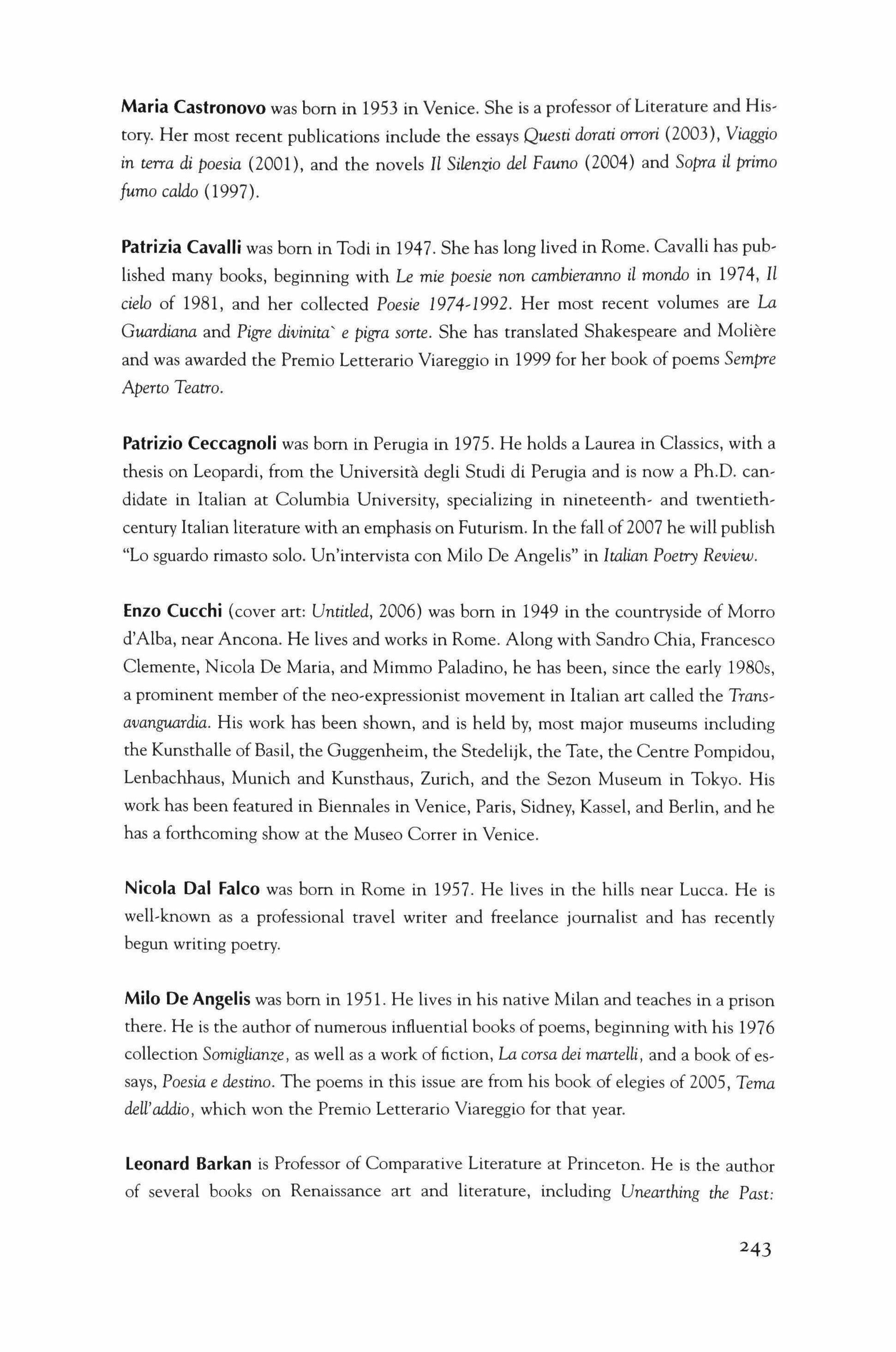
Maria Castronovo was born in 1953 in Venice. She is a professor of Literature and History. Her most recent publications include the essays Questi dorati orrori (2003), Viaggio in terra di poesia (2001), and the novels II Silenzio del Fauno (2004) and Sopta il primo fumo caldo (1997).
Patrizia Cavalli was born in Todi in 1947. She has long lived in Rome. Cavalli has published many books, beginning with Le mie poesie non cambieranno il mondo in 1974, II cielo of 1981, and her collected Poesie 1974-1992. Her most recent volumes are La Guardiana and Pigre divinita' e pigra sorte. She has translated Shakespeare and Moliere and was awarded the Premio Letterario Viareggio in 1999 for her book of poems Sempre Aperto Teatro.
Patrizio Ceccagnoli was born in Perugia in 1975. He holds a Laurea in Classics, with a thesis on Leopardi, from the Universita degli Studi di Perugia and is now a Ph.D. candidate in Italian at Columbia University, specializing in nineteenth- and twentiethcentury Italian literature with an emphasis on Futurism. In the fall of2007 he will publish "Lo sguardo rimasto solo. Un'intervista con Milo De Angelis" in Italian Poetry Review.
Enzo Cucchi (cover art: Untitled, 2006) was born in 1949 in the countryside of Morro d'Alba, near Ancona. He lives and works in Rome. Along with Sandro Chia, Francesco Clemente, Nicola De Maria, and Mimmo Paladino, he has been, since the early 1980s, a prominent member of the neo-expressionist movement in Italian art called the Transavanguardia. His work has been shown, and is held by, most major museums including the Kunsthalle of Basil, the Guggenheim, the Stedelijk, the Tate, the Centre Pornpidou, Lenbachhaus, Munich and Kunsthaus, Zurich, and the Sezon Museum in Tokyo. His work has been featured in Biennales in Venice, Paris, Sidney, Kassel, and Berlin, and he has a forthcoming show at the Museo Correr in Venice.
Nicola Dal Falco was born in Rome in 1957. He lives in the hills near Lucca. He is well-known as a professional travel writer and freelance journalist and has recently begun writing poetry.
Milo De Angelis was born in 1951. He lives in his native Milan and teaches in a prison there. He is the author of numerous influential books of poems, beginning with his 1976 collection Somiglianze, as well as a work of fiction, La corsa dei martelli, and a book of essays, Poesia e destino. The poems in this issue are from his book of elegies of 2005, Tema dell'addio, which won the Premio Letterario Viareggio for that year.
Leonard Barkan is Professor of Comparative Literature at Princeton. He is the author of several books on Renaissance art and literature, including Unearthing the Past:
243

Archaeology and Aesthetics in the Making of Renaissance Culture. His most recent work is a memoir entitled Satyr Square: A Year, a Life in Rome. He has been an actor and a director, and he is a long-time contributor to the Italian food and wine magazine, Gambero Rosso.
Alba Donati was born near Lucca, in Lucignana, in 1960. She lives in both her birthplace and Firenze, Her first book, La repubblica contadina, won both the Premio "Opera Prima" in 1998 and the Premio Sibilla Aleramo in 1999. Non in mio nome, 2004, also won several prizes: the Premio Citta dell'Aquila and the Premio Diego Valeri. She has also edited a volume of poems and writings against the death penalty, and published an edition of the complete poems of Maurizio Cucchi.
Fabrizio Falconi was born in 1959 in Rome, where he continues to live. He is a television journalist for Mediaset. He is the author of the collection of short stories Prima eli Andare (1983), the novels II giorno pitt bello per incontrarti (2000) and Cieli come questo (2002), the essay Il valore della Parola (1994), and the best-selling biography Bin Laden: II terrore deU'Occidente (2001, with Antonello Sette). His poetry is published in the two collections L'ombra del ritorno (1996) and Sub specie aeternitatis (2004).
Paolo Frigerio was born in Colnago, near Milan, in 1972. He is a musician, composer, and poet and has published three collections of poetry, Due voltefiamma, II rosso disperso, and Orchestra senz'aria. The long-poem Poema dei tre corpi, based on his study of the Veda, the Upanishad, and Hinduism, will be published shortly.
Roberto Cigliucci was born in 1962. He lives in Rome, where he teaches at the University ofRome, La Sapienza. Gigliucci has published his poems in II Caffe illustrato, Letteratura, Capoverso, and other journals. He is also the author of a novel, Finche siamo giovani, and numerous works of literary criticism, including his recent study, Realismo metafisico e Montale. A graduate of the Centro Sperimentale di Cinematografia, he has produced documentaries on subterranean Rome and on Cezanne.
Robert Pogue Harrison was born in Izmir, Turkey in 1954. He is the Rosina Pierotti Professor in Italian Literature at Stanford University, where he has taught since 1985. He holds a Ph.D. in Romance Studies from Cornell University and has published extensively on Dante, Vico, and Italian poetry, among other subjects. Professor Harrison's books are The Body of Beatrice (Baltimore, 1988), Forests: The Shadow of Civilization (Chicago, 1992), Rome, la pluie: a quai bon la uueraturet (Paris, 1994), and The Dominion of the Dead (Chicago, 2003). In 2005-2006, he hosted a radio talk show, Entitled Opinions (about Life and Literature), on the Stanford public radio station, KZSU 90.1. He is currently finishing a book project on the philosophy of gardens.
244

Chris King lives in St. Louis, where he edits the St. Louis American and directs Poetry Scores, an arts group that translates poetry into other media. He's now composing a musical score for "The Sydney Highrise Variations," by Les Murray and directing a silent film to the score he produced for "Blind Cat Black" by the Turkish poet Ece Ayhan.
Rosaria Lo Russo was born in 1964. She lives in her native Firenze, where she teaches and writes on poetry and drama and also works as an actress and performer. The poems in this issue are from her recent book, Lo Dittatore Amore. She has translated Donne, Plath, and a three-volume edition of the work of Anne Sexton.
David Lummus was born in Texas. He is a Ph.D. candidate in Italian Studies at Stanford University, where he is currently completing his dissertation on Giovanni Boccaccio's Genealogie Deorum Gentilium. He has translated Pietro Zullino's novel Cynthia with her eyes, a selection of which appeared in TriQuarterly, and has written on Boccaccio, Italian philology, and Valerio Magrelli.
Valerio Magrelli was born in 1957 in Rome. He teaches French Literature at the Universities of Pisa and Cassino. He recently directed the poetry collection for the Italian publisher Guanda and the trilingual series of the collection "Scrittori tradotti da scrittori" for Einaudi. In addition to his scholarly work on French poetry, he has translated Valery, Mallarme, and Verlaine. He regularly writes for the cultural pages of Italian newspapers and journals, including Il Messaggero, L'Uniw, Diorio, and Avvenire. His works, which have been translated into English, French, and Spanish, include the novel Nel condominio della came (2003) and the volumes of poetry Ora serrata retinae (1980), Nature e venature (1987), Esercizi di tiptologia, (1992), Didascalie per la lettura di un giornale (1999), and the recent Disturbi del sistema binario (2006). He has won the Premio Mondello, 1980, the Premio Letterario Viareggio, 1987, the Premia Librex-Montale, 1992, and the Premio "Feltrinelli" of the Accademia dei Lincei, 2003.
Lucio Mariani was born in Rome, where he still lives and works. He has published more than twelve books of poetry in his long career. Many of his lyrics have been published in France, Greece, America, Portugal, and Spain. He has translated the Carmina Priapea and the poetry of Cesar Vallejo, Tristan Corbiere, Yves Bonnefoy, and Rosanna Warren. His most recent publications include Dispersi gli alleati, Il torto della preda, Qualche notizia del tempo, Il sandalo di Empedocle, and Profondo amar profano: Pandemia e Nestor. In 2003 he won the Premio Internazionale Tarquinia-Cardarelli for Poetry.
Nina Maroccolo was born in 1966, in Massa, Tuscany. Maroccolo founded ATEM in 1998, an artistic group whose research concerns the performance of poetry. She has published Il Carro di Sonagli and her poetry has often been anthologized. Her most recent
245

book is Annelies Marie Frank: Il viaggio, which features an introductory note by AIda Merini.
Giulio Marzaioli was born in Florence in 1972. He lives in Rome and has published In re ipsa, for which he won the Premio Montano in 2005, Quadranti, and Appunti del non vero-Scritture verso il teatro. In addition to his work as a poet, his writings for the stage have appeared in many theaters. In 2002 he founded, with Romina De Novellis, the experimental theater company DENOMA.
Aida Merini was born in 1931 in Milan. She continues to live in the Naviglio district there. Her first book of poems, La presenza di Orfeo, was published in 1953 when she was part of an important circle ofpoets, including Giorgio Manganelli, Eugenio Montale, Salvatore Quasimodo, and Giovanni Raboni, who is included in this volume. In 1961 she ceased writing for twenty years when she was institutionalized for mental illness. She later wrote several prose memoirs about this period, La Terra Santa, [;altra Verita', Diario di una diversa, and Delirio amoroso. In 1985 she published La Gazza Ladra, which included new poems. After further periods of illness in the late 80's, she began publishing prolifically in the nineties. She won the Premio Librex-Montale in 1993, the Premio Letterario Viareggio in 1996, the Premio Procida-Elsa Morante in 1997, and was nominated for the Nobel Prize by the French Academy in 1996 and again in 2001 by the PEN club of Italy. The poems in this issue will appear in Susan Stewart's forthcoming translation, Selected Poems ofAlda Merini, to be published by Princeton University Press in 2008.
Gregory Pell is professor of Italian at Hofstra University. He works on modern and contemporary poetry and film. He has published articles on Luzi, Ruffilli, Rondoni, Montale and Tobino. His first book, Memorial Space, Poetic Time, deals with photographic, cinematic, and holographic images in the poetry of Montale.
Giovanni Raboni was born in Milan in 1932. He finished his studies in law in the years following World War II and began a career as a lawyer. Towards the end of the 1950s he began writing as a journalist for Quademi Piacentini, Paragone, and Corriere della Sera. In addition to his career as an intellectual and poet, he is recognized as one of the most influentialliterary critics of twentieth-century Italy and as a gifted translator. His translations include Baudelaire's Les fleurs du mal and the entirety of Proust's A Ia recherche du temps perdu. Raboni published his first poetry in 1961 in the small collections Il catalogo di questa and [;insalubritiJ. dell'aria. In the 1970s he directed the Italian publishing house Guanda, acting as a major talent scout for young Italian poets. During his long career, Raboni also wrote plays, including Alcesti 0 Ia recita dell'esilio, and short stories, collected in La fosse di Cherubino. His most recent publications are Ogni zerzo pensiero, for which he won the Premio Letterario Viareggio in 1993, Quare tristis (1998), and Barlumi di
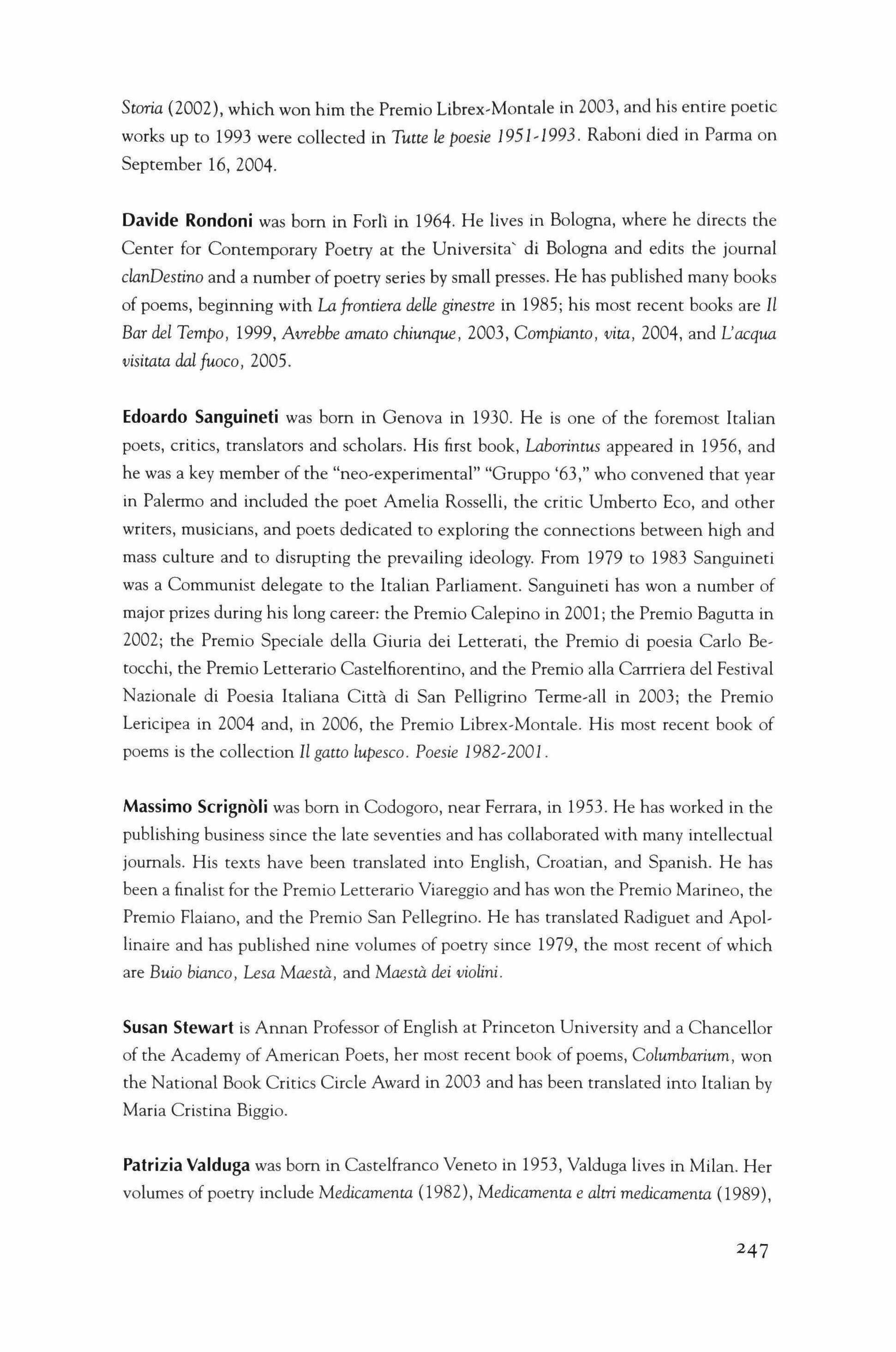
Storia (2002), which won him the Premio Librex-Montale in 2003, and his entire poetic works up to 1993 were collected in Tutte Ie poesie 1951-1993. Raboni died in Parma on September 16, 2004.
Davide Rondoni was born in Forll in 1964. He lives in Bologna, where he directs the Center for Contemporary Poetry at the Universita' di Bologna and edits the journal clanDestino and a number of poetry series by small presses. He has published many books of poems, beginning with La frontiera delle ginestre in 1985; his most recent books are Il Bar del Tempo, 1999, Avrebbe amato chiunque, 2003, Compianto, vita, 2004, and L'acqua visitata da1 fuoco, 2005.
Edoardo Sanguineti was born in Genova in 1930. He is one of the foremost Italian poets, critics, translators and scholars. His first book, Laborintus appeared in 1956, and he was a key member of the "nee-experimental" "Gruppo '63," who convened that year in Palermo and included the poet Amelia Rosselli, the critic Umberto Eco, and other writers, musicians, and poets dedicated to exploring the connections between high and mass culture and to disrupting the prevailing ideology. From 1979 to 1983 Sanguineti was a Communist delegate to the Italian Parliament. Sanguineti has won a number of major prizes during his long career: the Premio Calepino in 2001; the Premio Bagutta in 2002; the Premio Speciale della Giuria dei Letterati, the Premio di poesia Carlo Betocchi, the Premio Letterario Castelfiorentino, and the Premio alla Carrriera del Festival Nazionale di Poesia Italiana Citra di San Pelligrino Terme-all in 2003; the Premio Lericipea in 2004 and, in 2006, the Premio Librex-Montale, His most recent book of poems is the collection Il gatto lupesco. Poesie 1982-2001
Massimo Scrignoli was born in Codogoro, near Ferrara, in 1953. He has worked in the publishing business since the late seventies and has collaborated with many intellectual journals. His texts have been translated into English, Croatian, and Spanish. He has been a finalist for the Premio Letterario Viareggio and has won the Premio Marineo, the Premio Flaiano, and the Premio San Pellegrino. He has translated Radiguet and Apollinaire and has published nine volumes of poetry since 1979, the most recent of which are Buio bianco, Lesa Maesw, and Maesw dei violini.
Susan Stewart is Annan Professor of English at Princeton University and a Chancellor of the Academy of American Poets, her most recent book of poems, Columbarium, won the National Book Critics Circle Award in 2003 and has been translated into Italian by Maria Cristina Biggio.
Patrizia Valduga was born in Castelfranco Veneto in 1953, Valduga lives in Milan. Her volumes of poetry include Medicamenta (1982), Medicamenta e aItri medicamenta (1989), 247

Donna di dolori (1991), Requiem (1994), Corsia degli incurabili (1996), Cento quartine e altre storie d'amore (1997), Prima antologia (1998), Quartine: Seconda centuria (2001), Manfred (2003), and Lezione d'amore (2004). She has translated John Donne, Mallarme, Kantor, Valery, Crebillon, Moliere, Celine, and Cocteau.
Paolo Valesio was born in Bologna in 1939. He is Giuseppe Ungaretti Professor in Italian Literature at Columbia University and emeritus Professor of Italian at Yale University. He is the author of many books of criticism and fiction and fourteen collections of poetry, most recently Ogni meriggio PUG arrestare il monda, translated by Michael Palma as Every Afternoon Can Make the World Stand Still. He is the founder and editor of Yale Italian Poetry, now published as Italian Poetry Review.
Andrea Zanzotto was born in Pieve di Soligo in 1921. He is, like Sanguineti and Merini, one of the most important continuing voices of Italian modernism. In his youth during World War II, Zanzotto participated in the anti-fascist resistance and for a time emigrated to Switzerland and France. In 1951 he finally was able to publish the poems he had written between 1940 and 1948 in his first book, Dietro it paesaggio. During his remarkable career, in which he has won the Premio Letterario Viareggio,1979, the Premio Librex-Montale, 1983, and the Premio "Feltrinelli" of the Accademia dei Lincei, 1987, Zanzotto has taught at the Universities of Padua and Urbino, edited numerous journals, published criticism and prose fiction, and enjoyed long collaborations with, among others, the philosopher Ernst Bloch and the film-maker Federico Fellini.

Tran lated by Brunella
Antomarini and Su an Stewart
Tran lated by Cian Maria
Annovi and u n t art

Tran lated by Su an Stewart and Brunella Antomarini
Tran leted by Robert Pogue
Herri on end Devid l utnmus
dlumm

























































































































 Translated by Gian Maria Annovi and Susan Stewart
Translated by Gian Maria Annovi and Susan Stewart








































 per Brunella Antomarini
per Brunella Antomarini
 for Brunella Antomarini
for Brunella Antomarini
































































 Edited by Roberto Dossi
Edited by Roberto Dossi





















